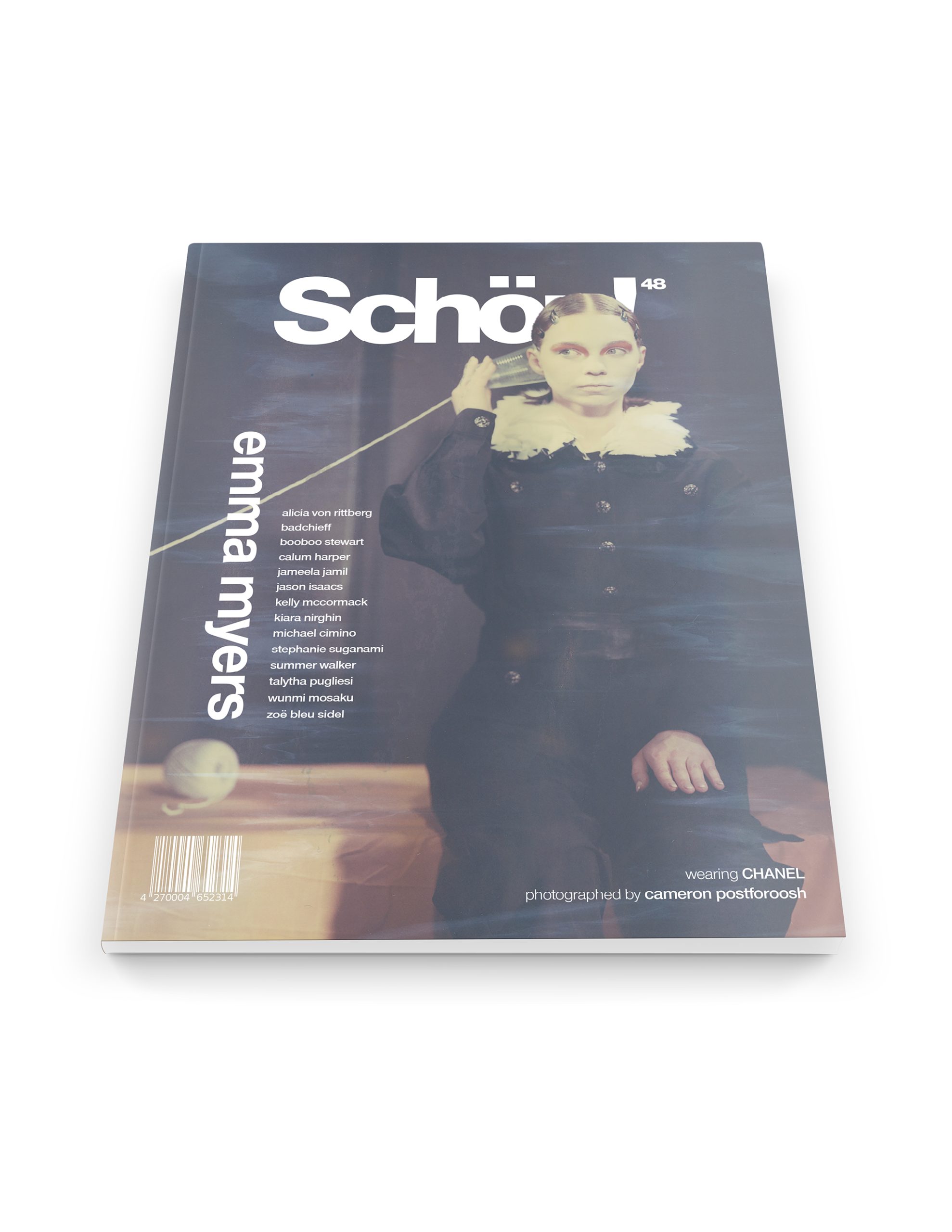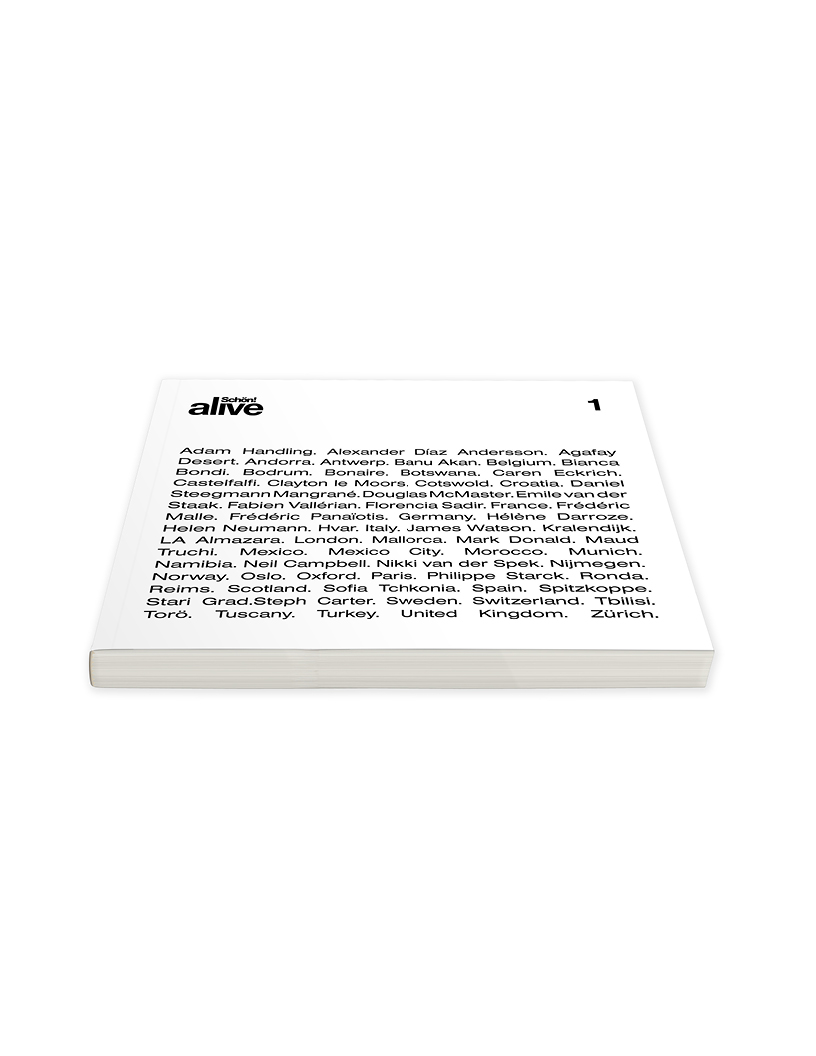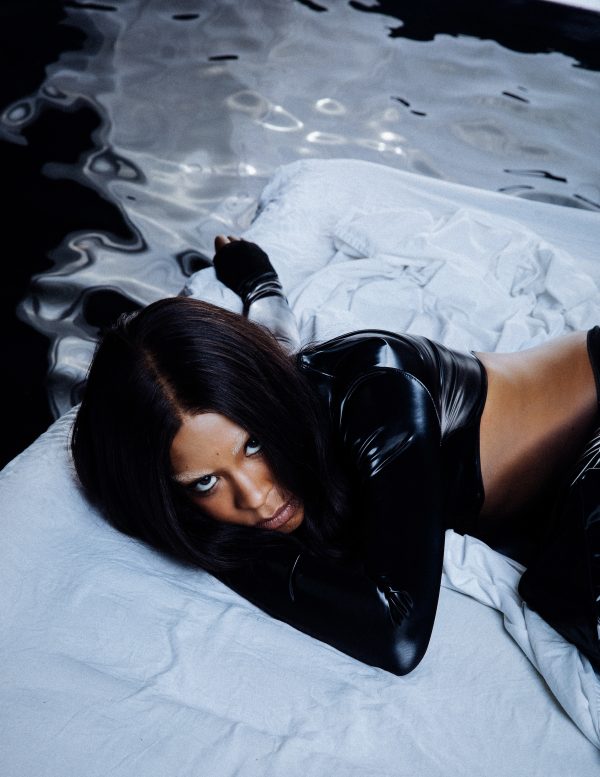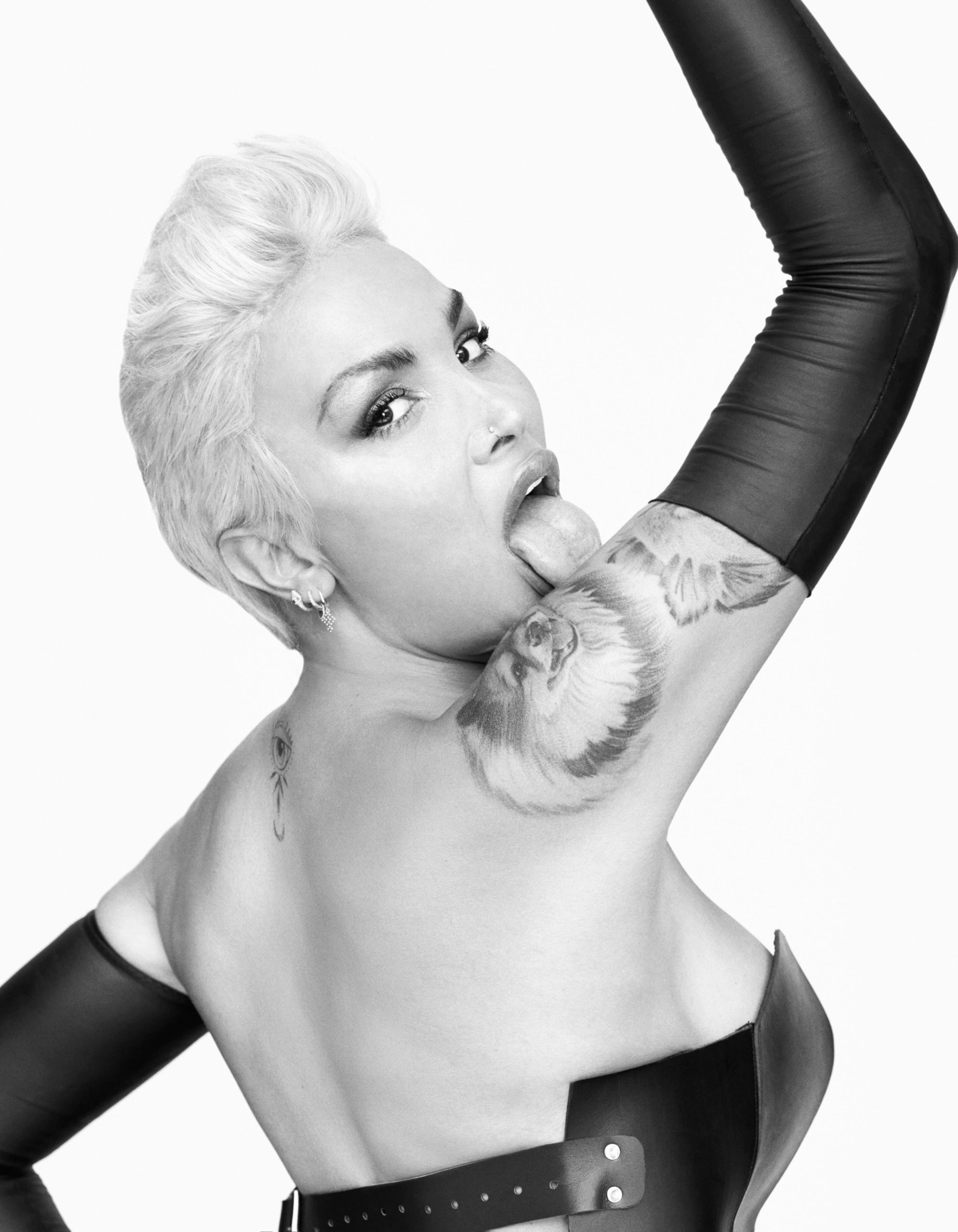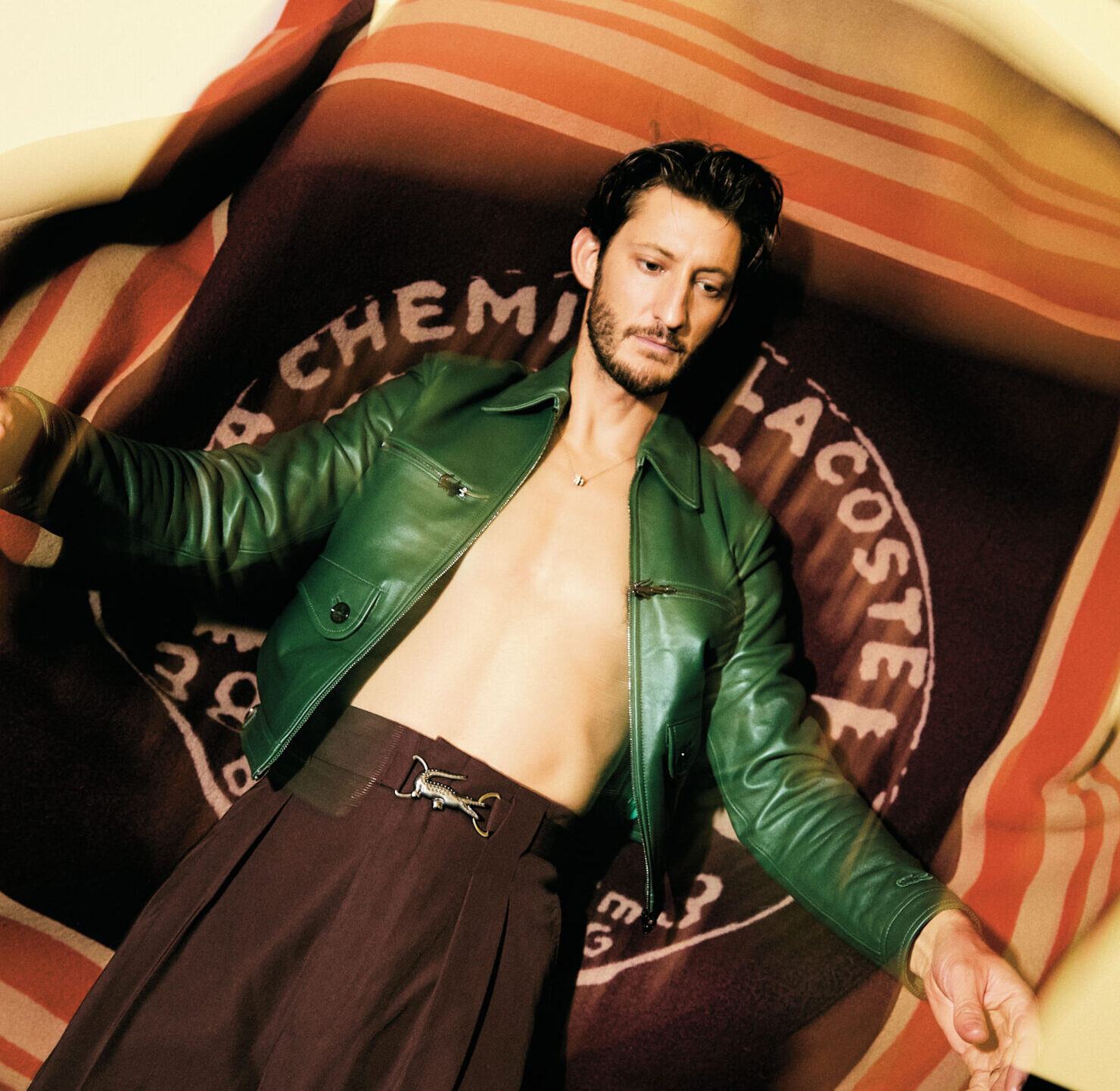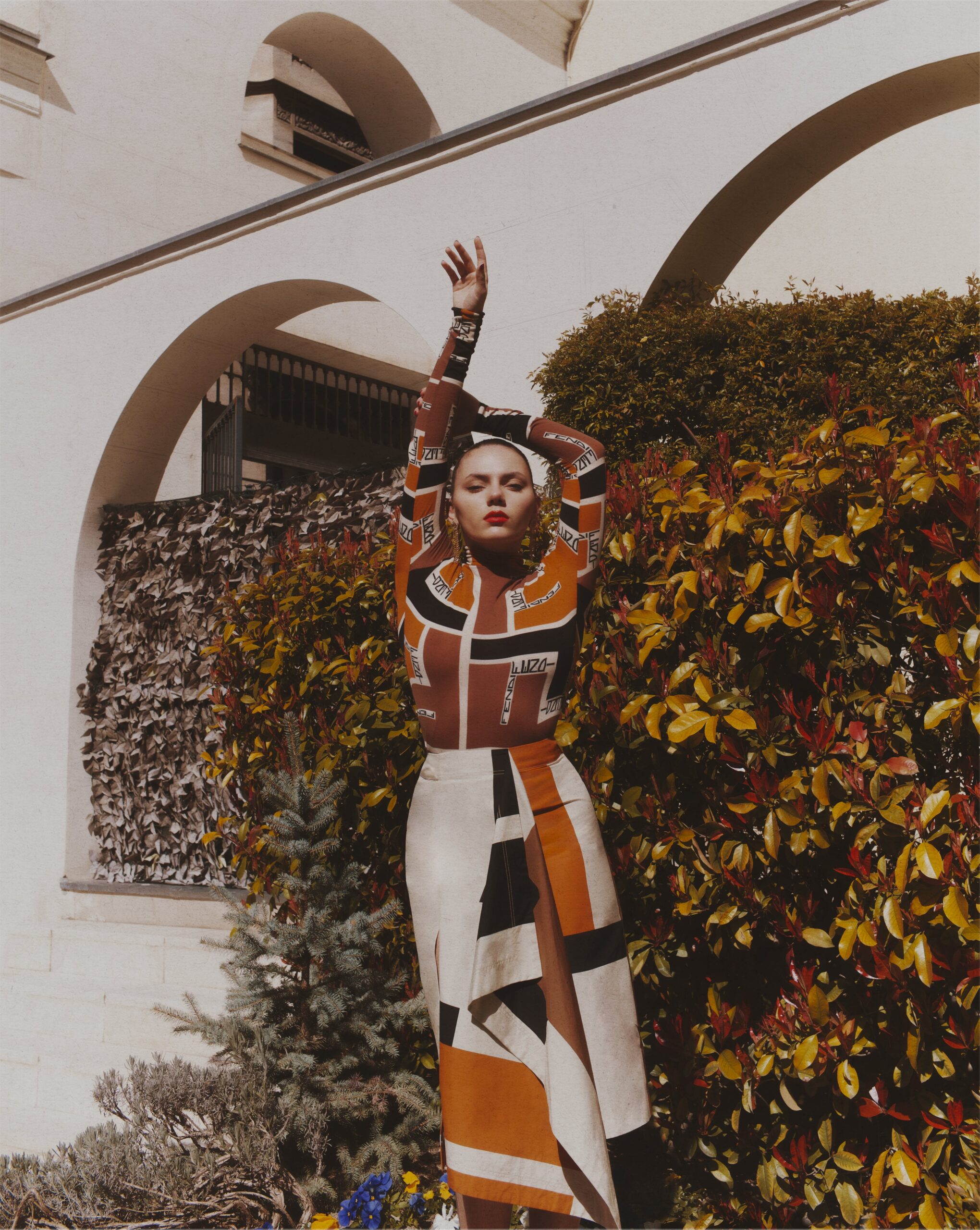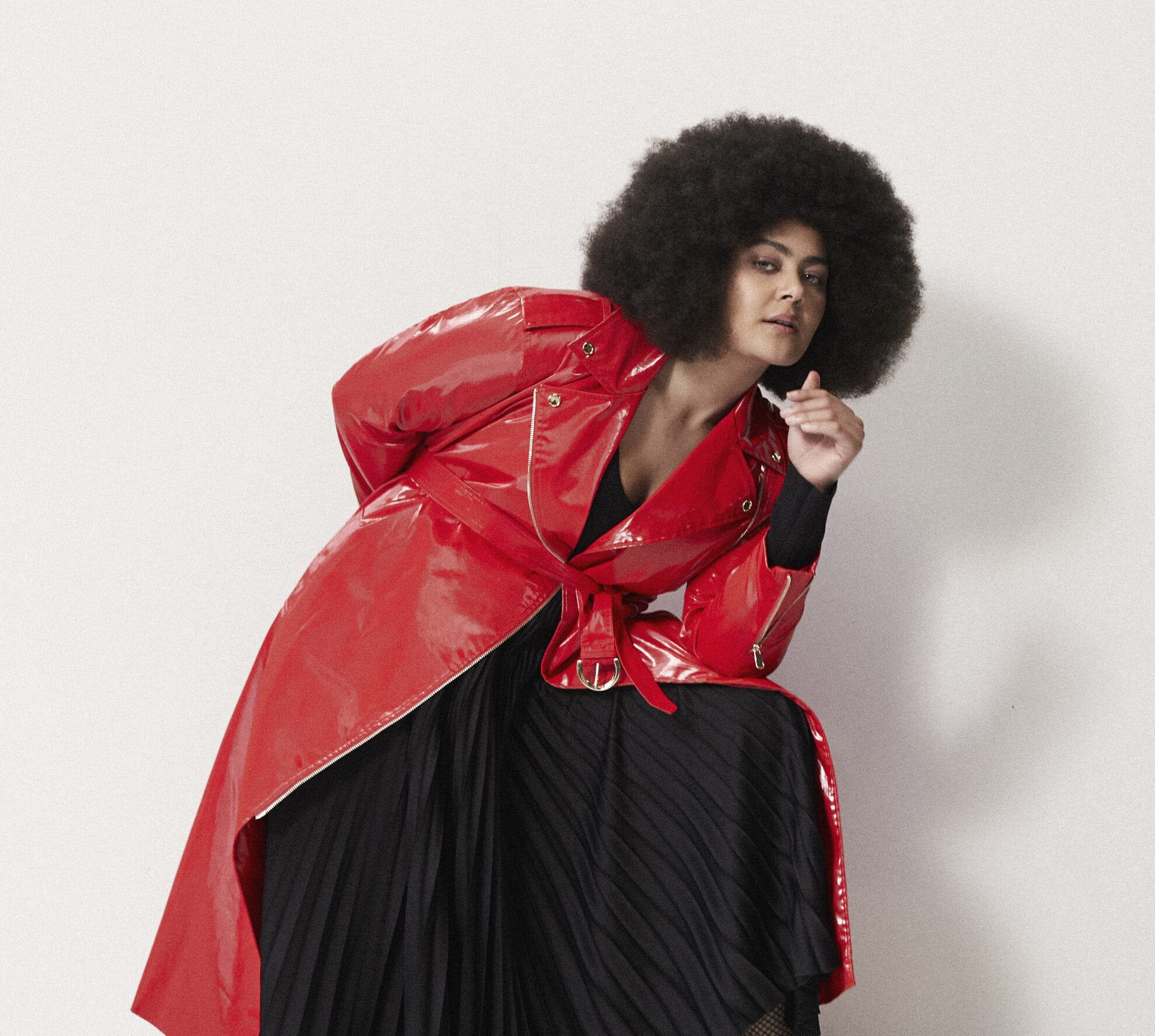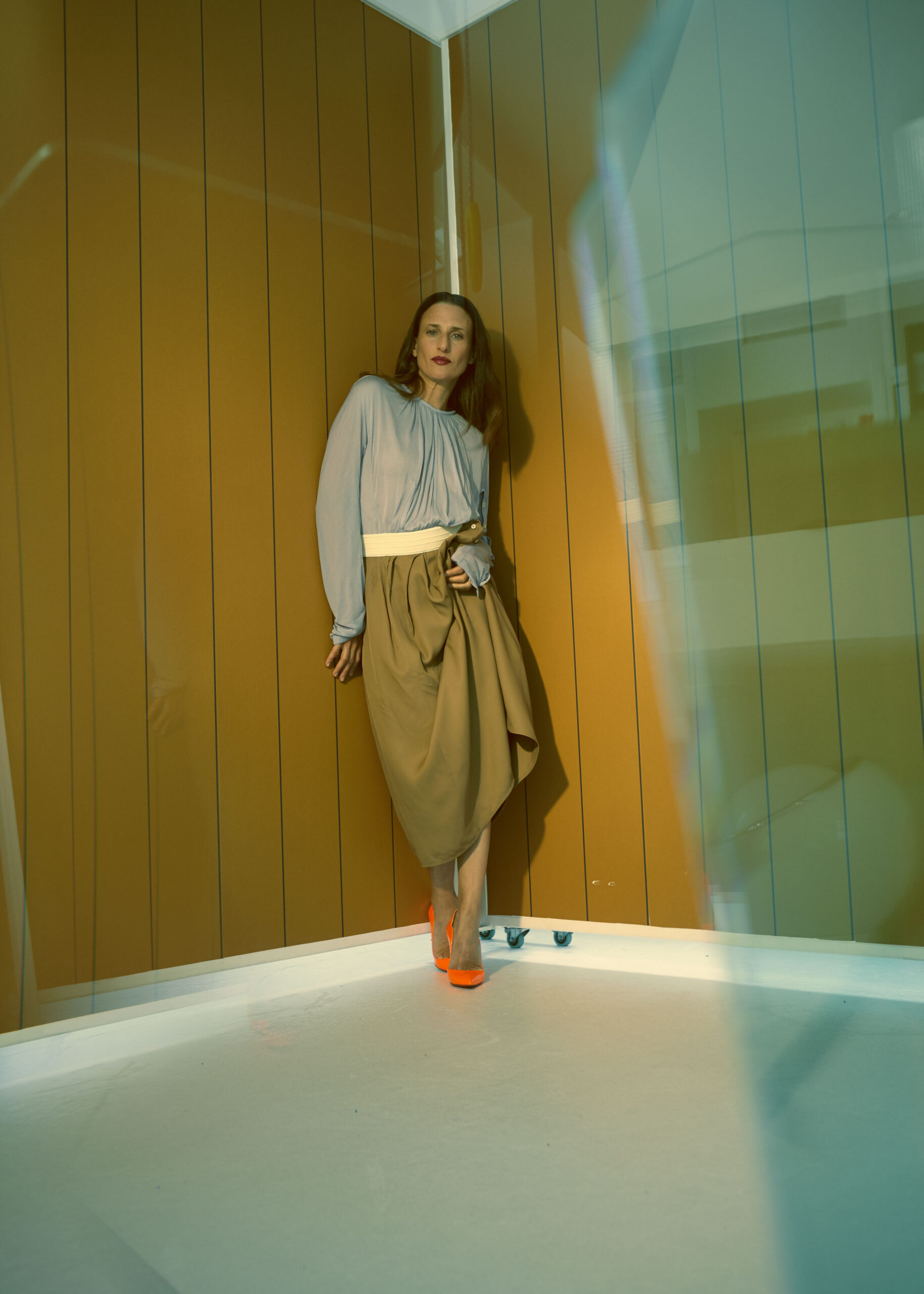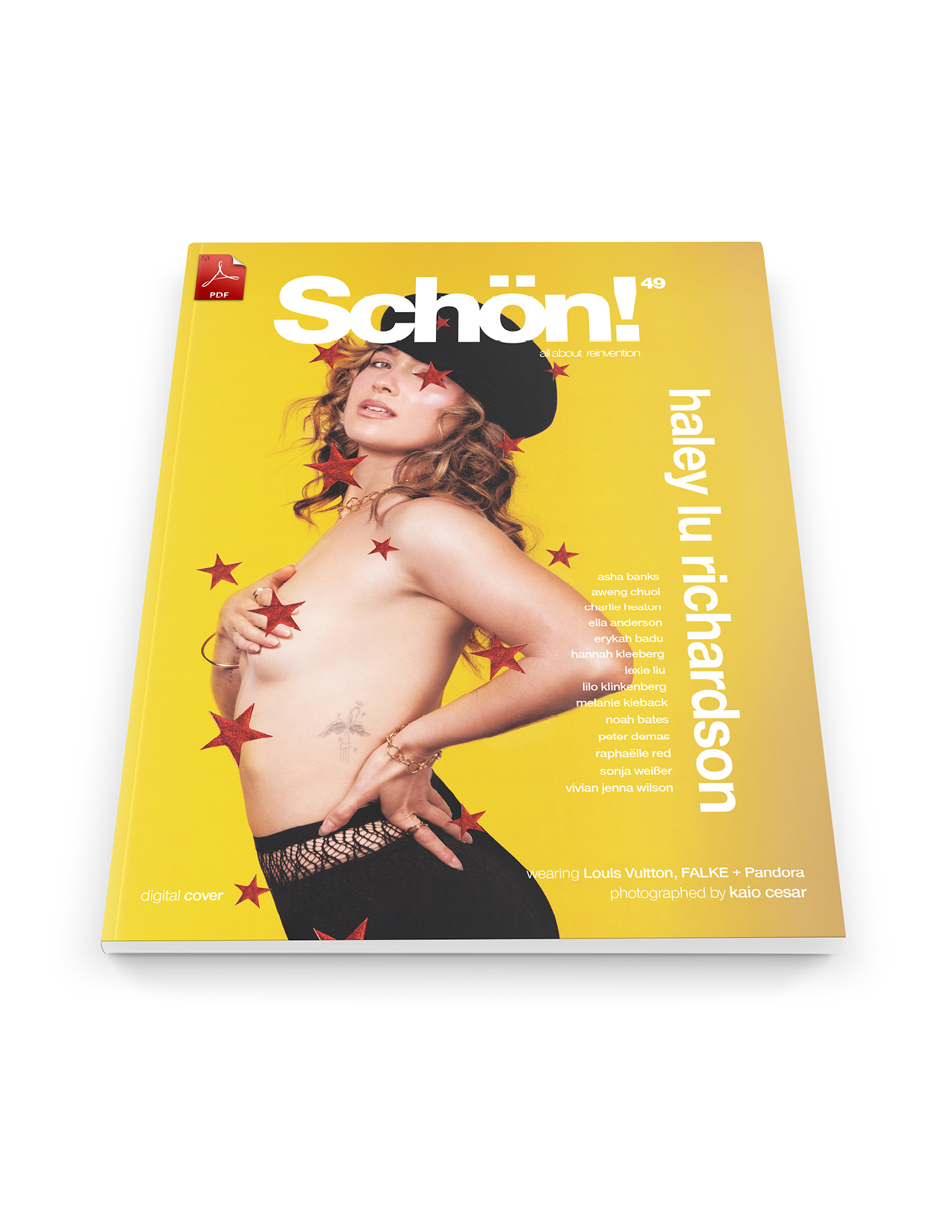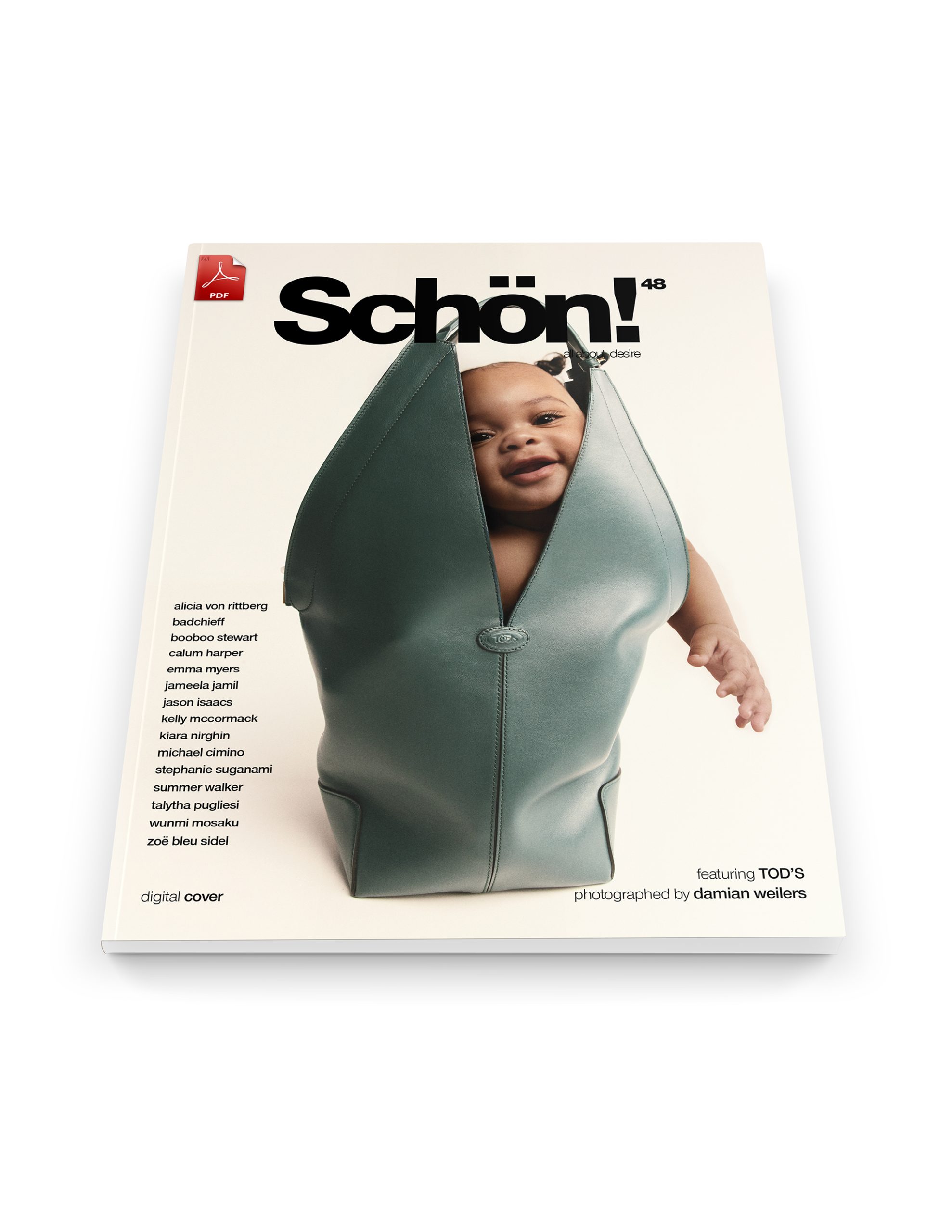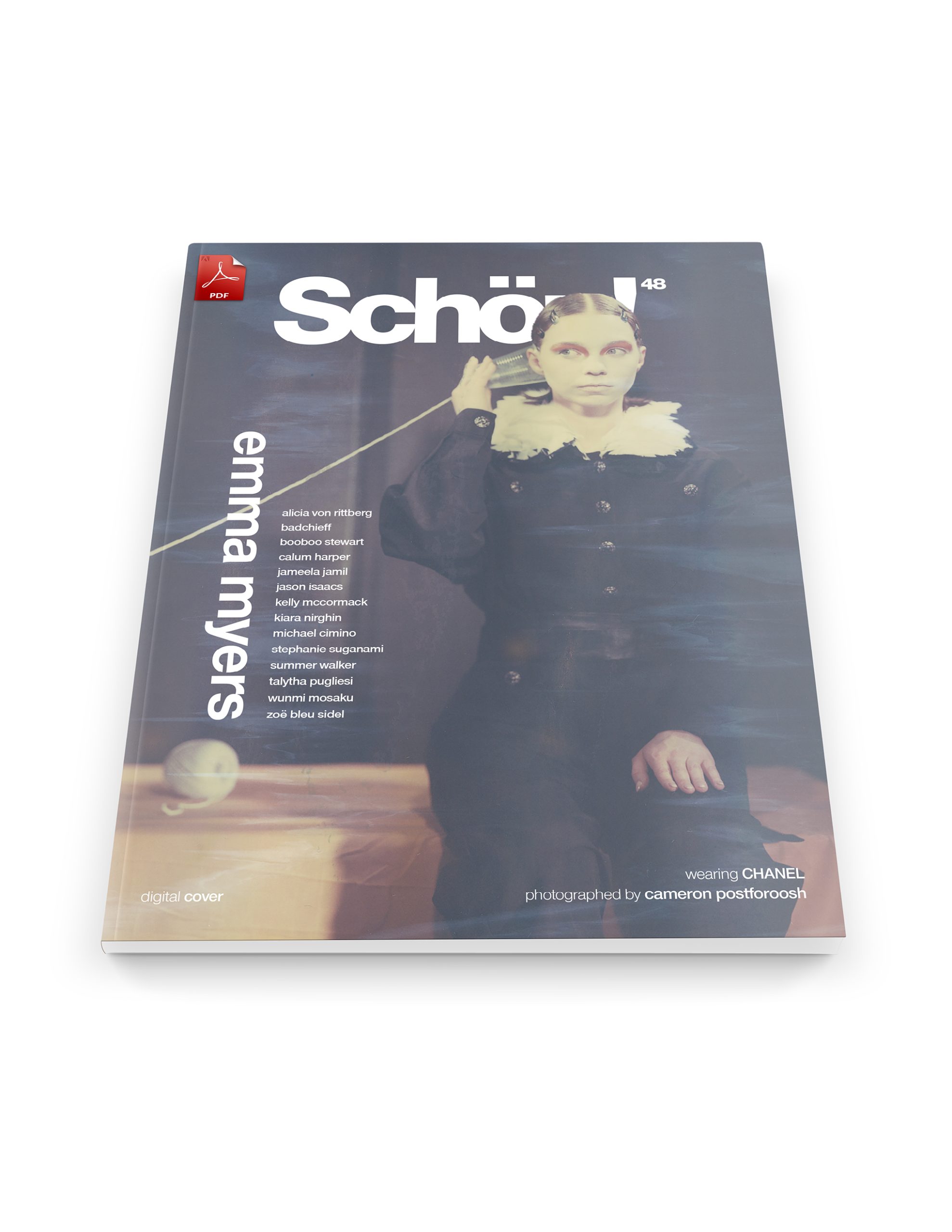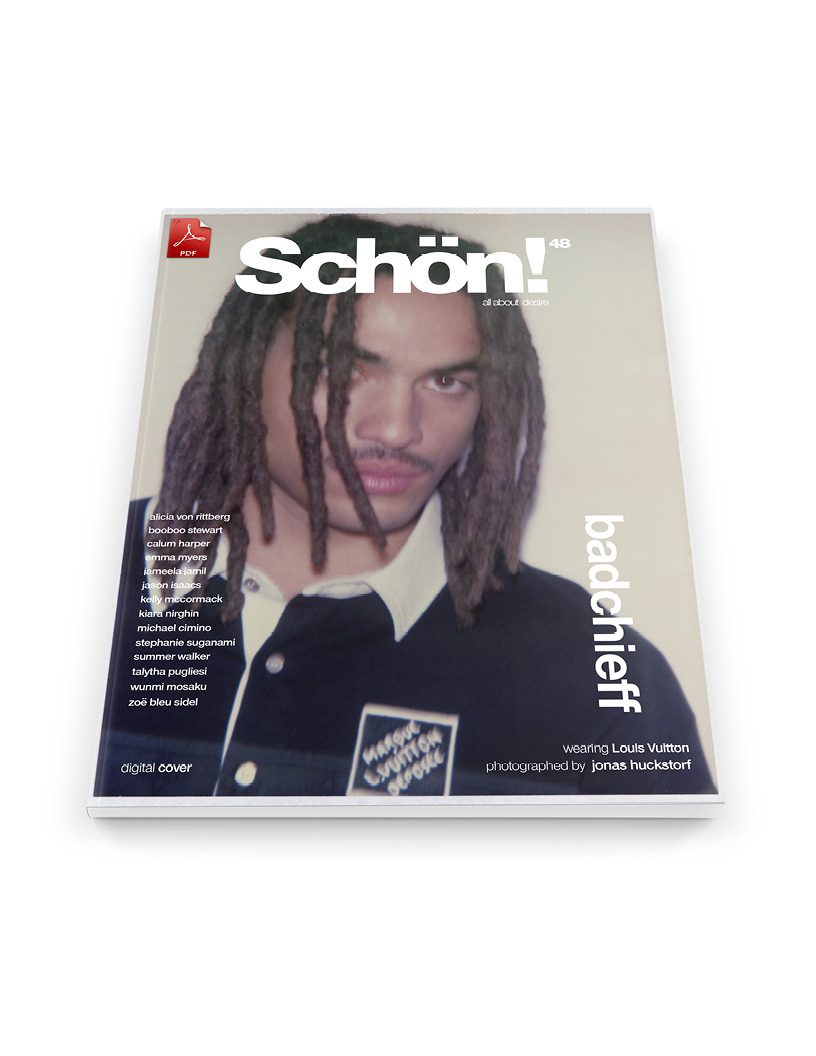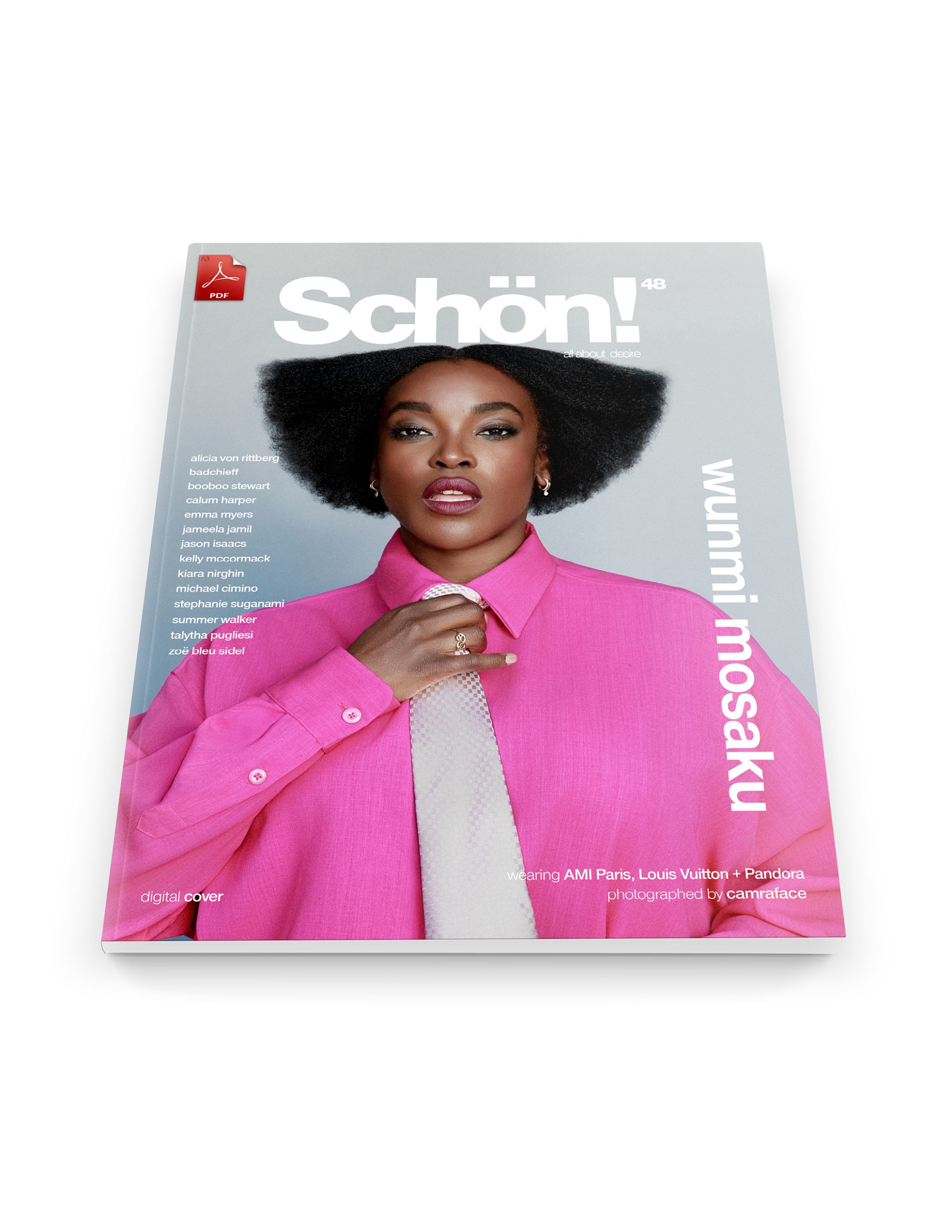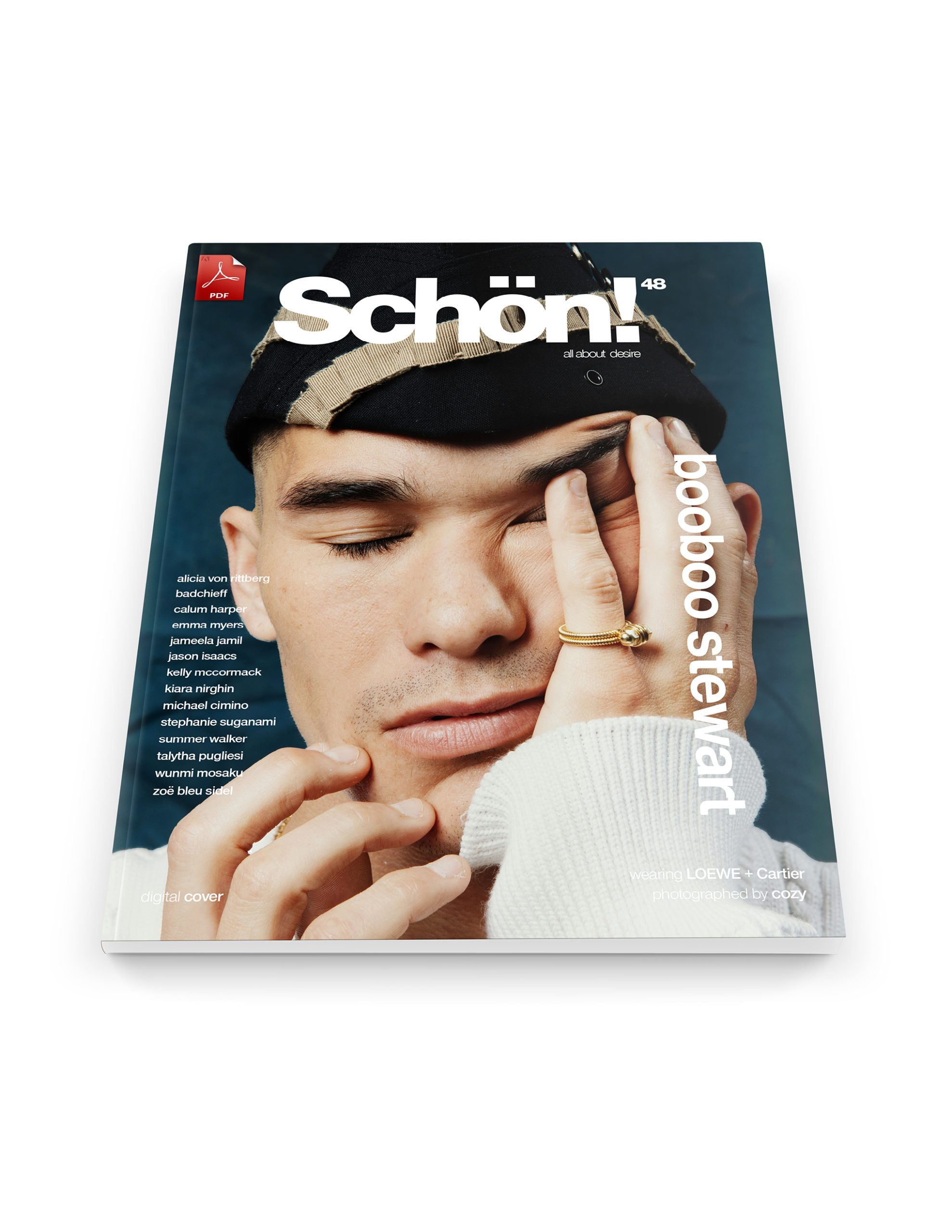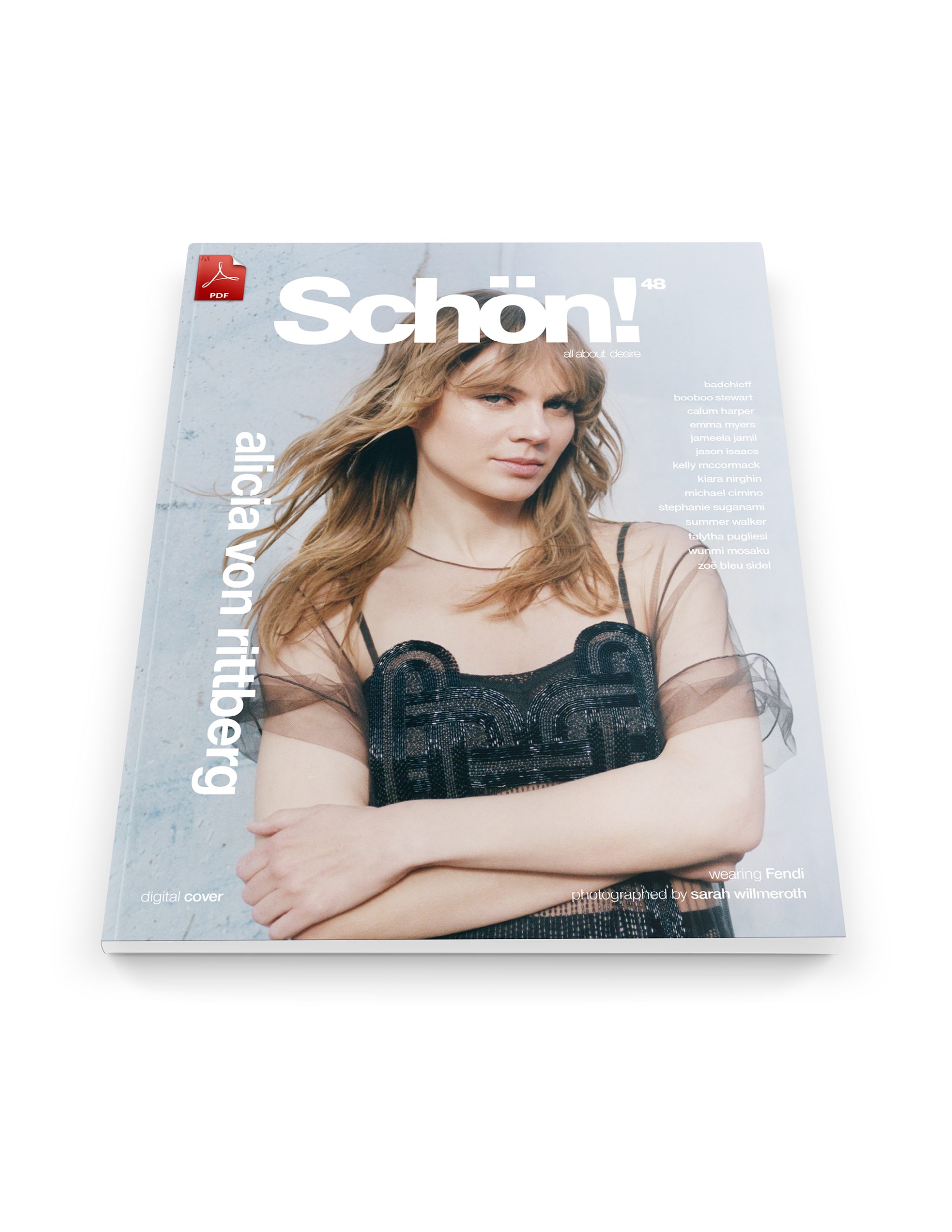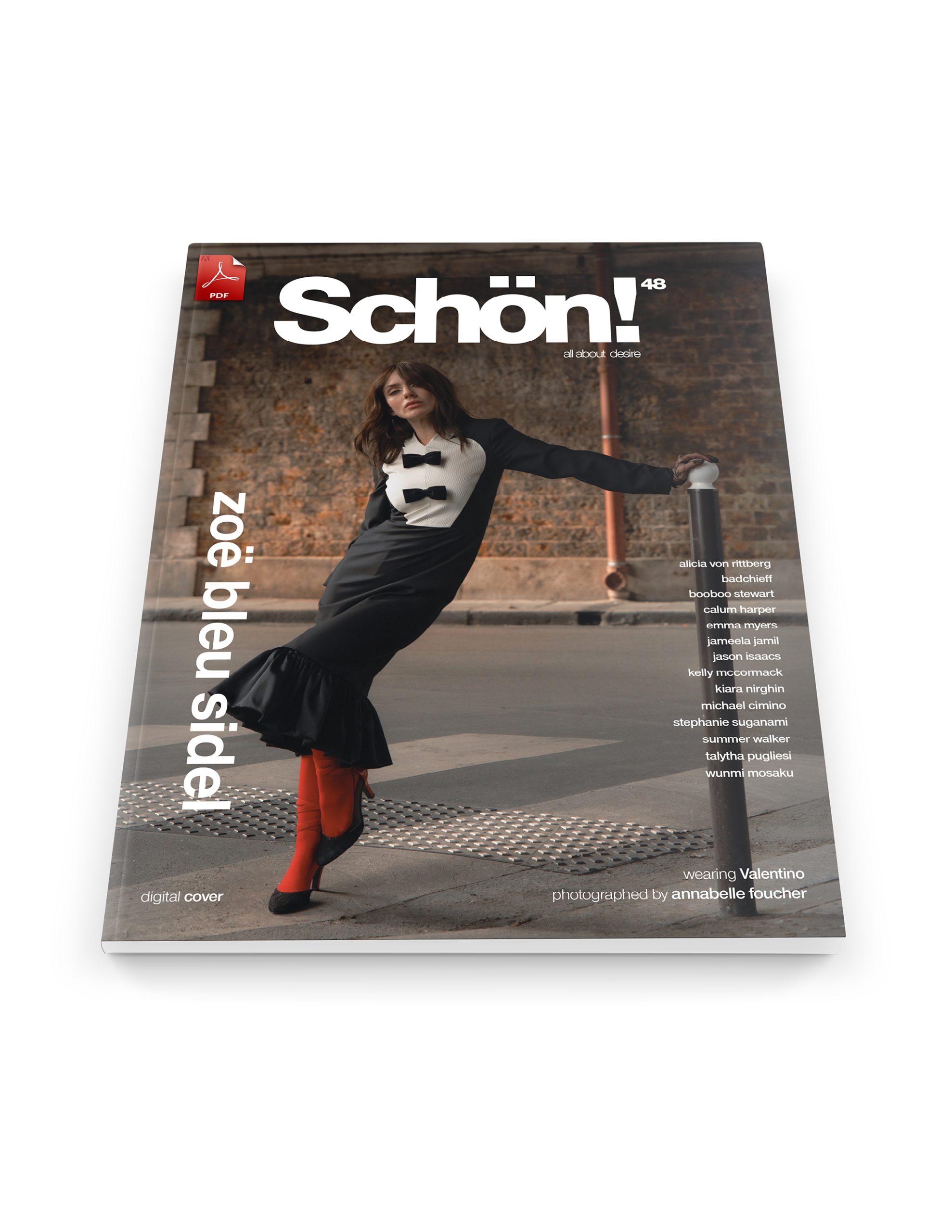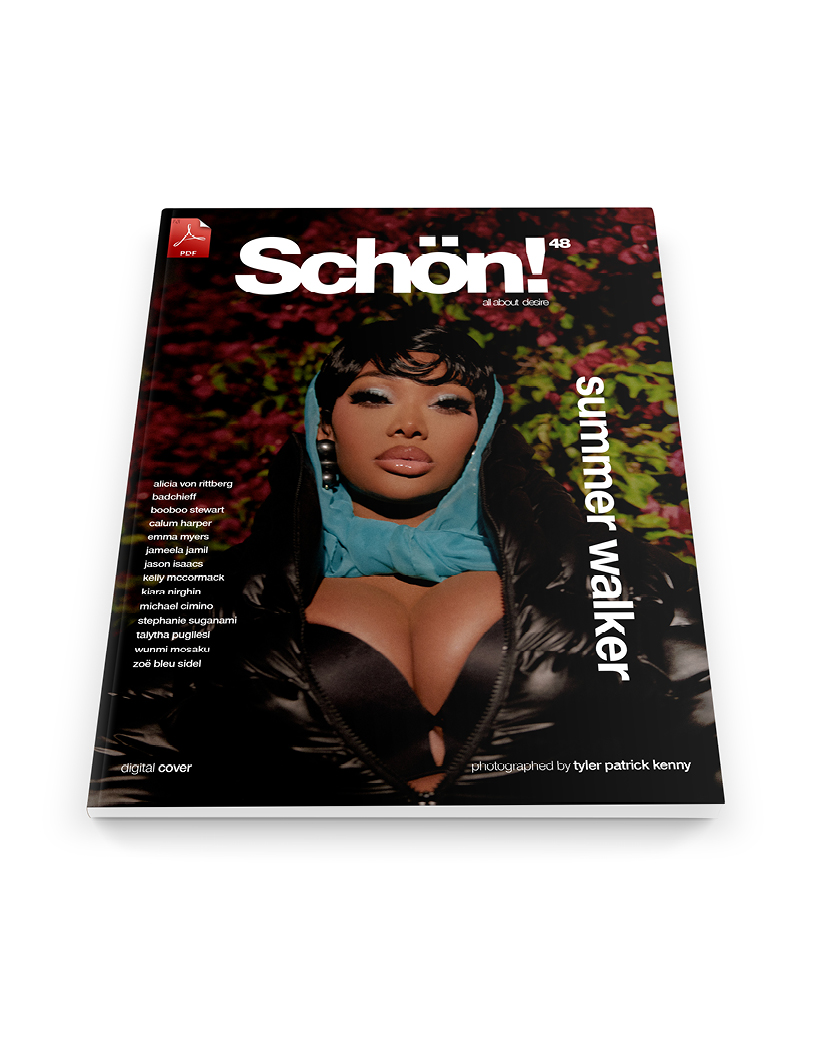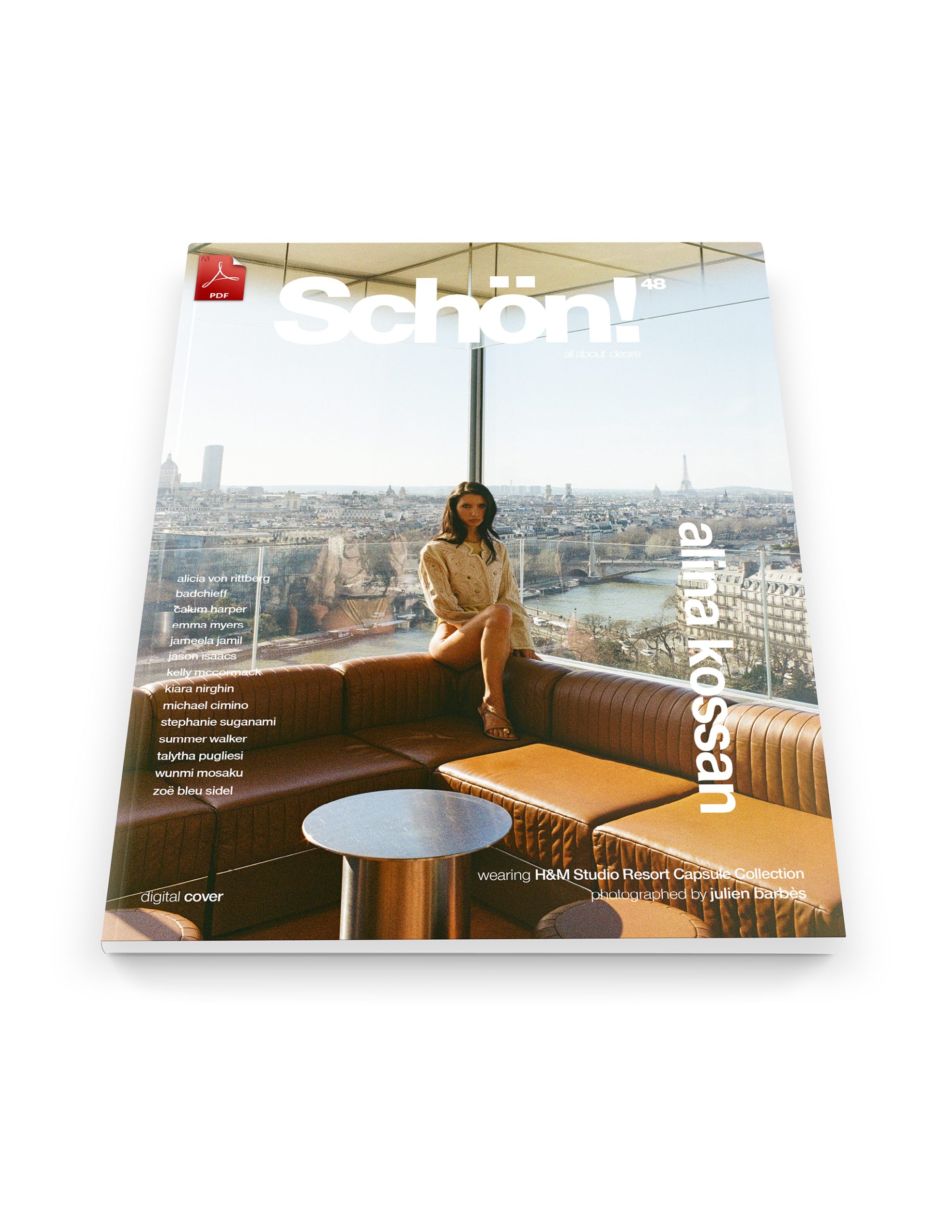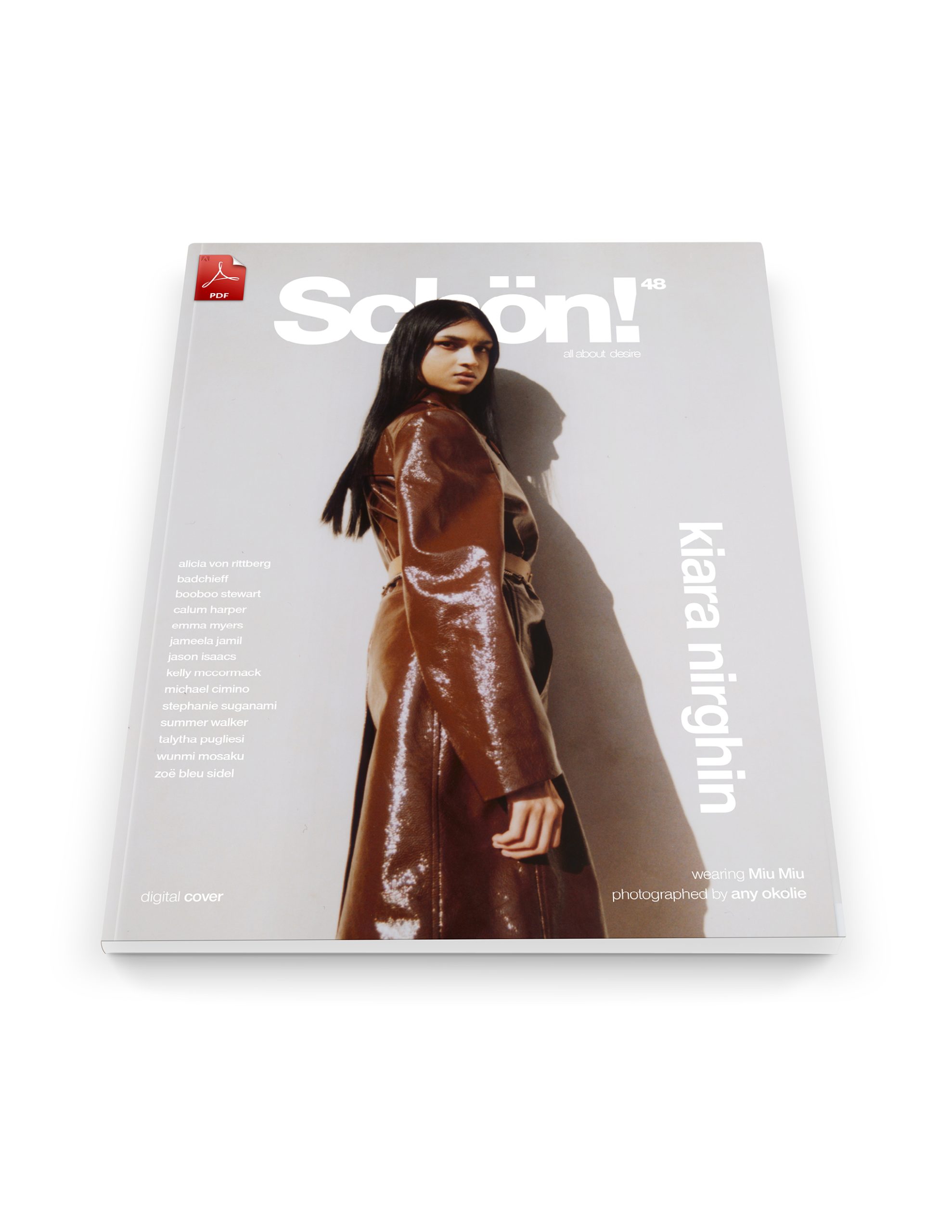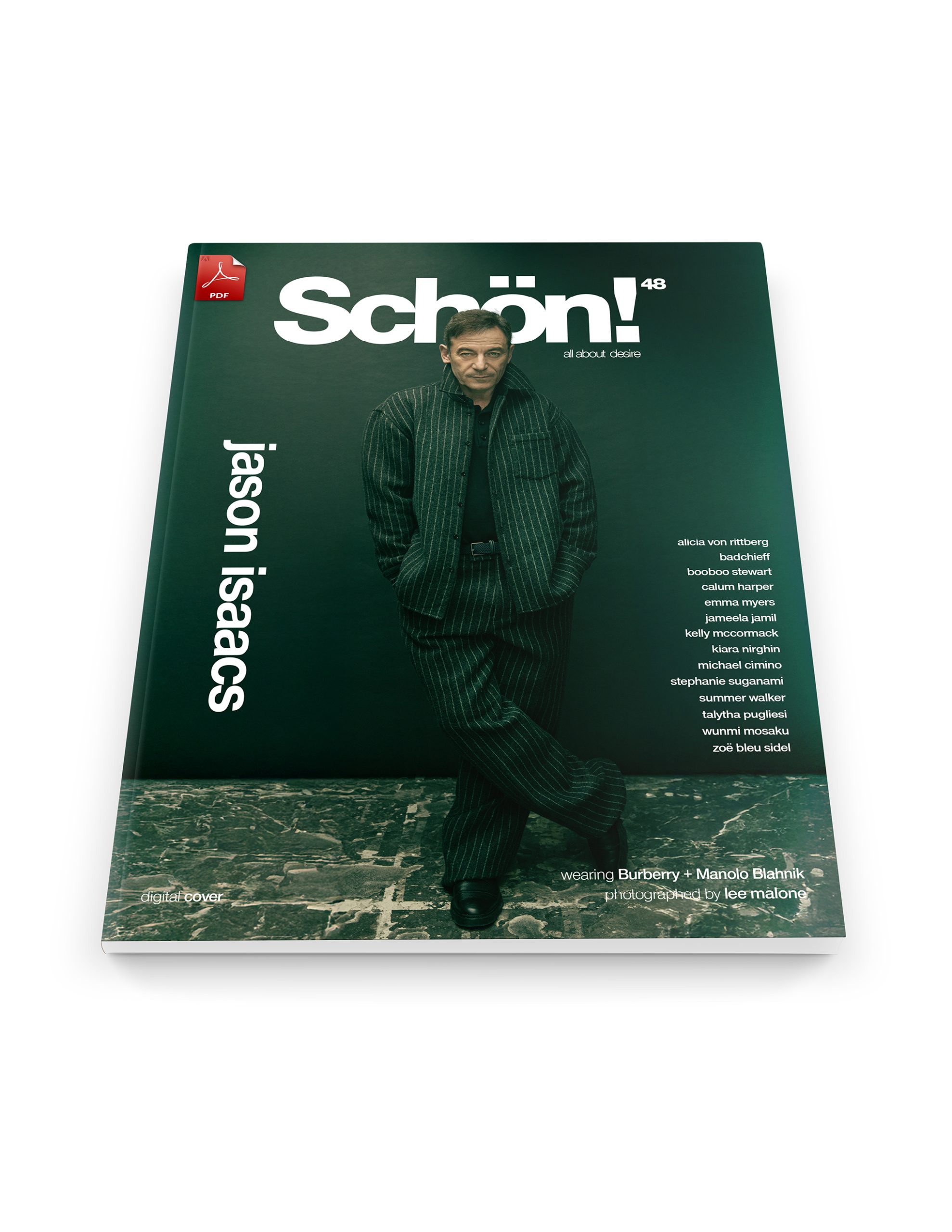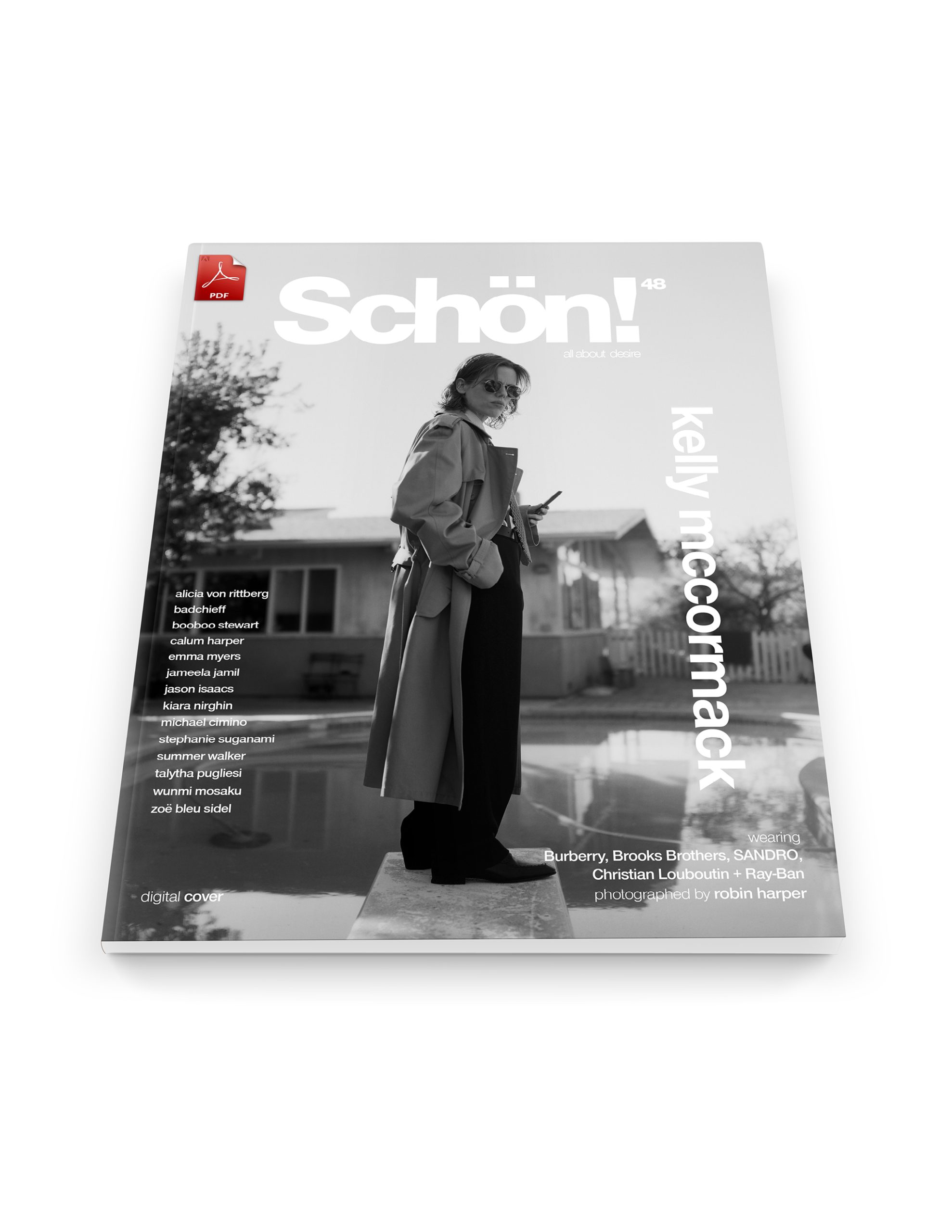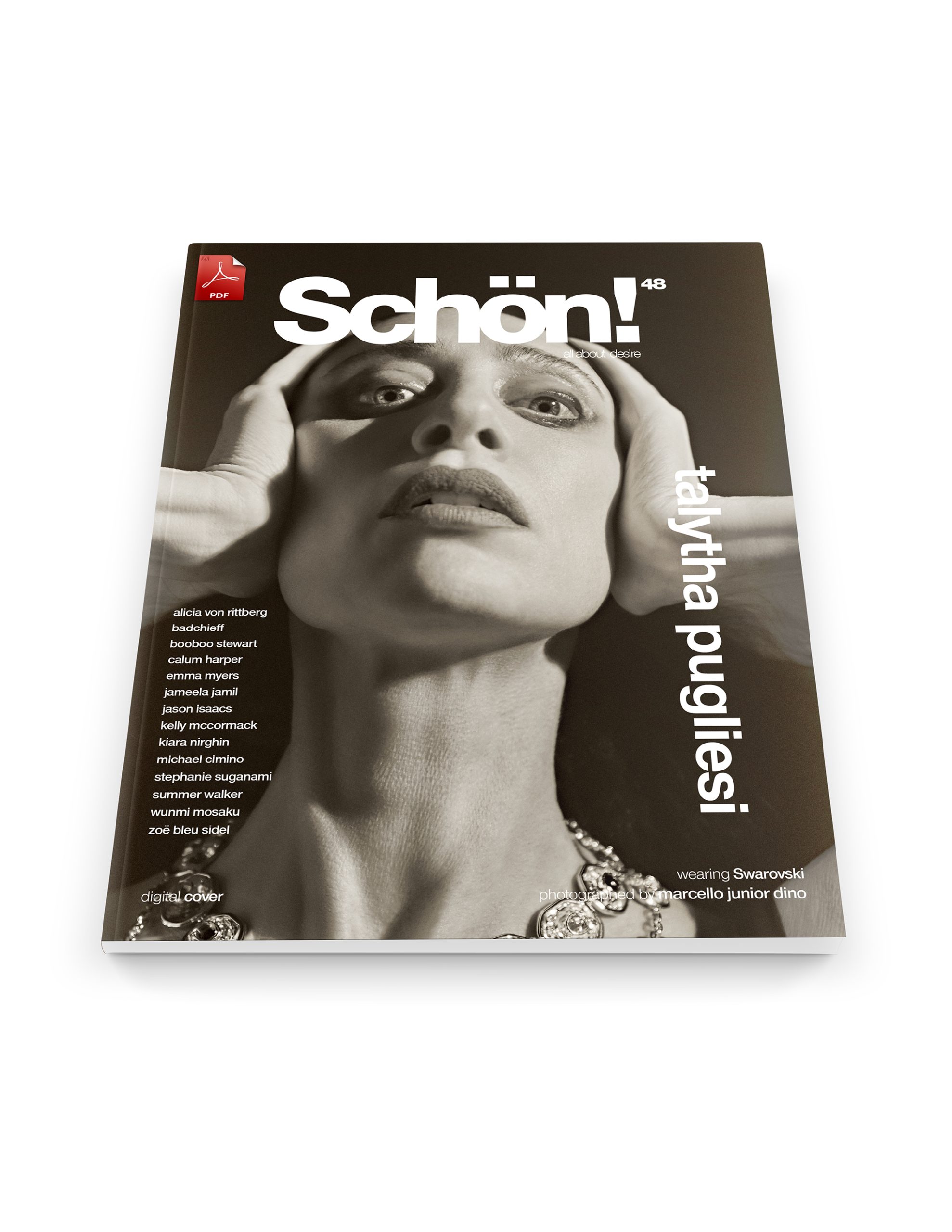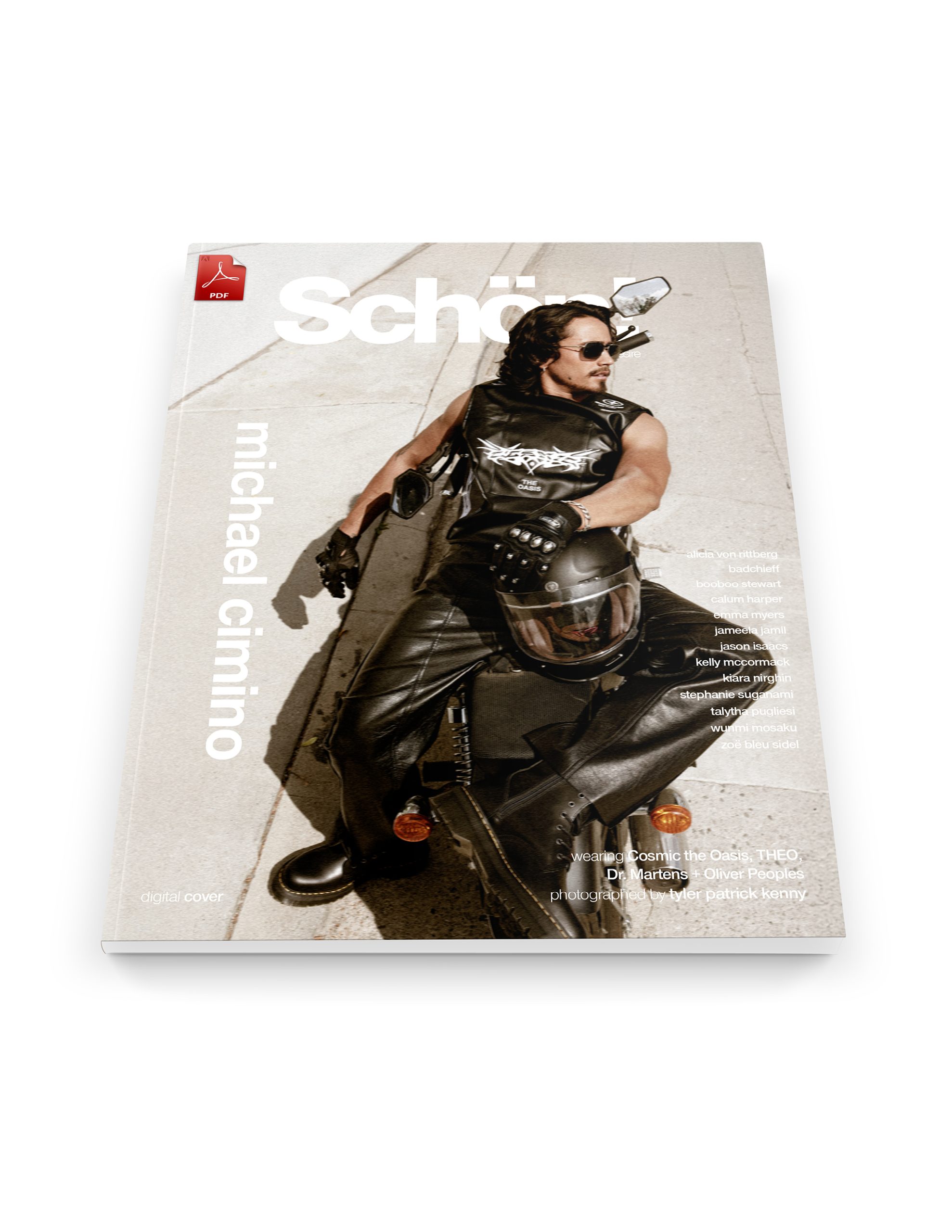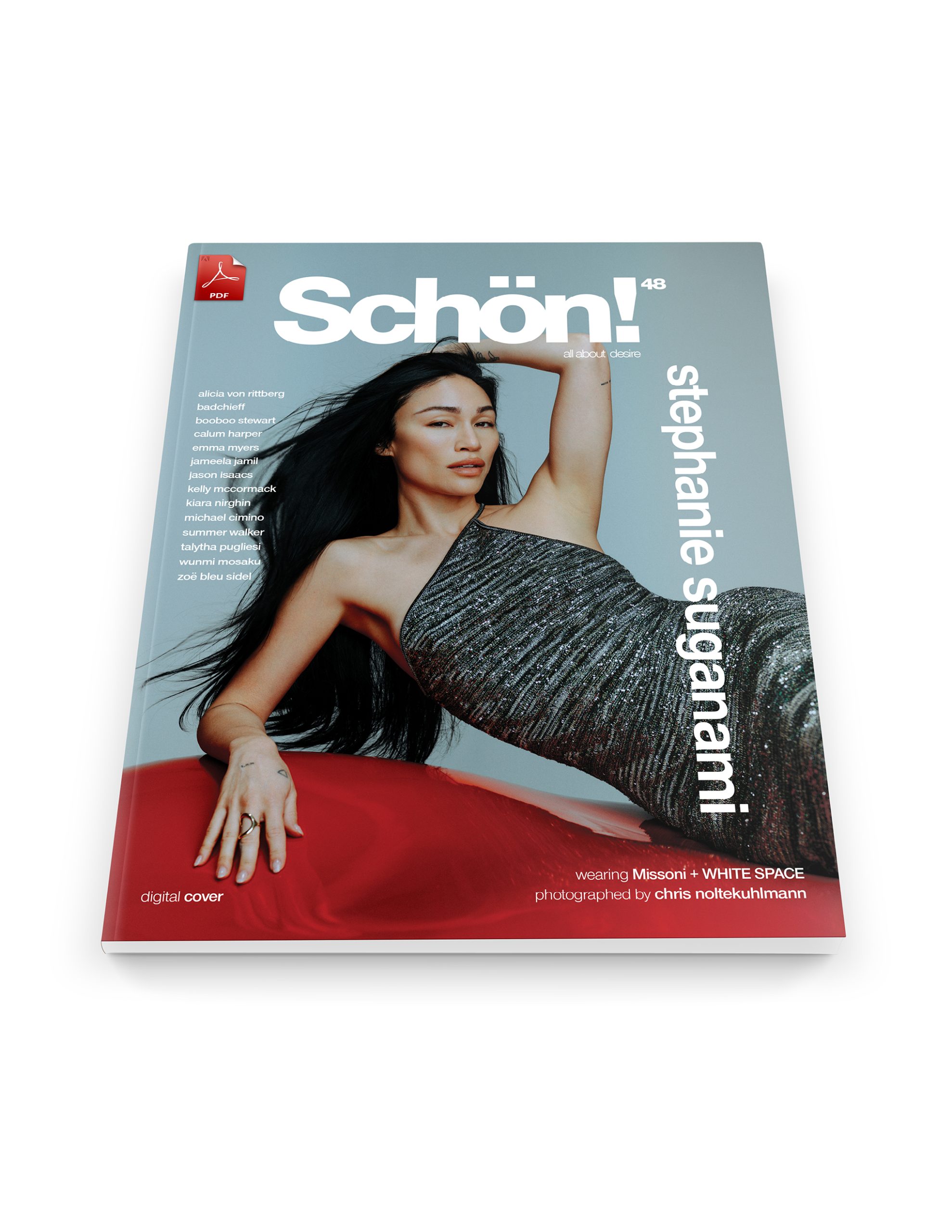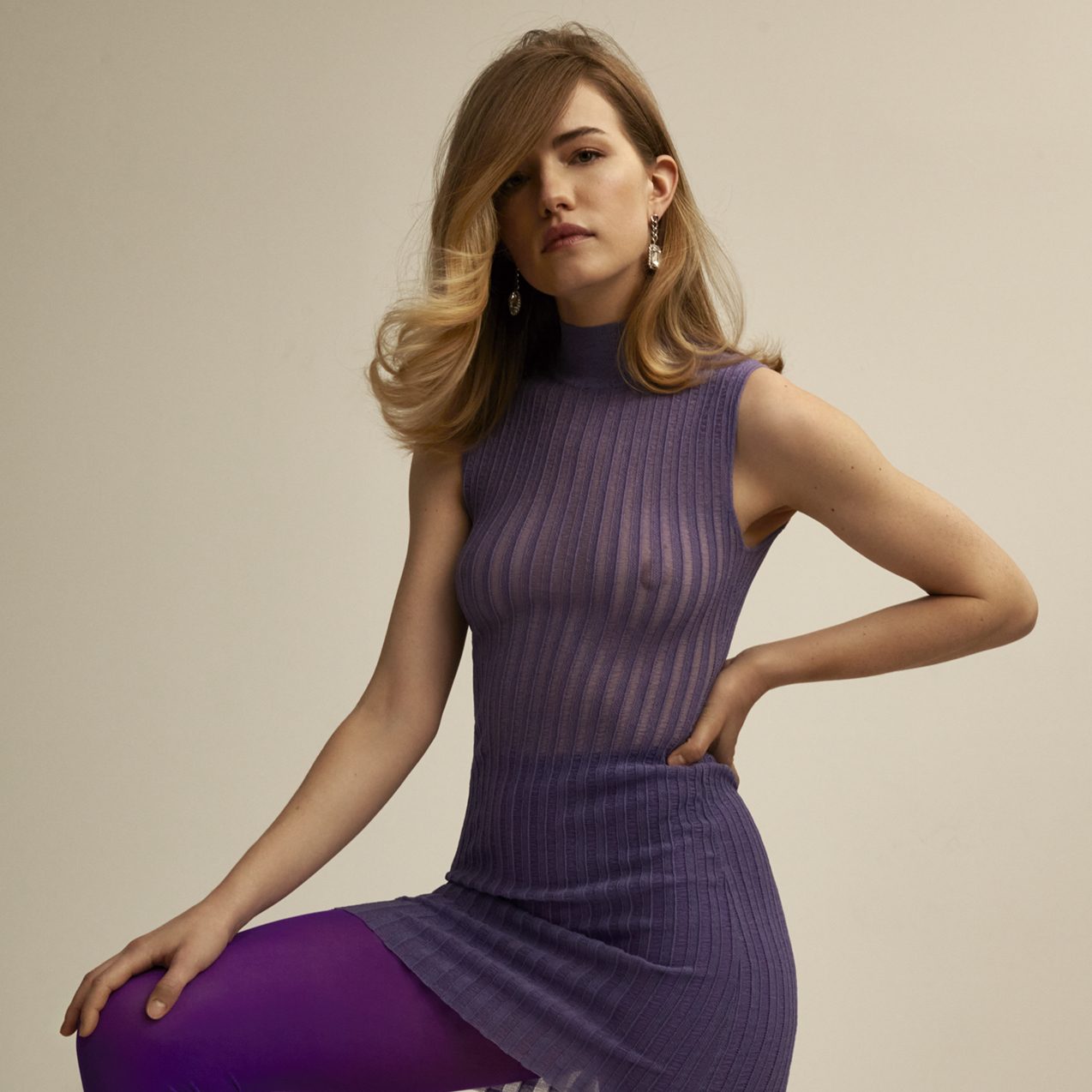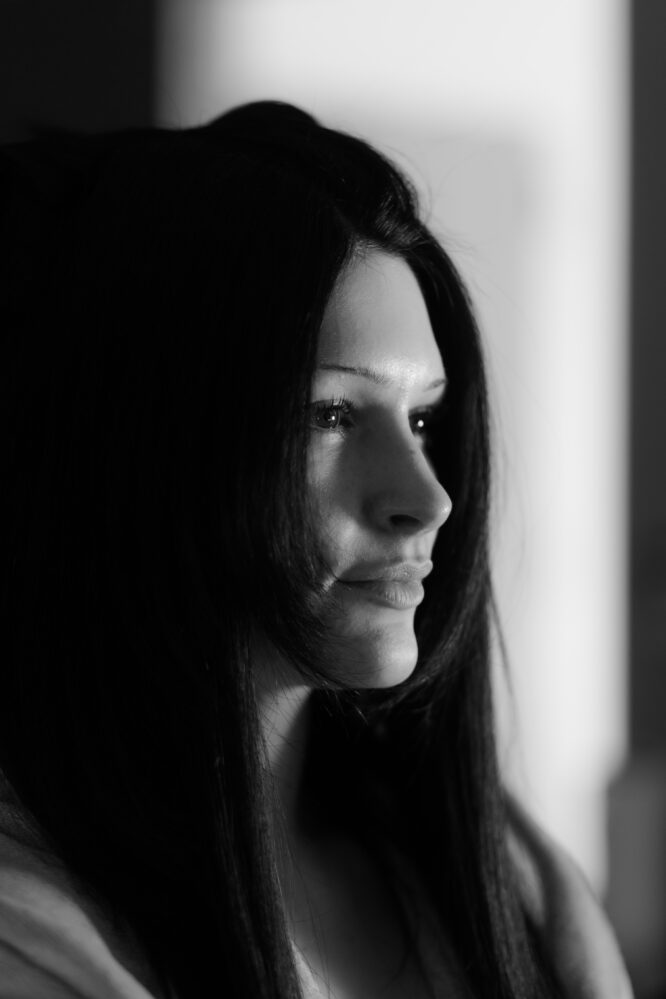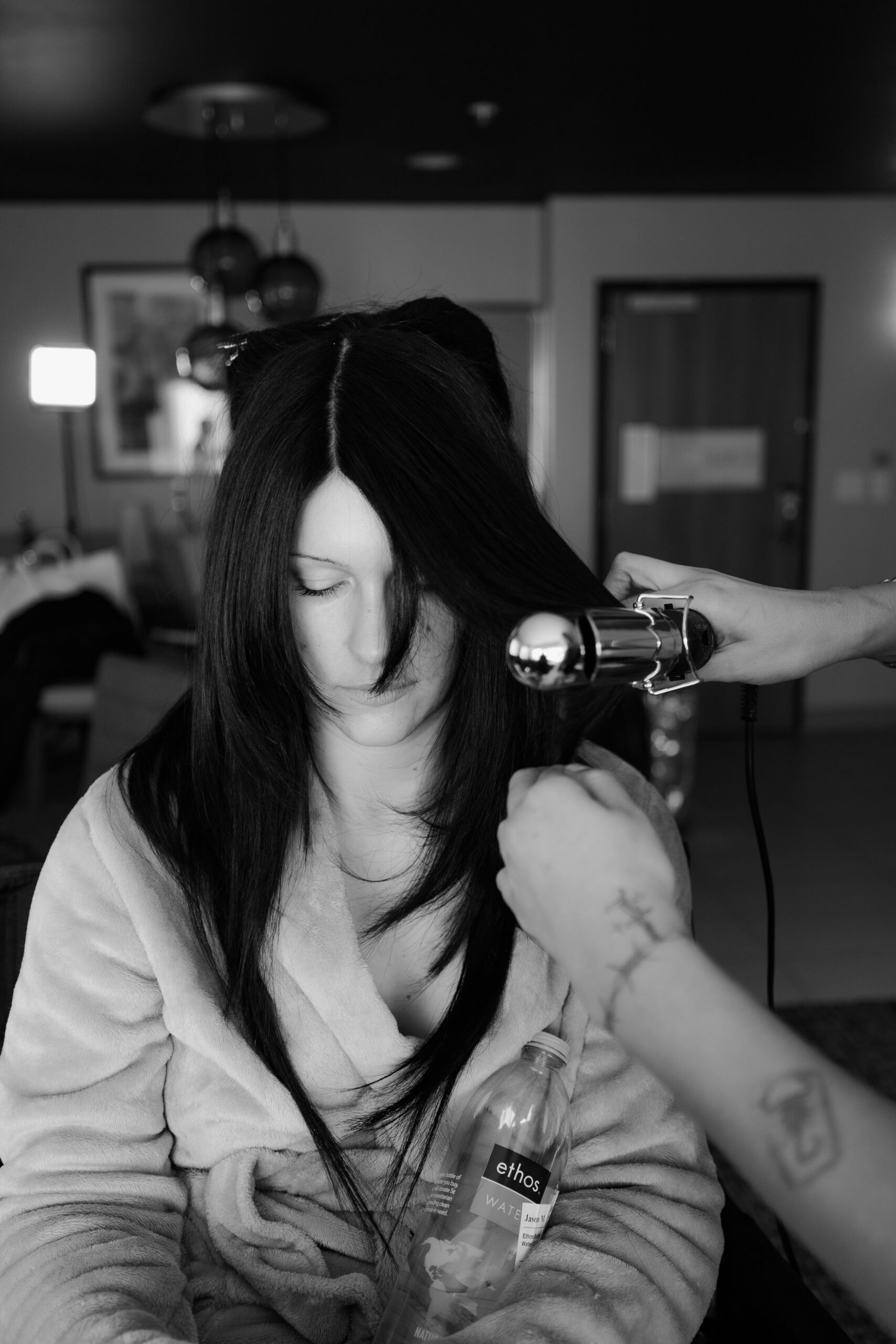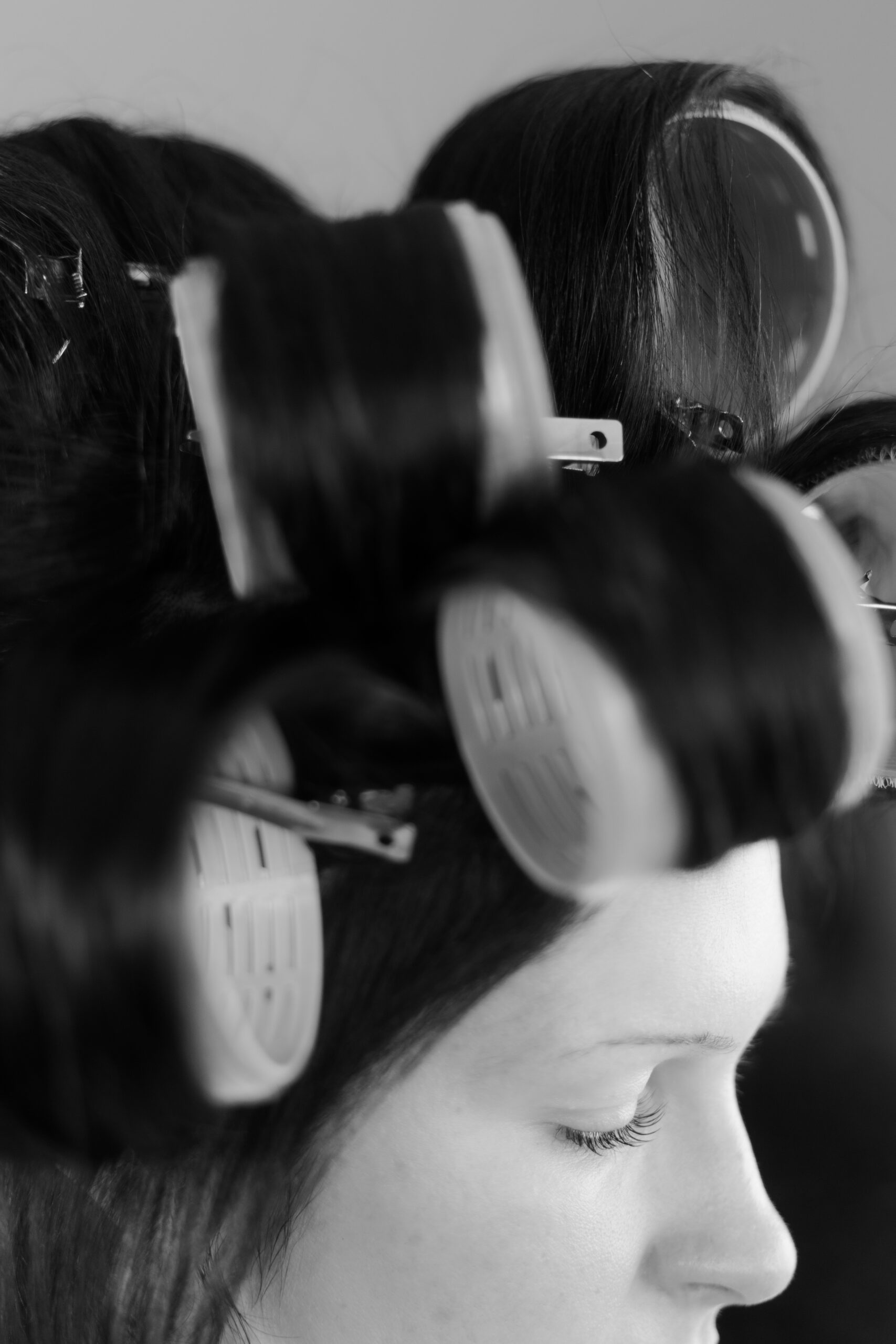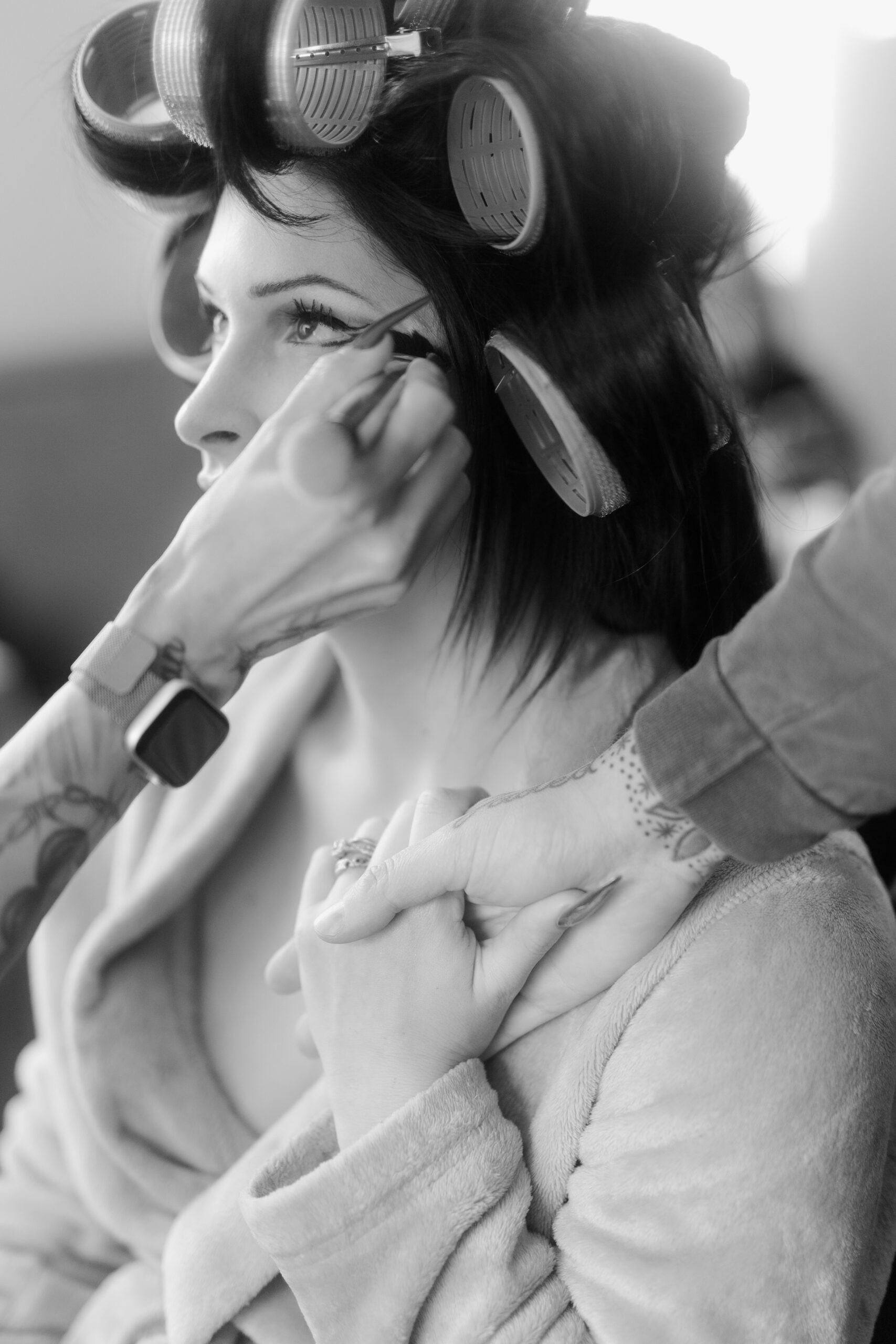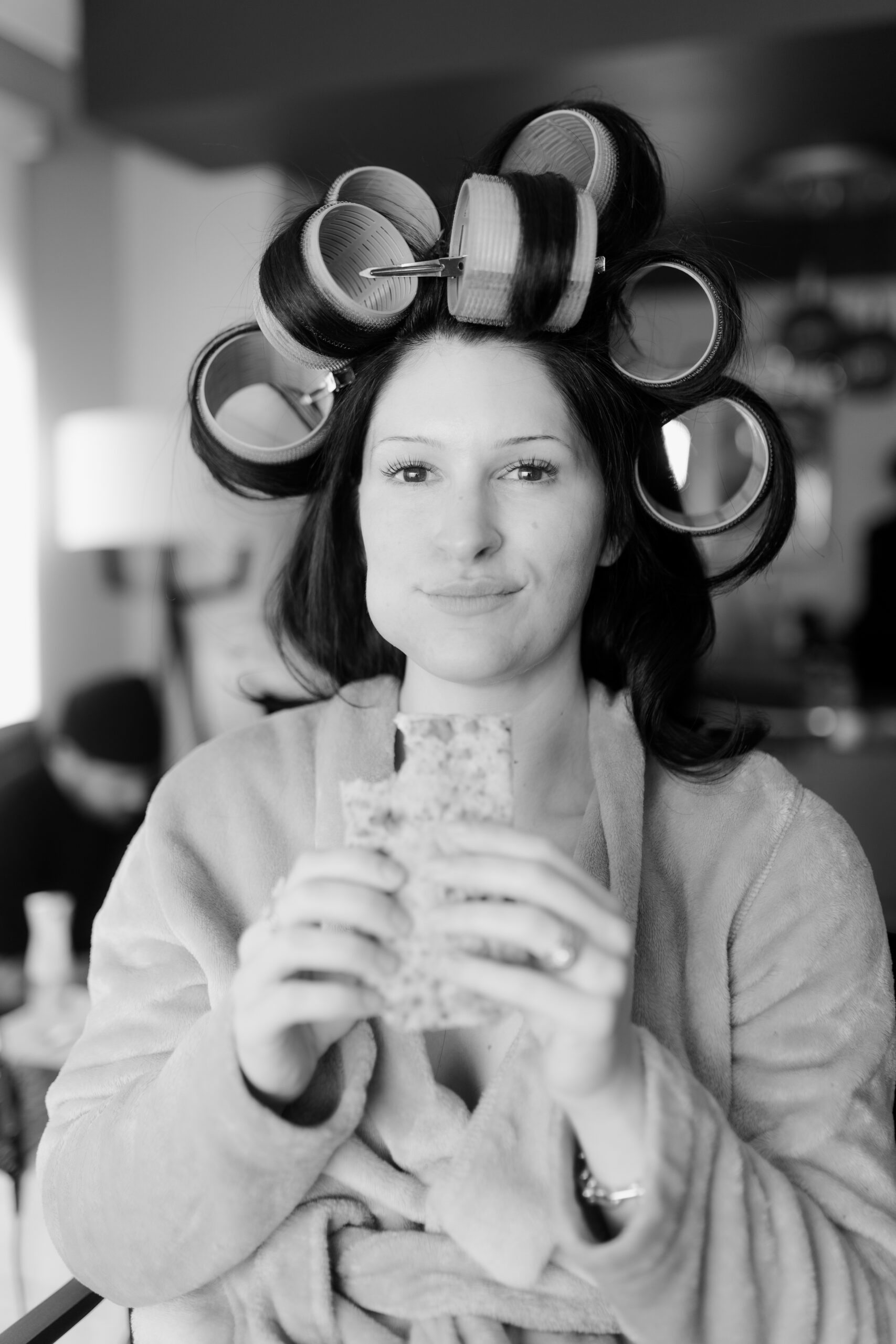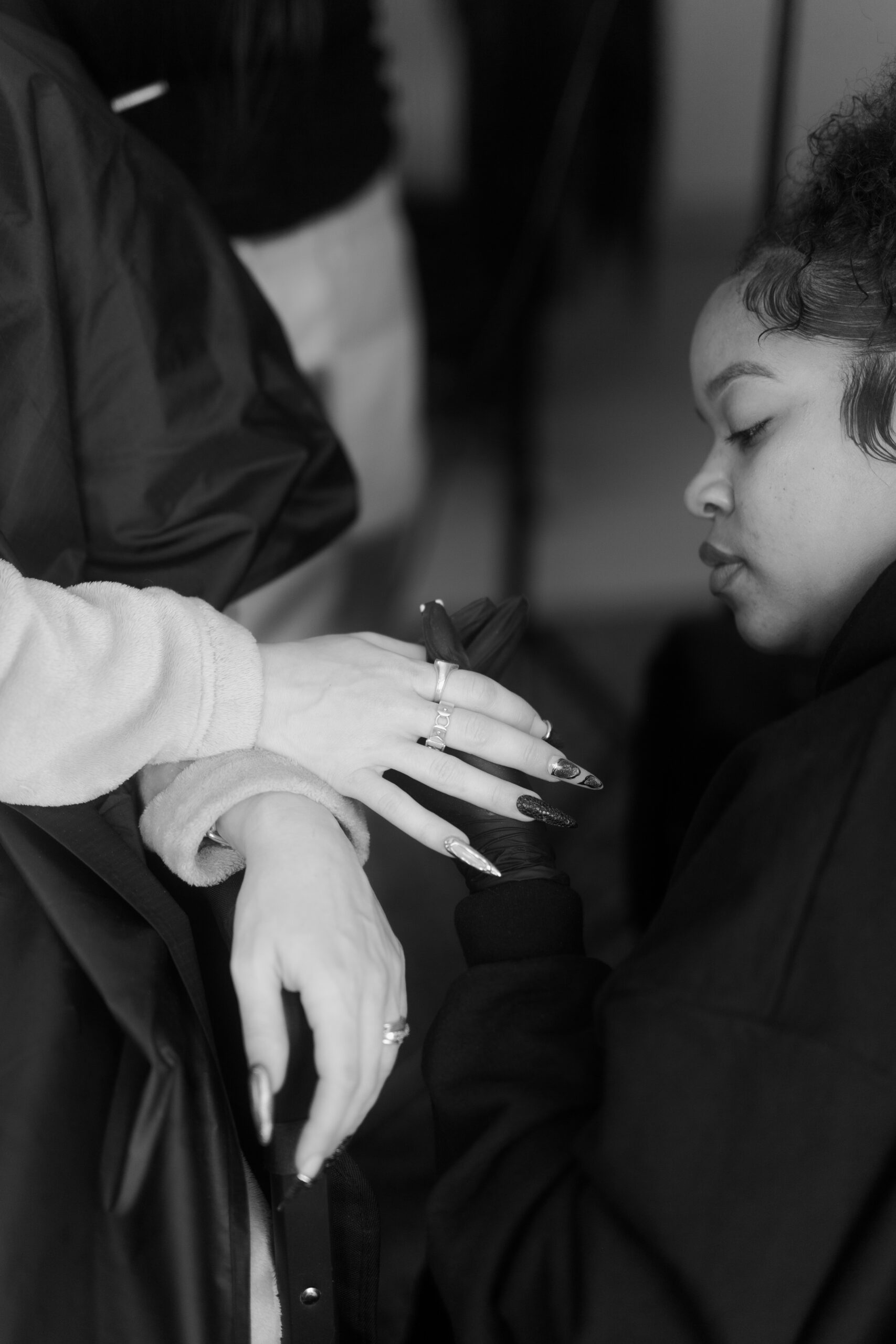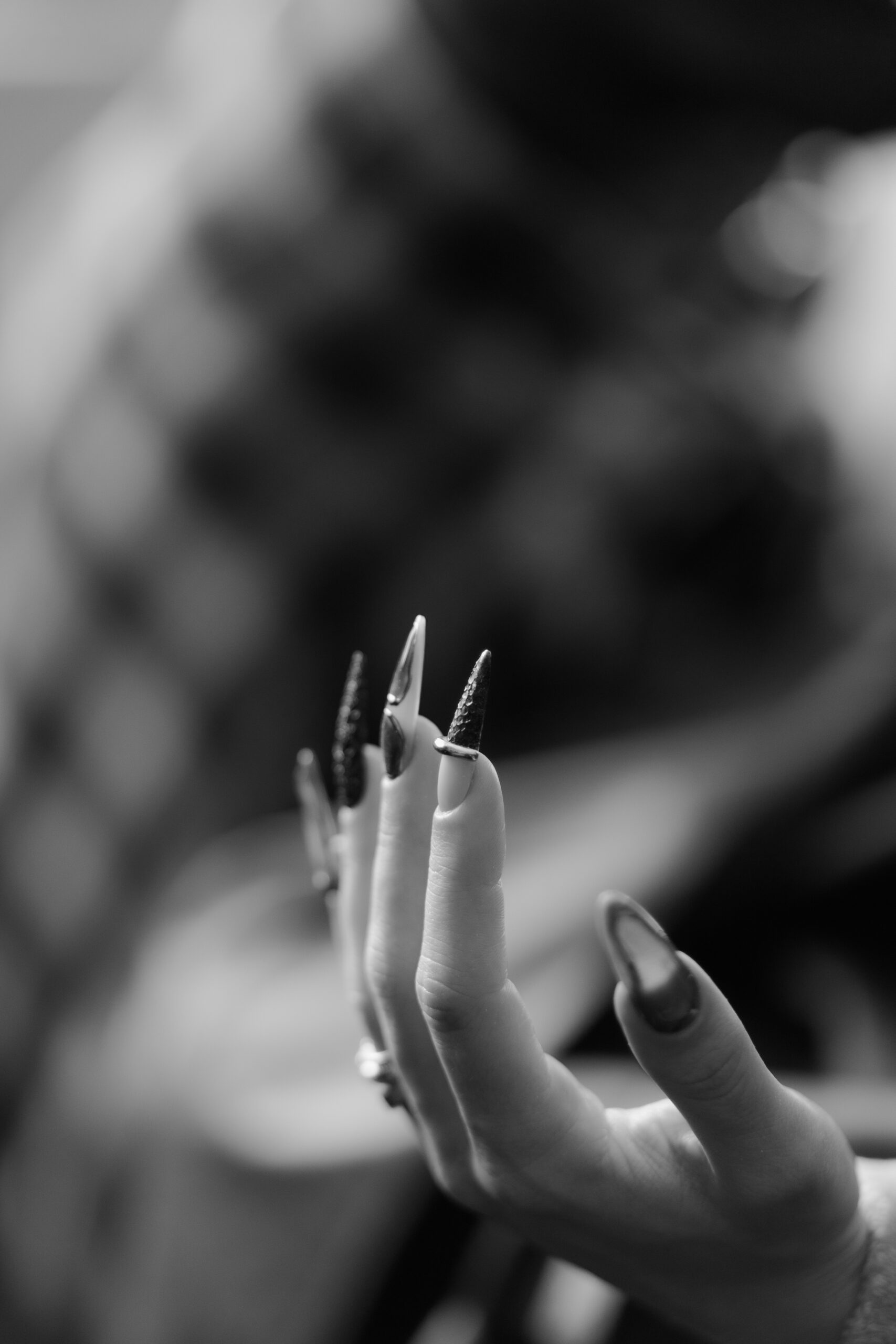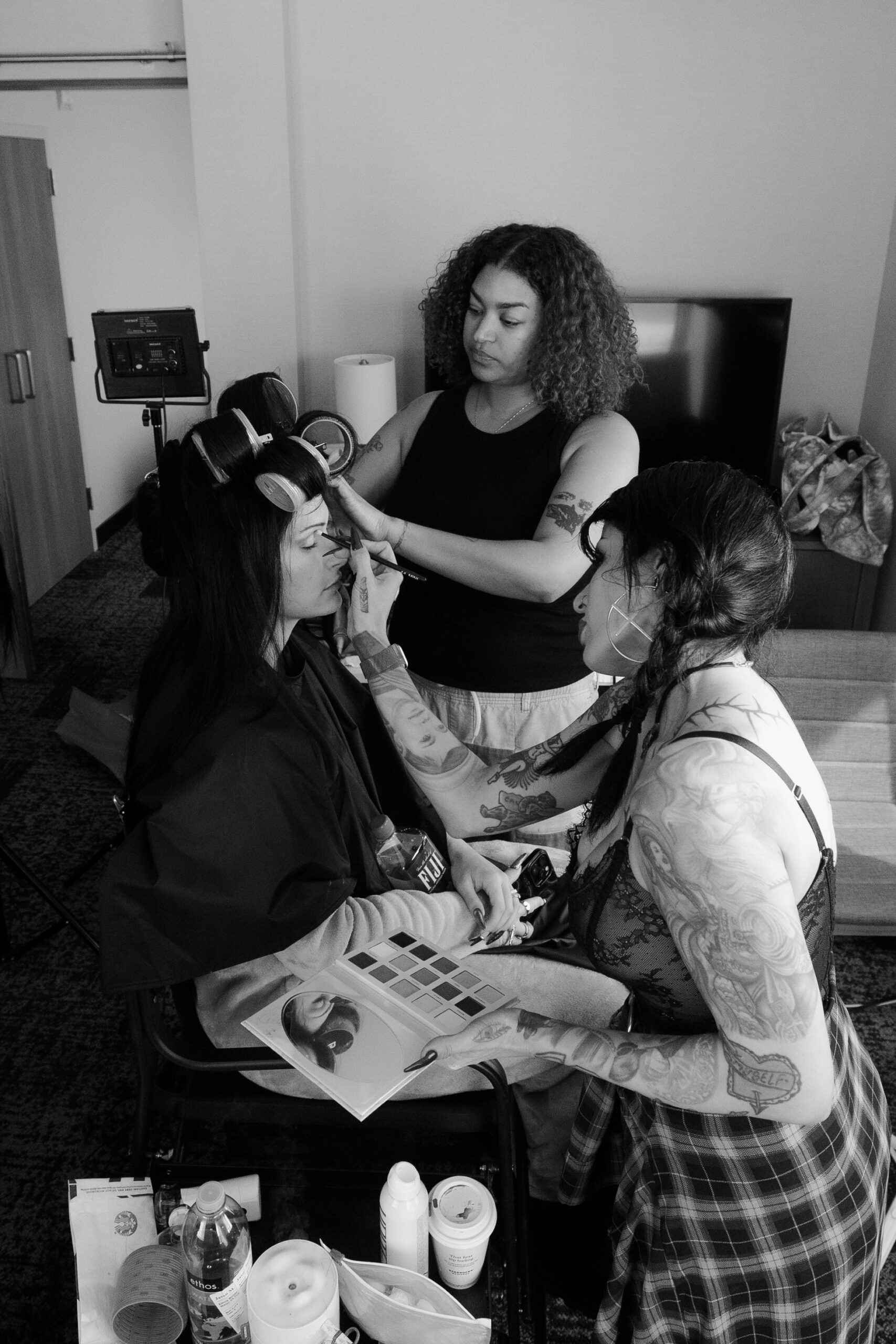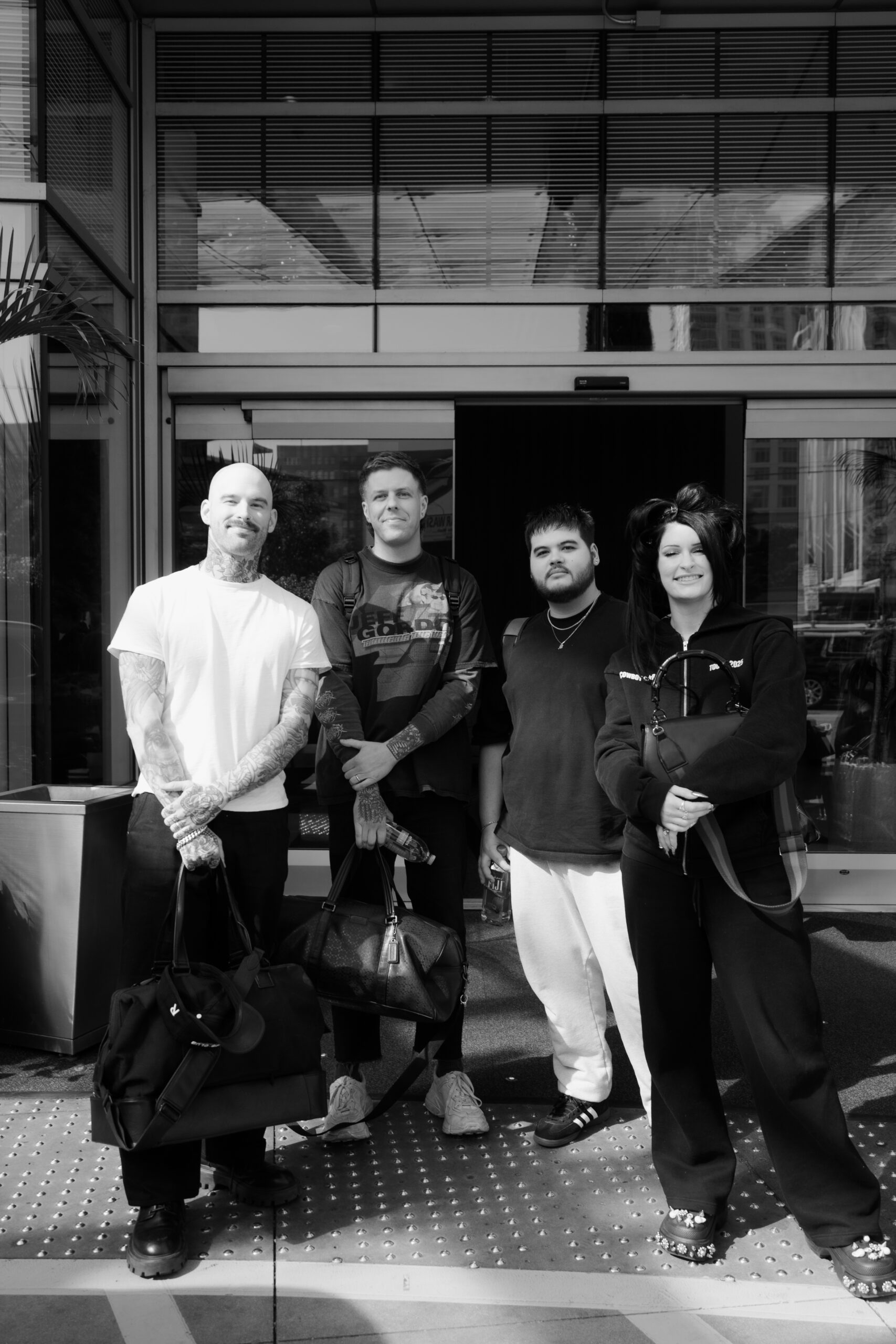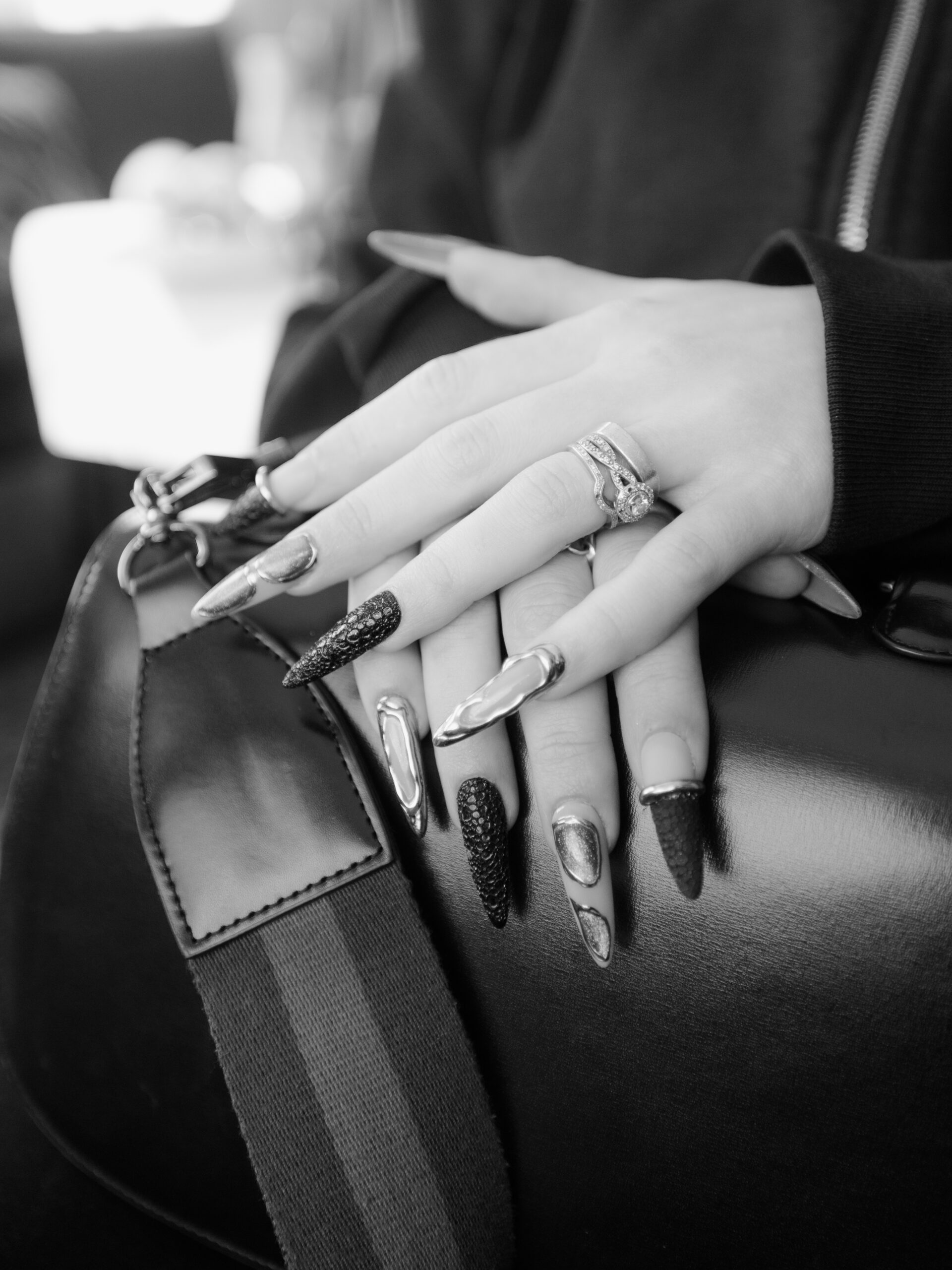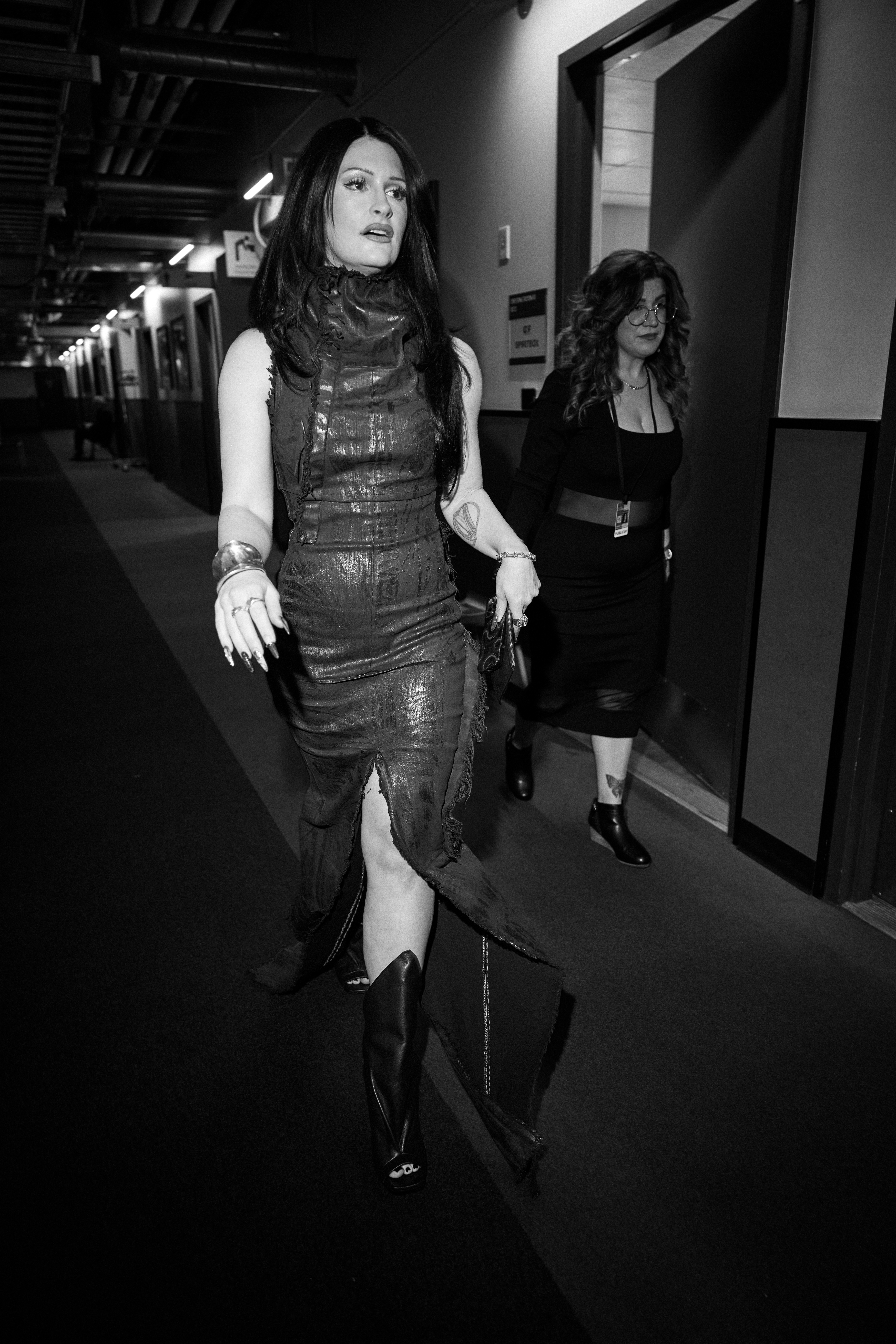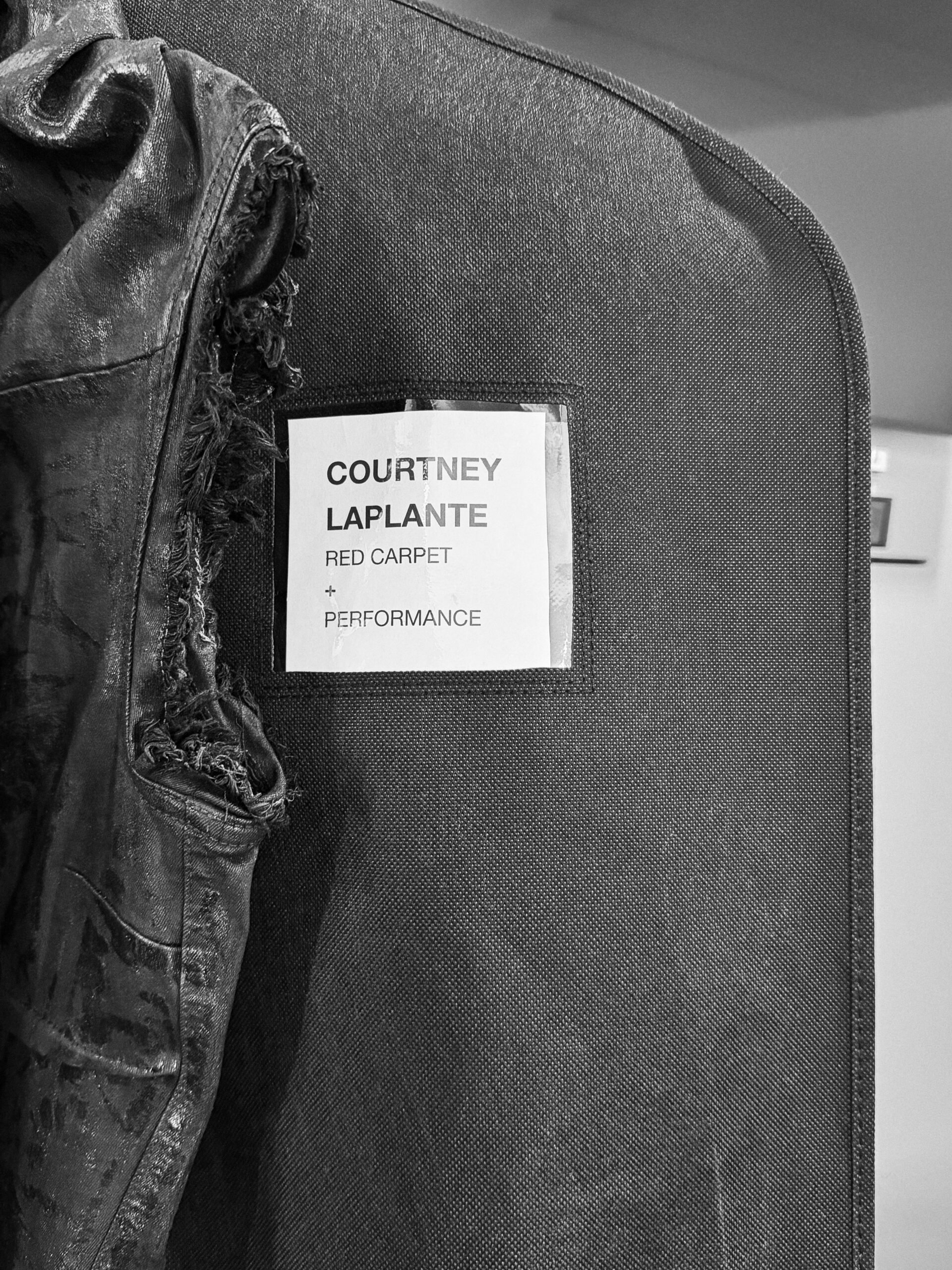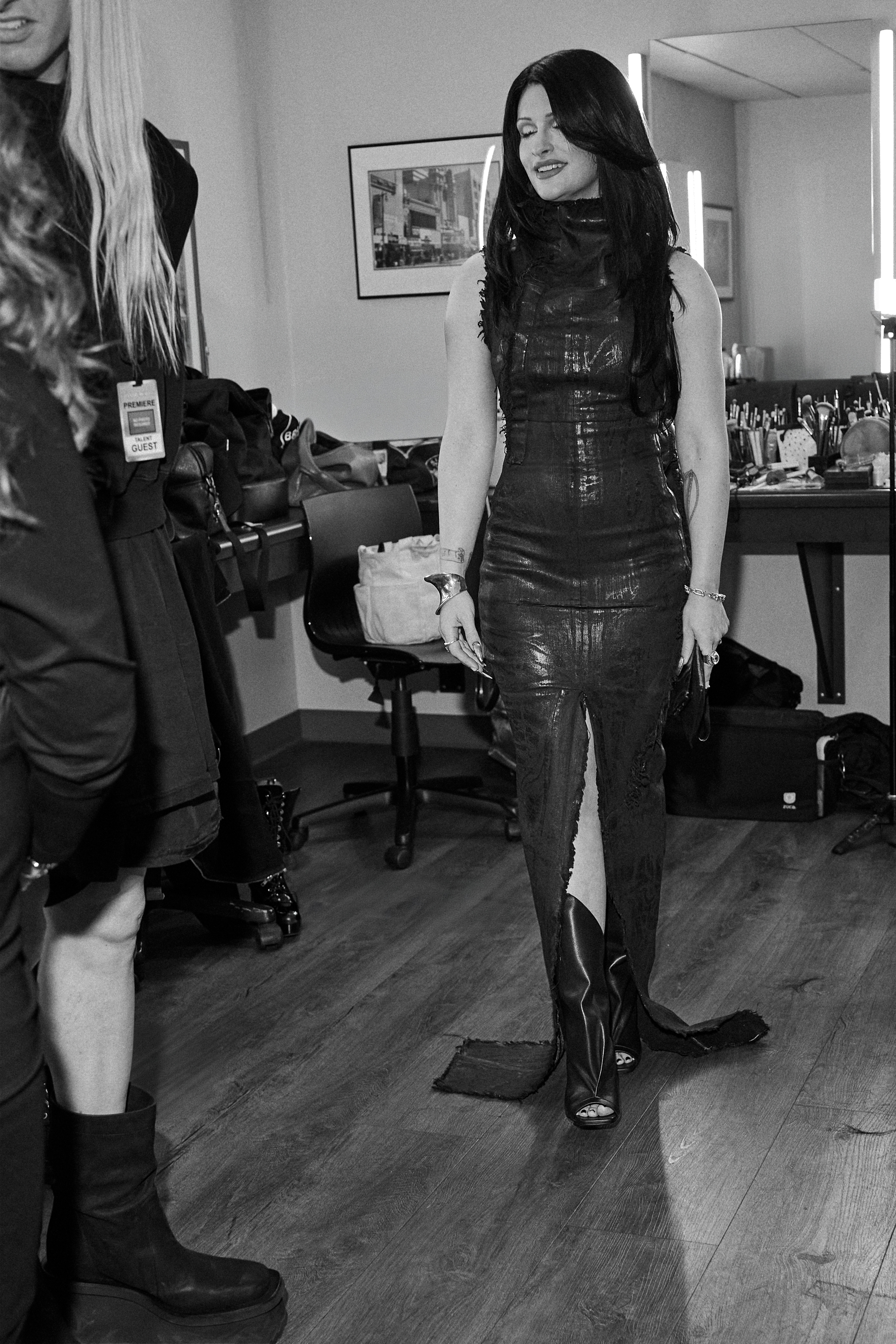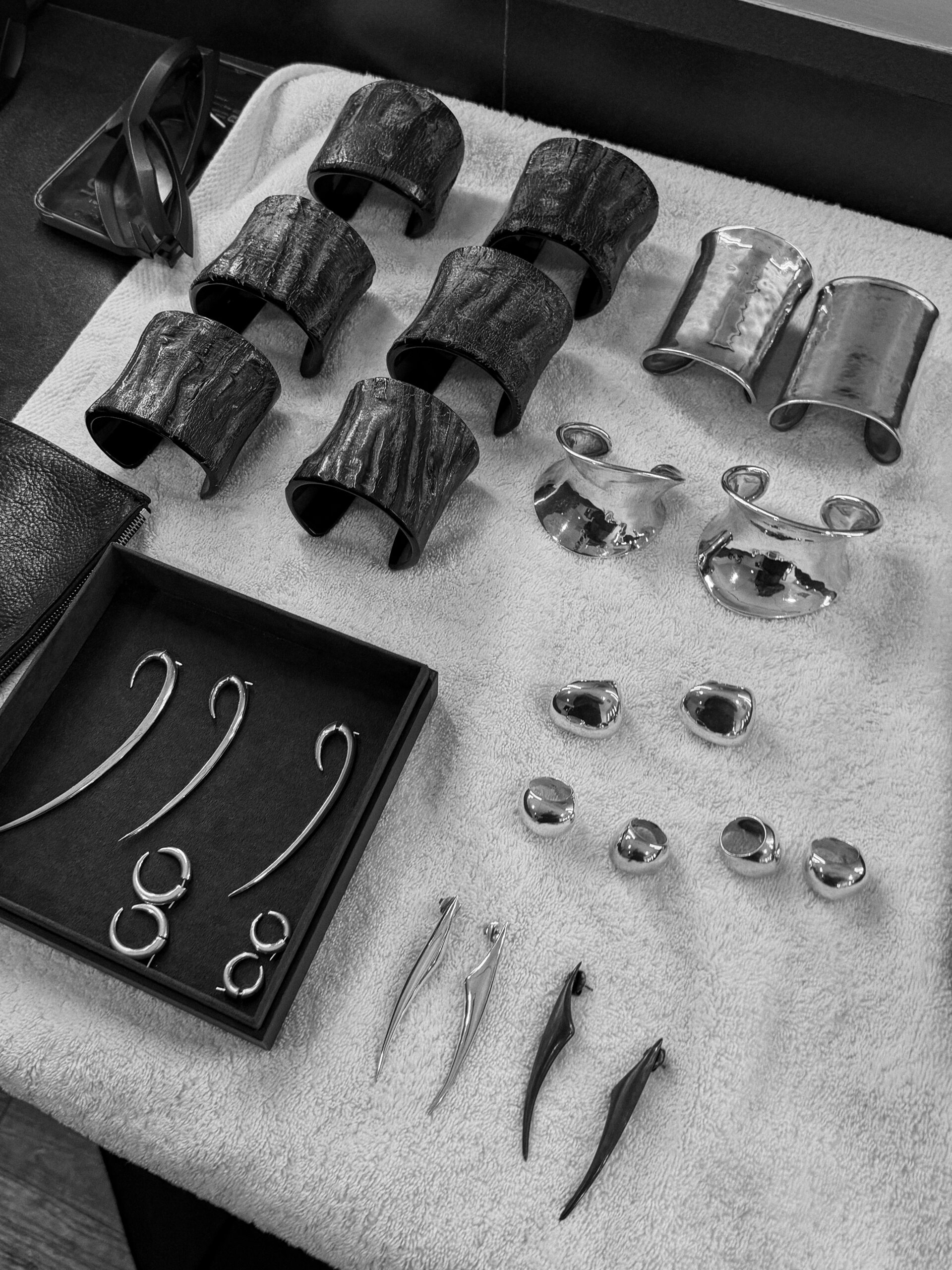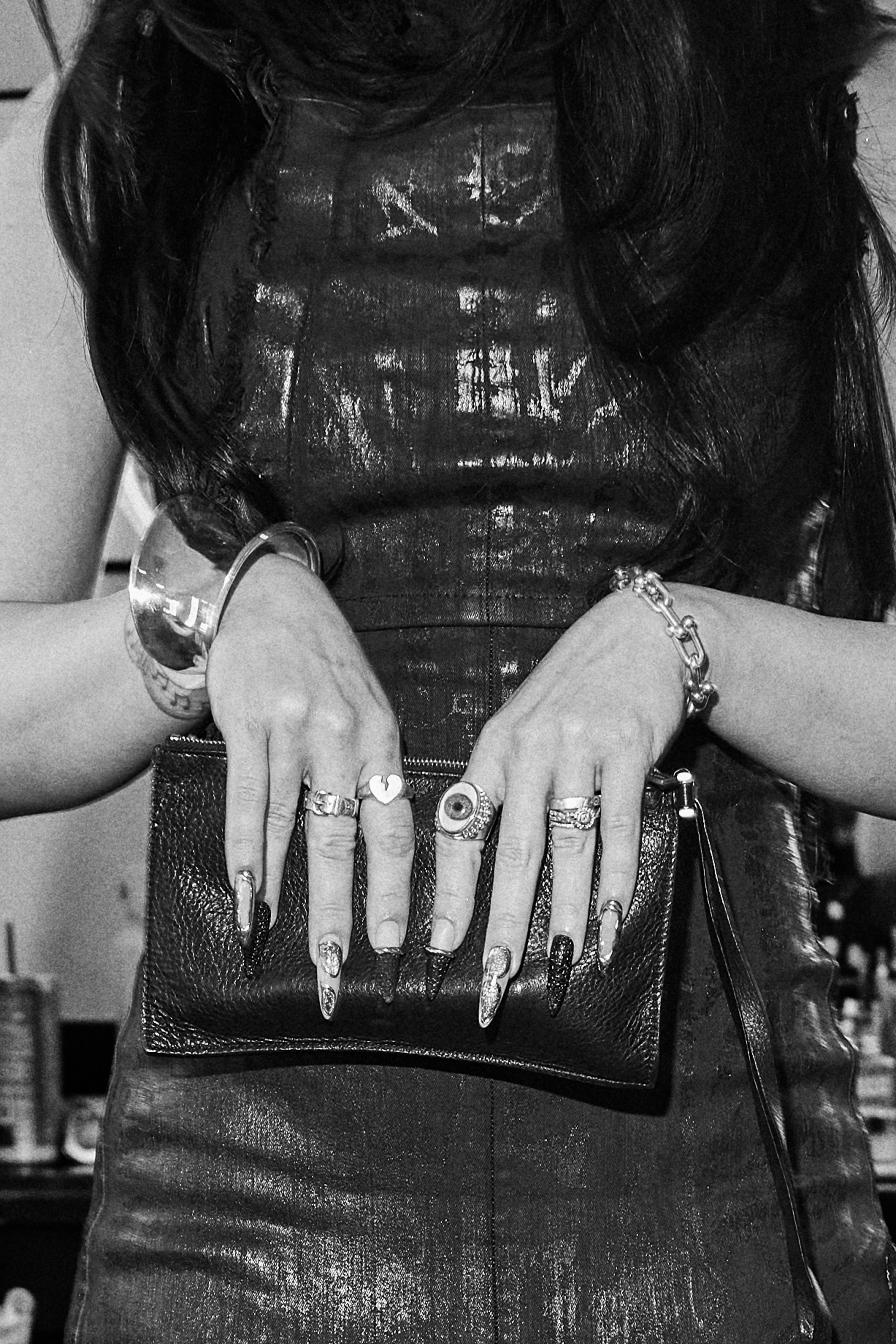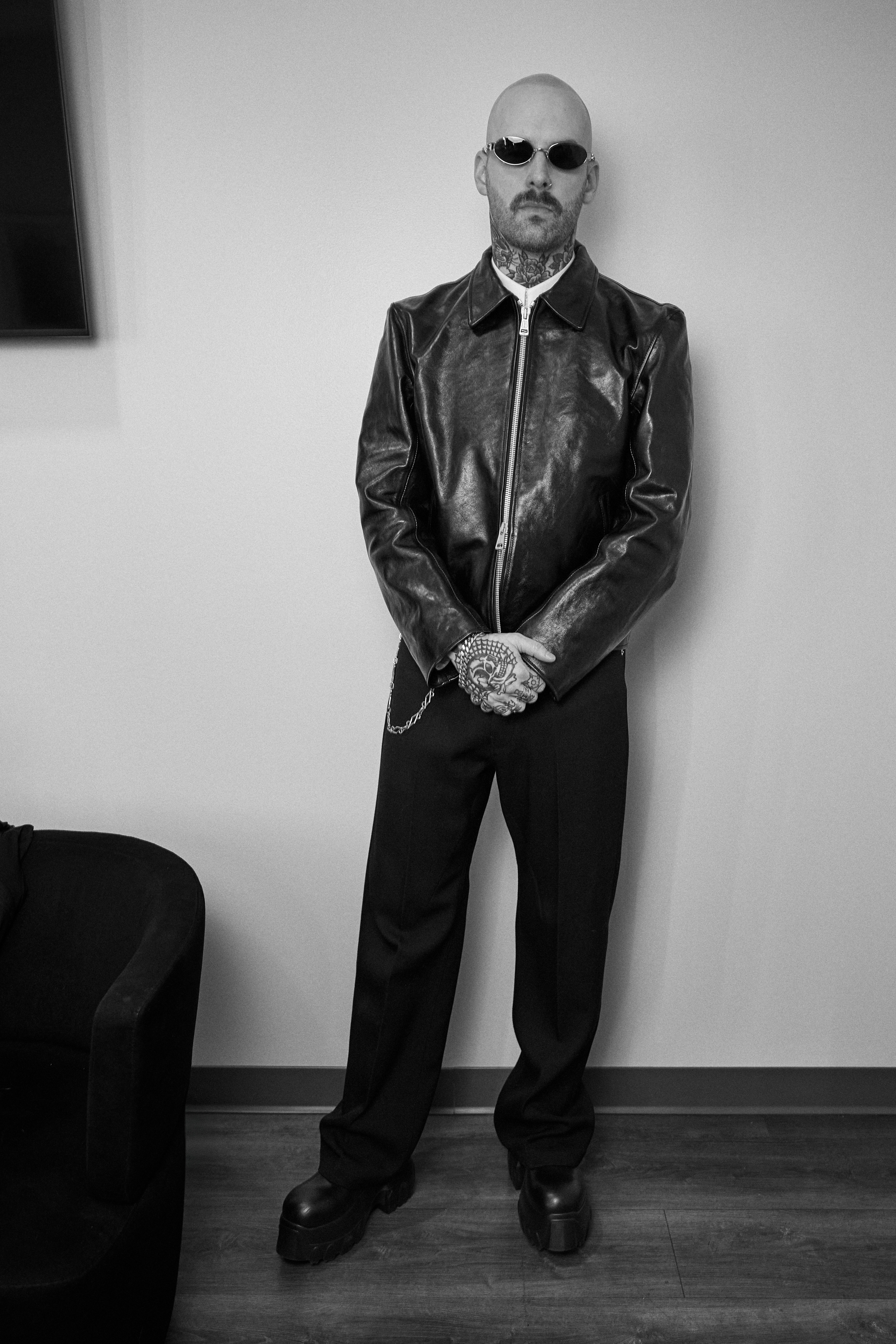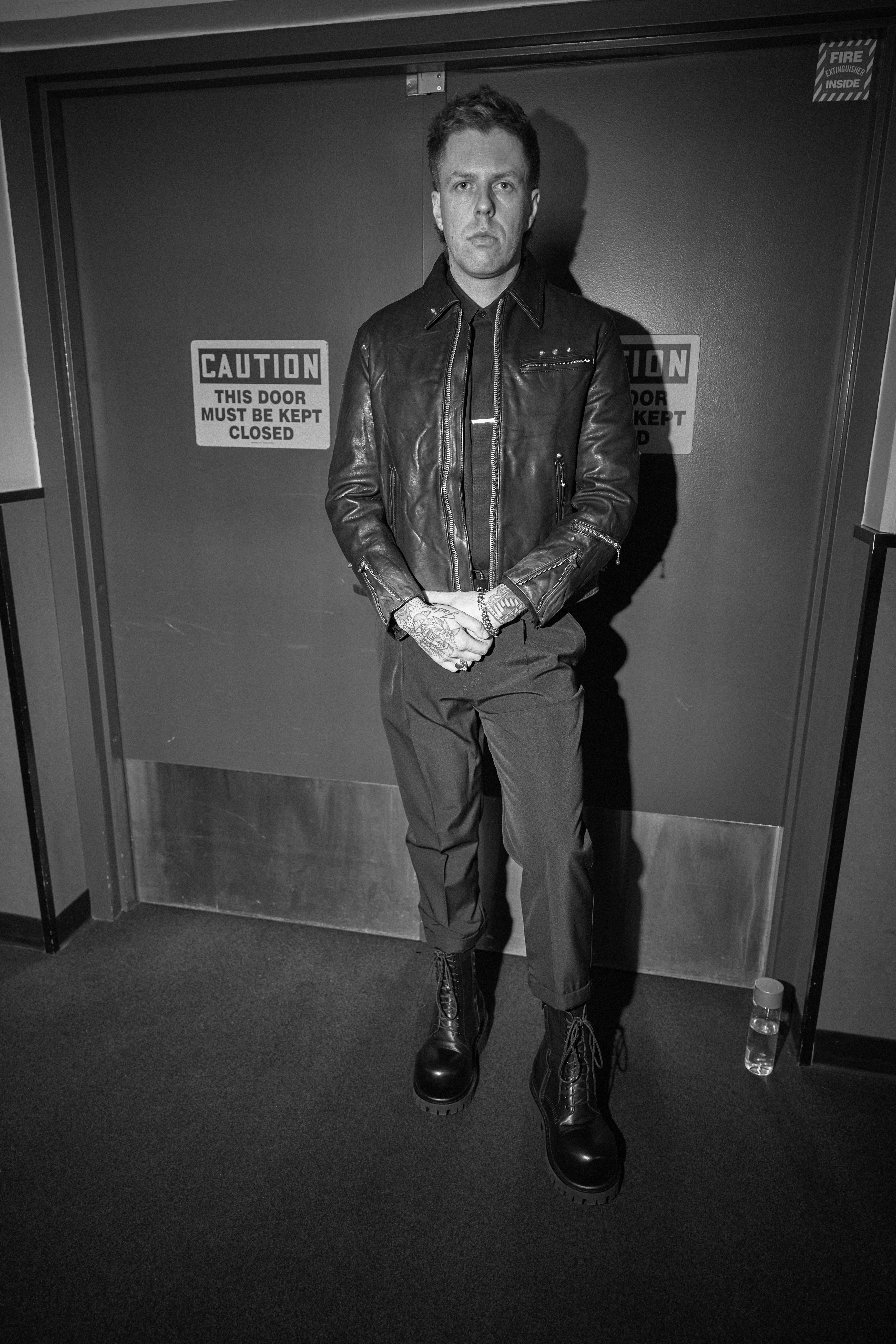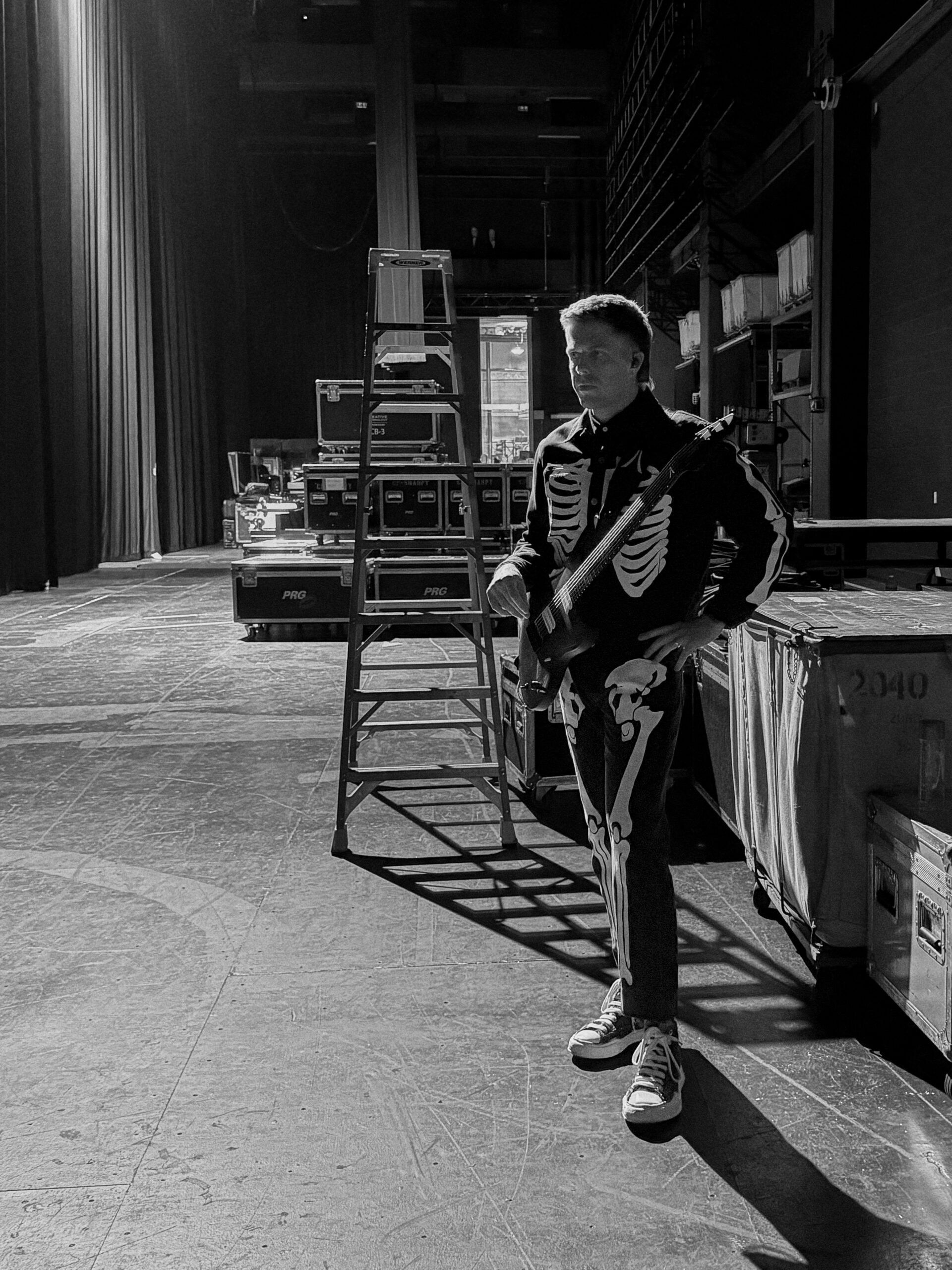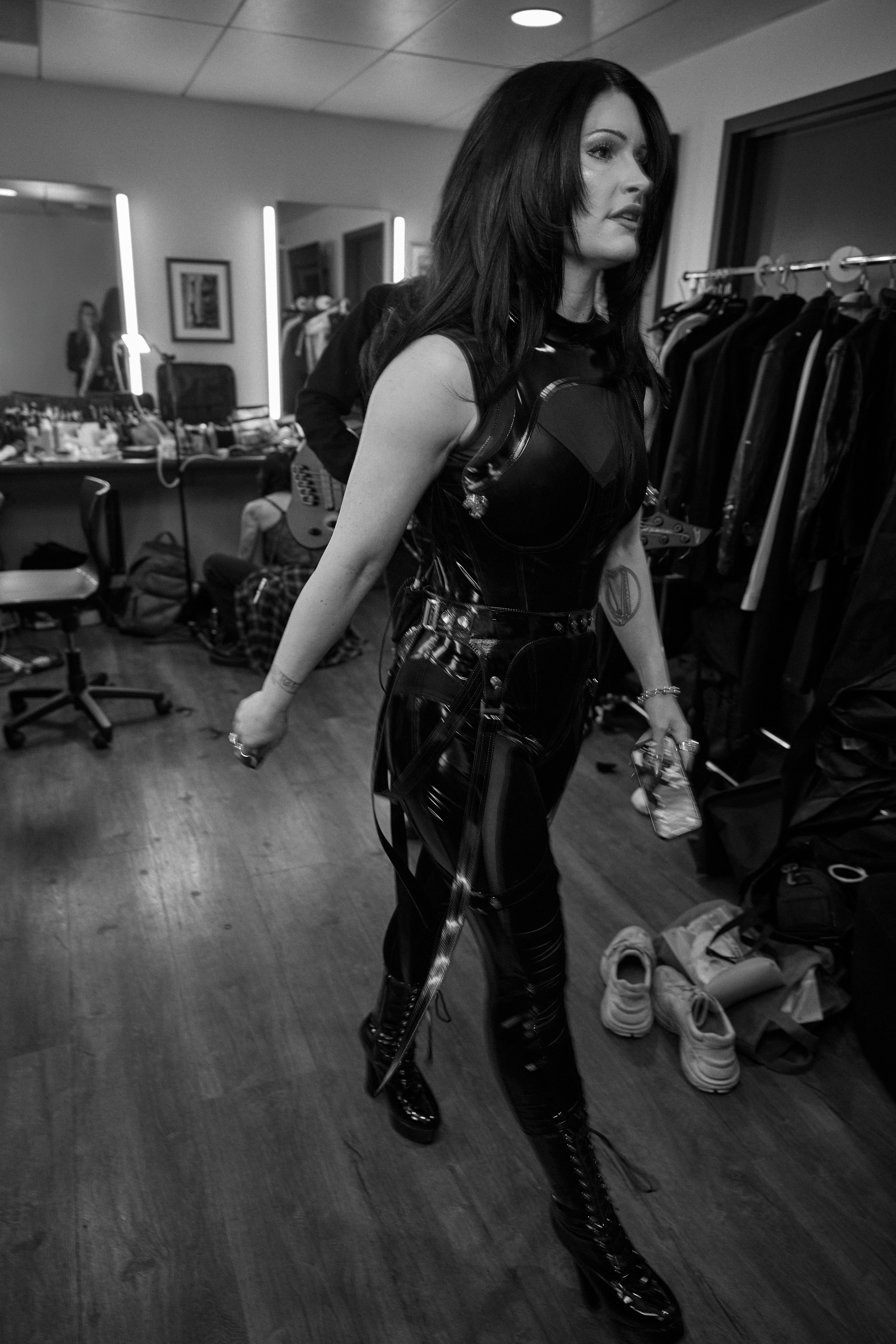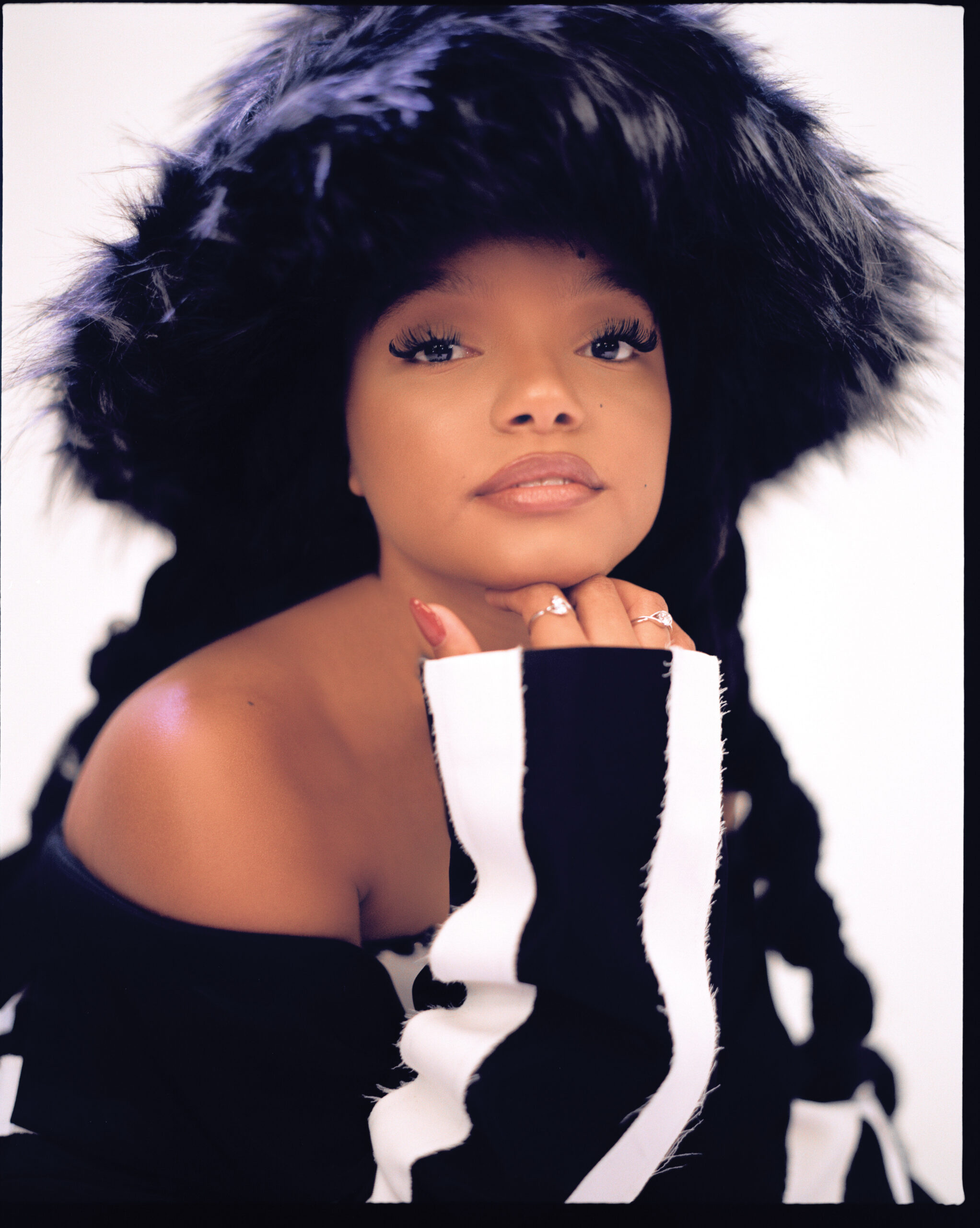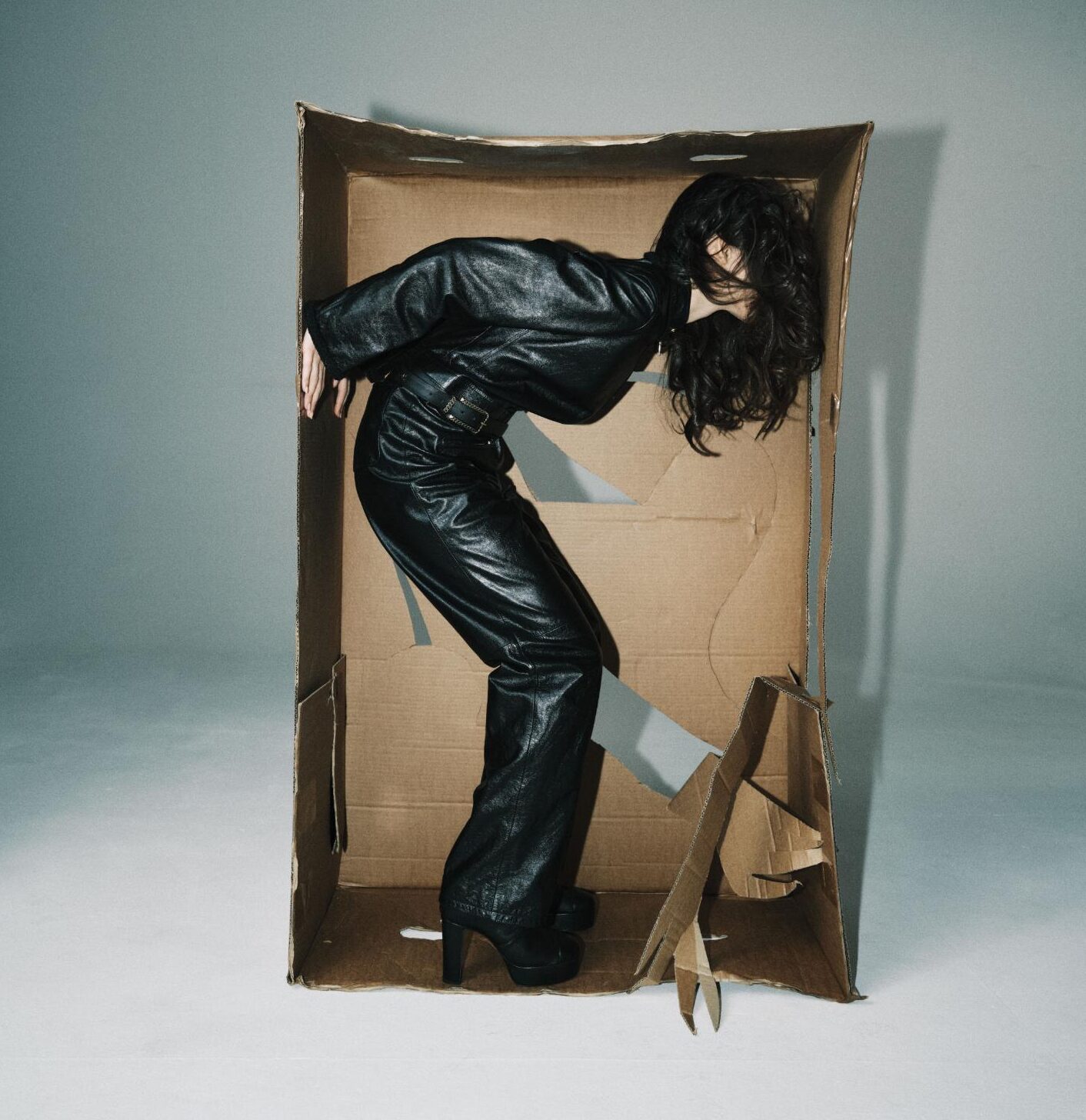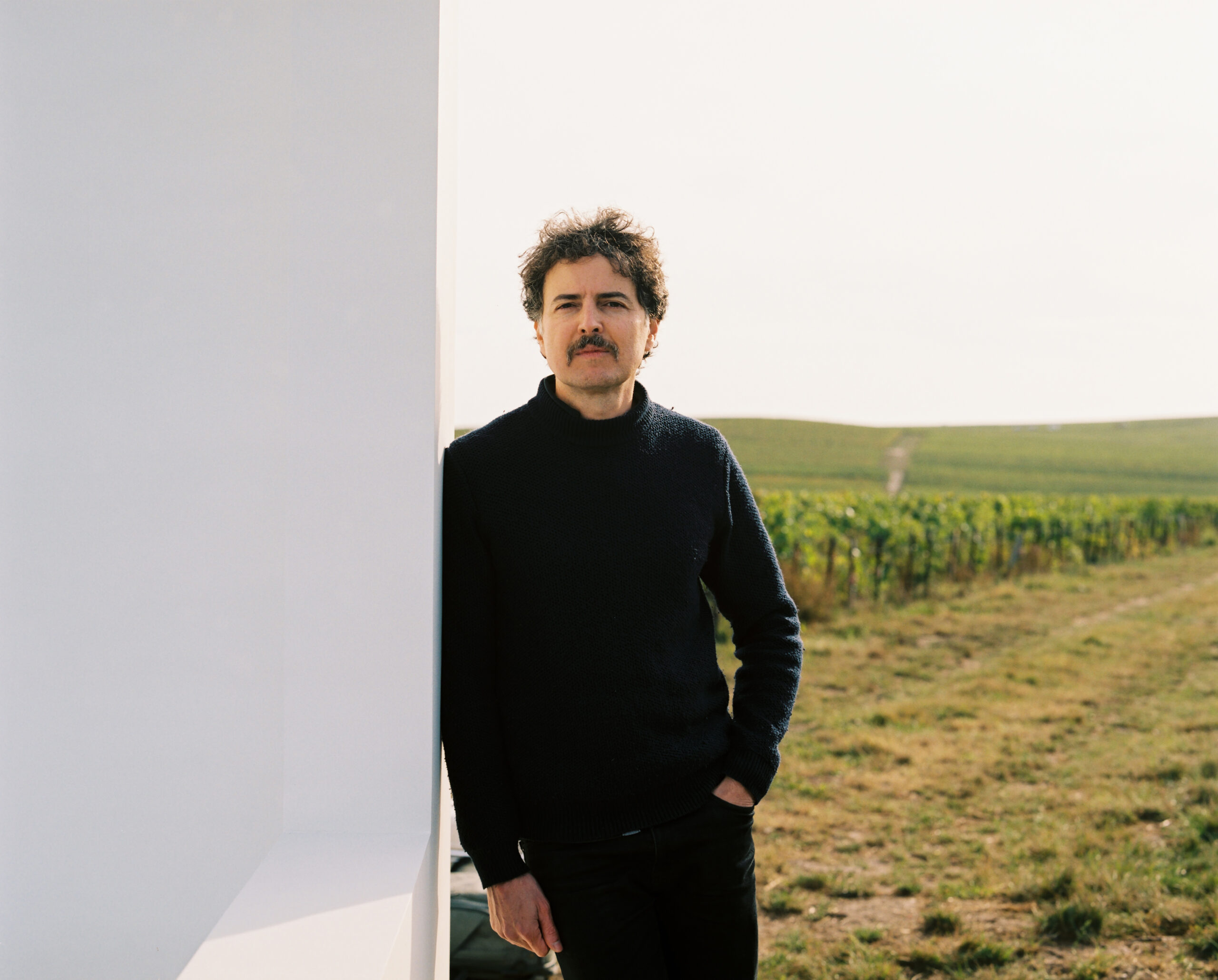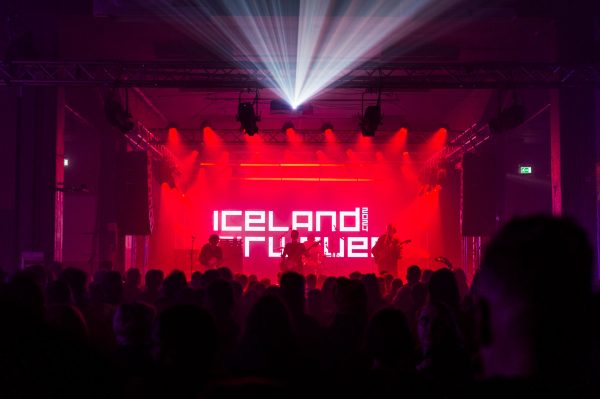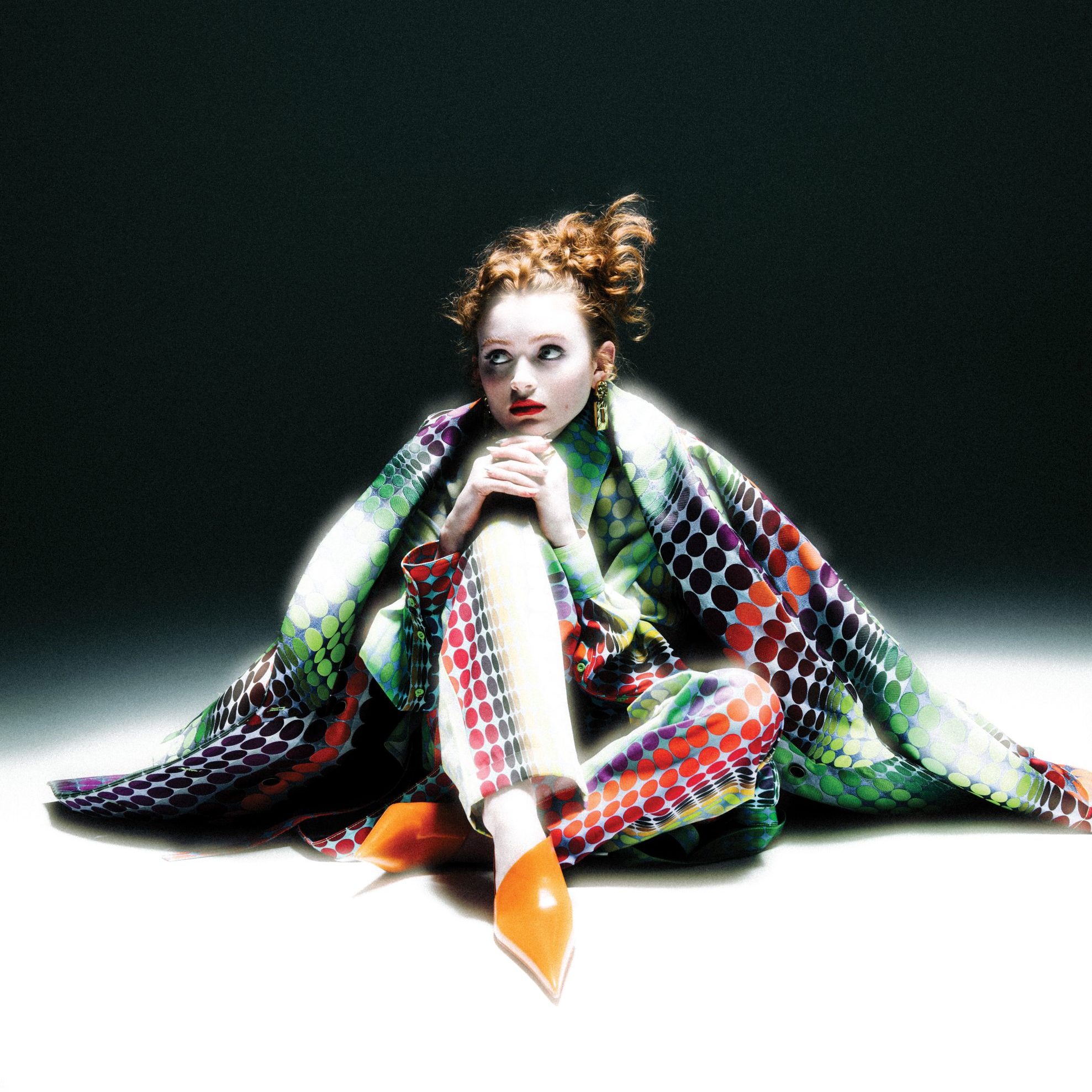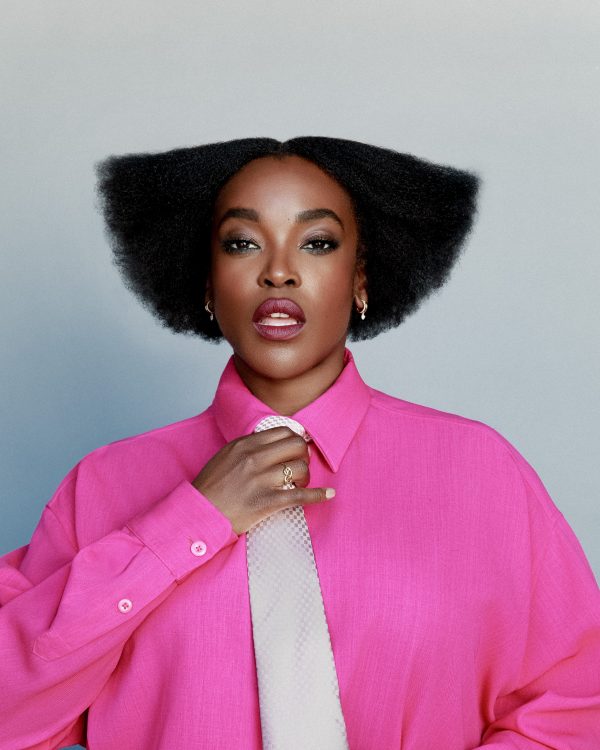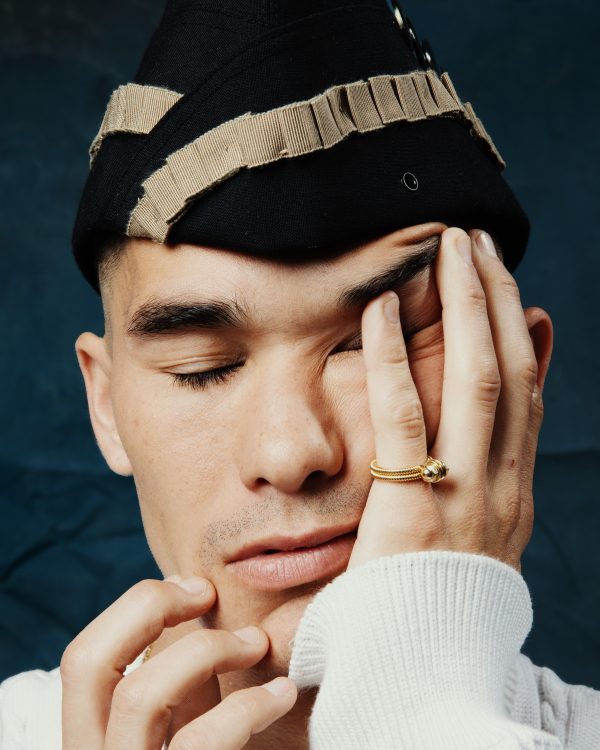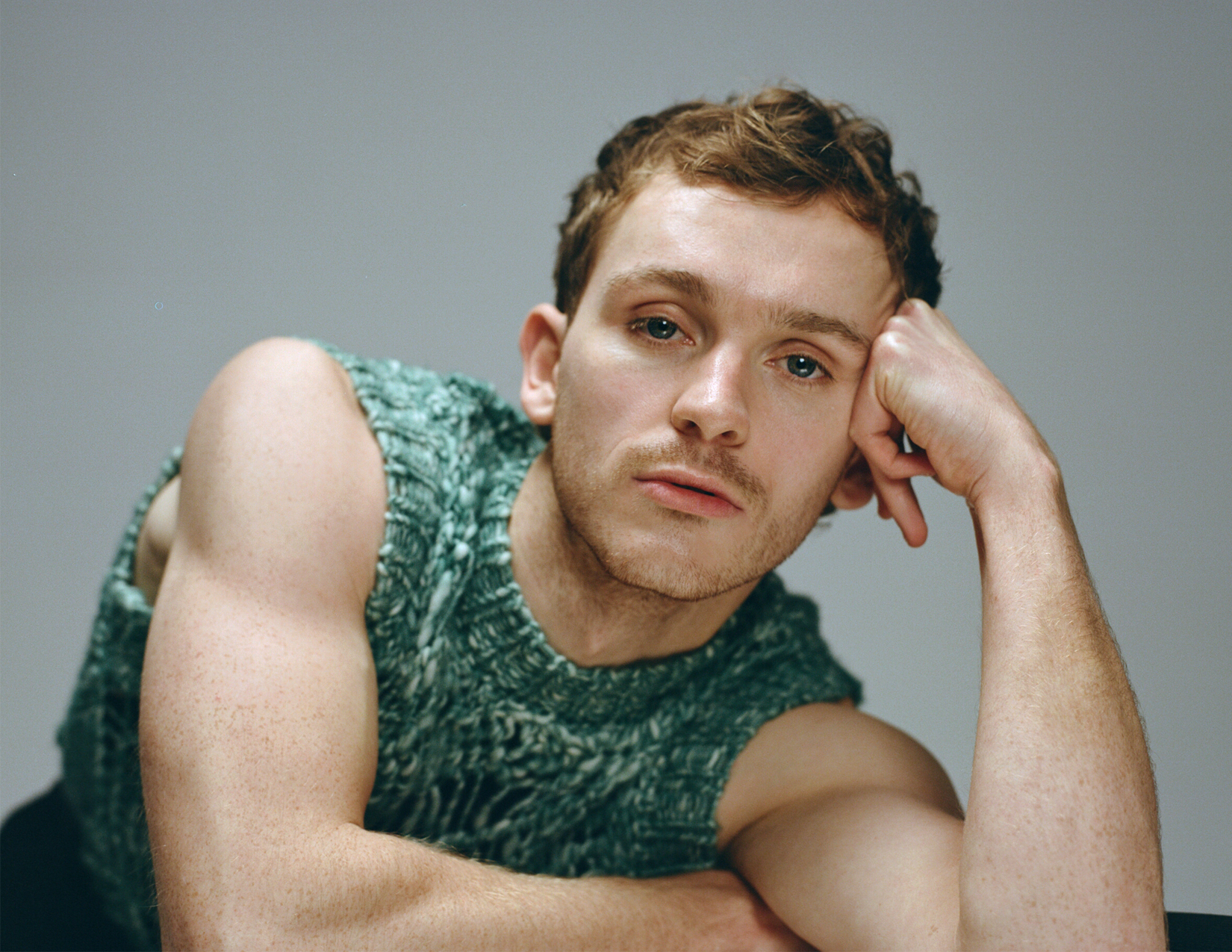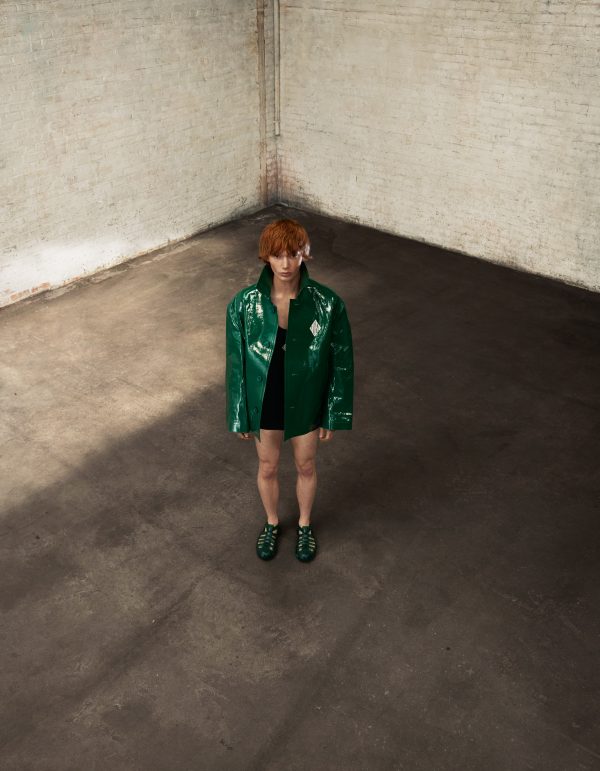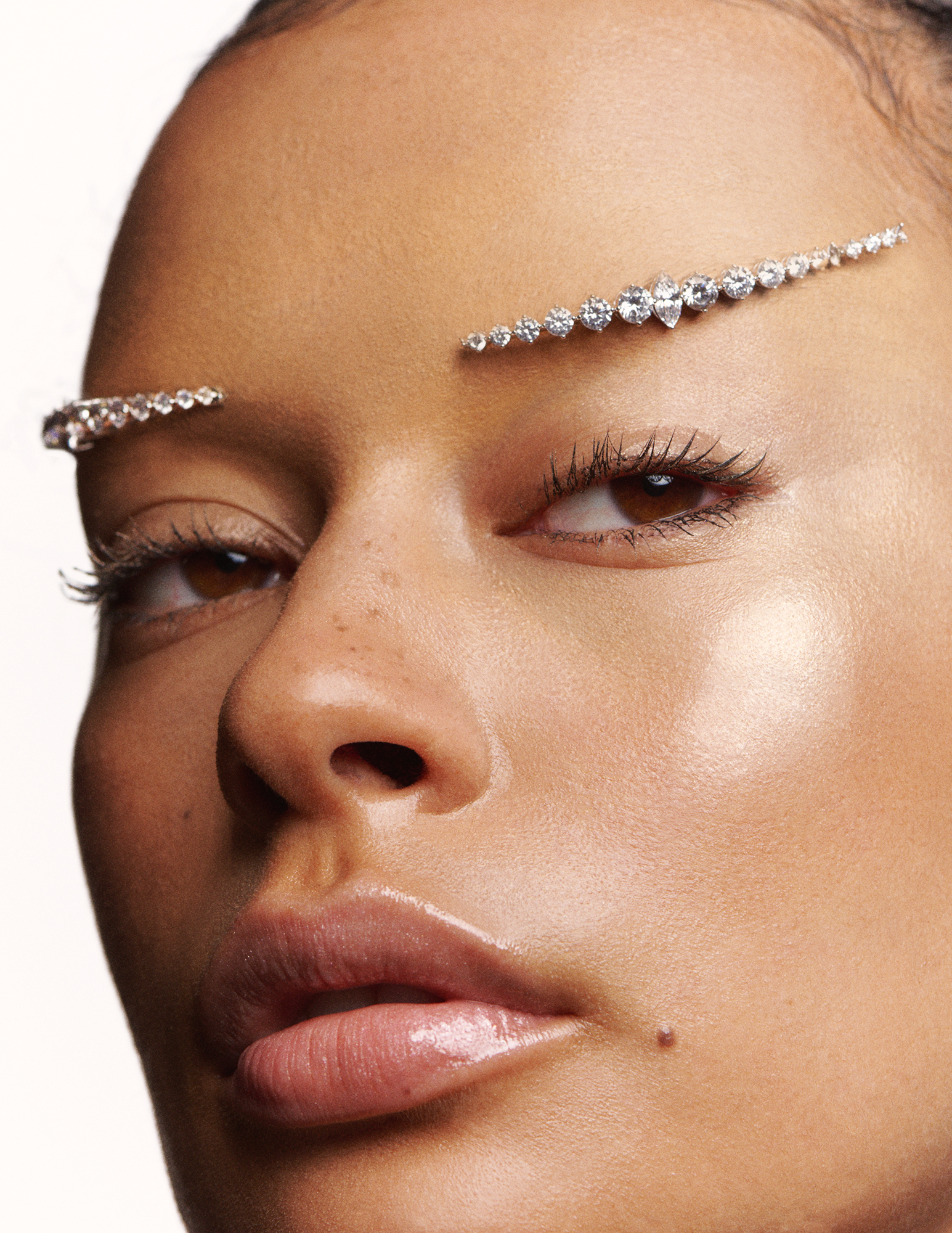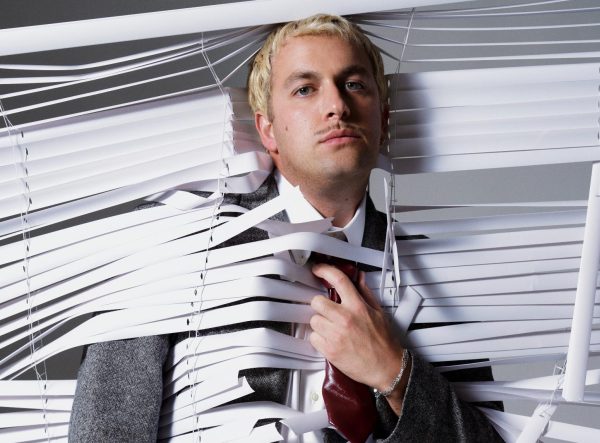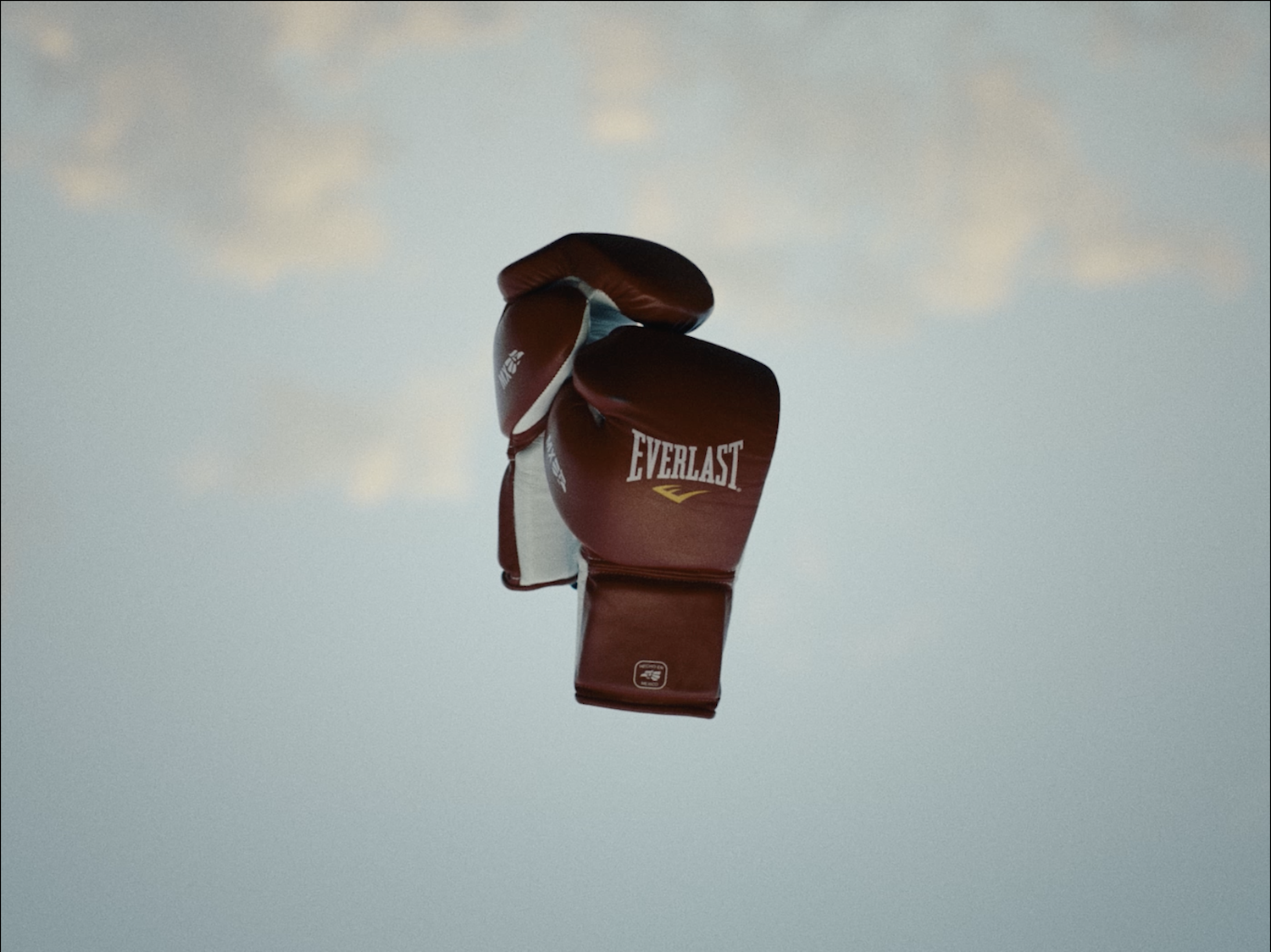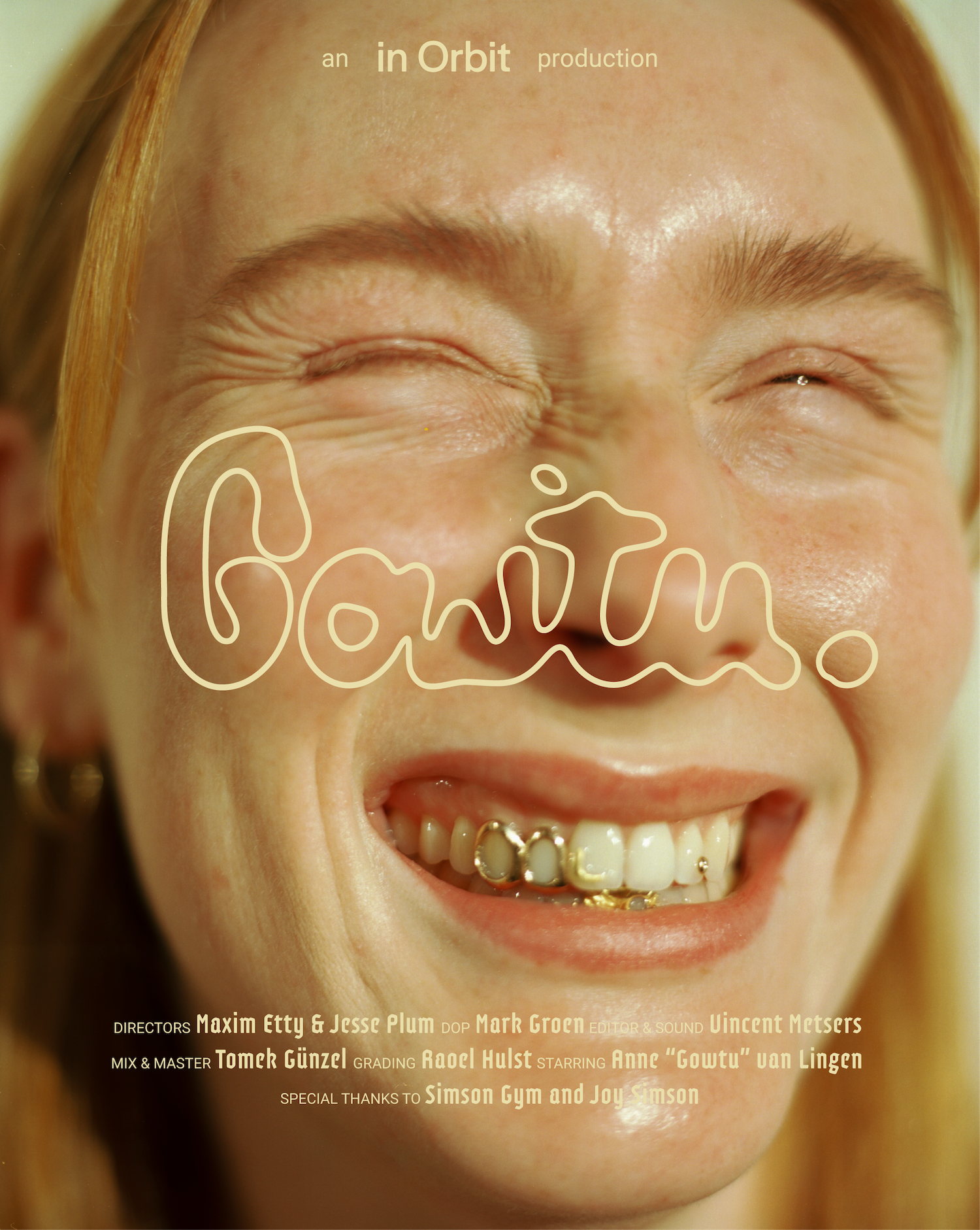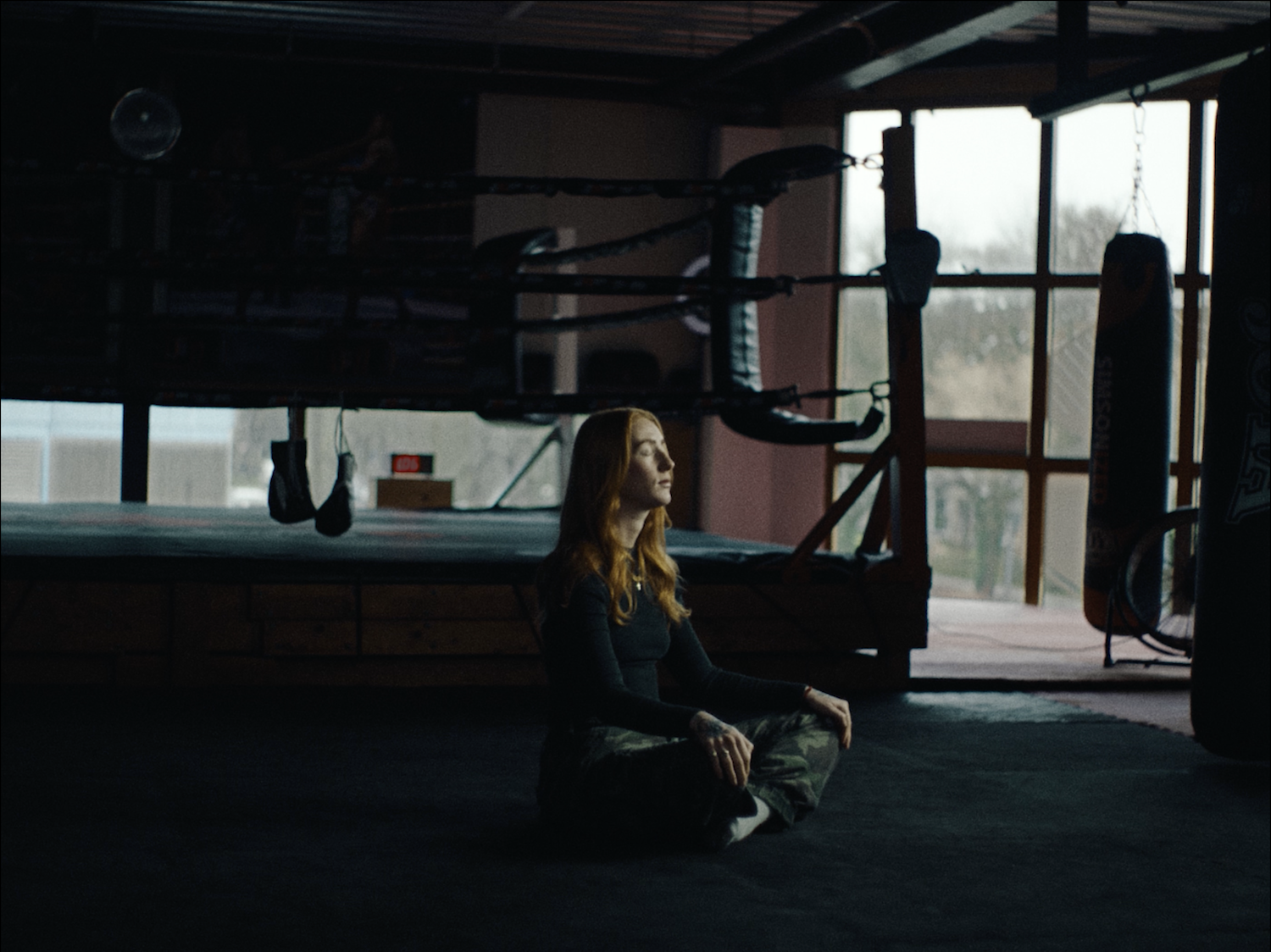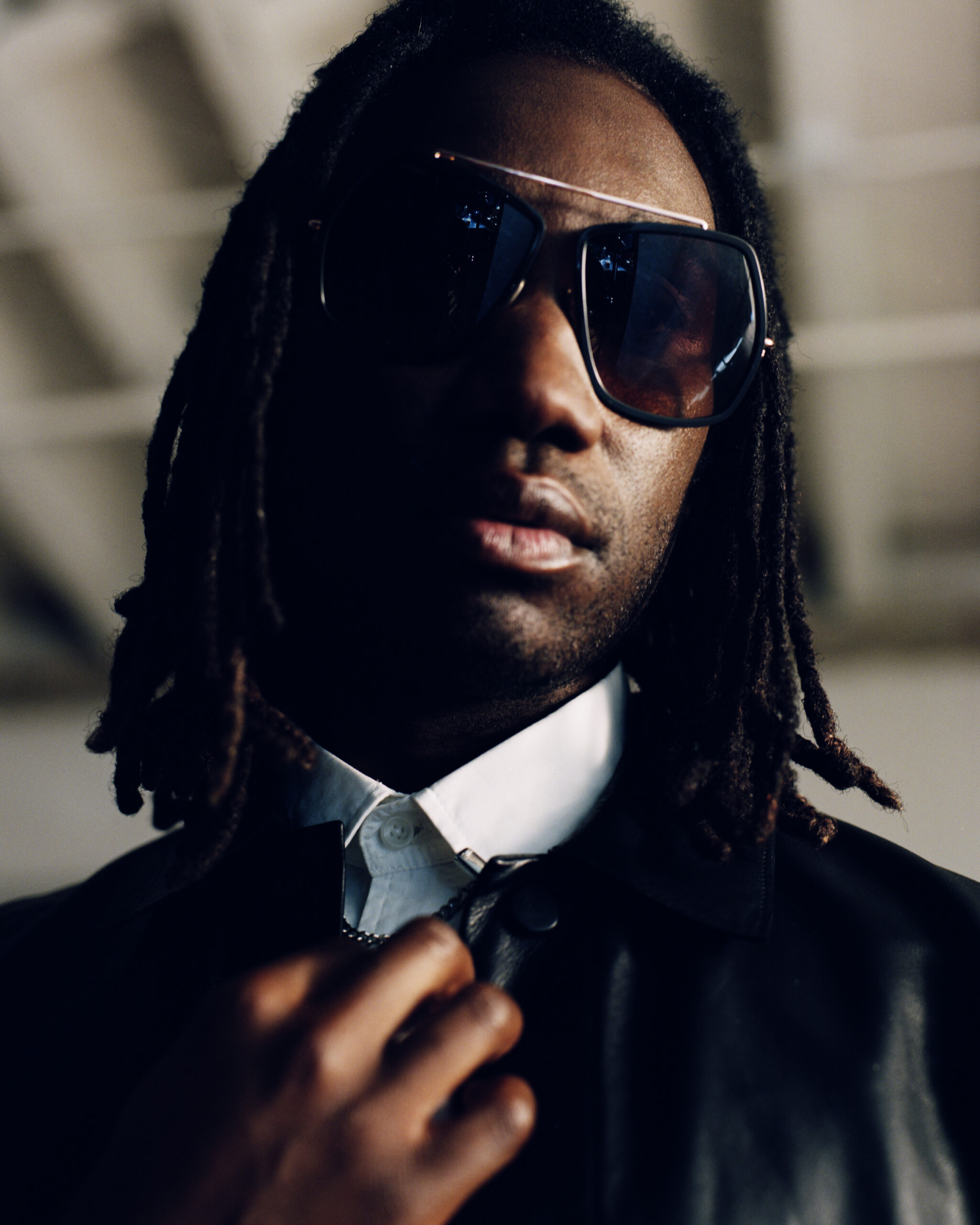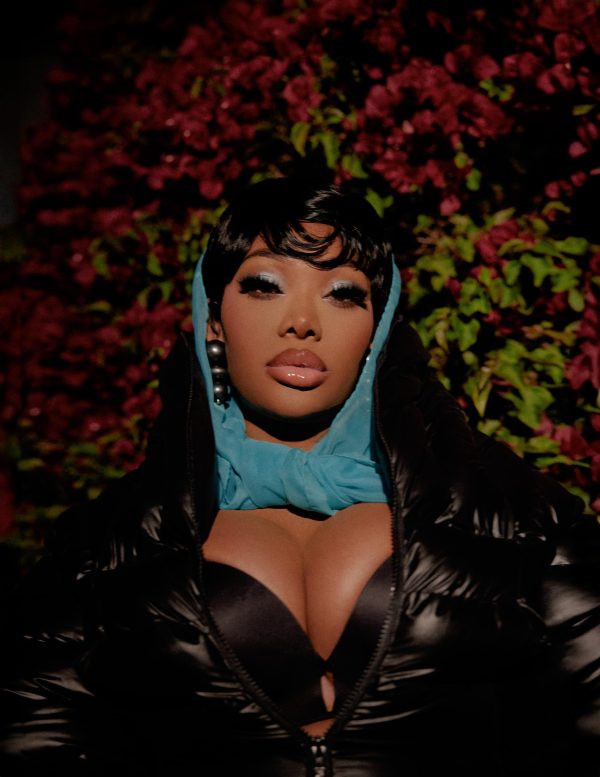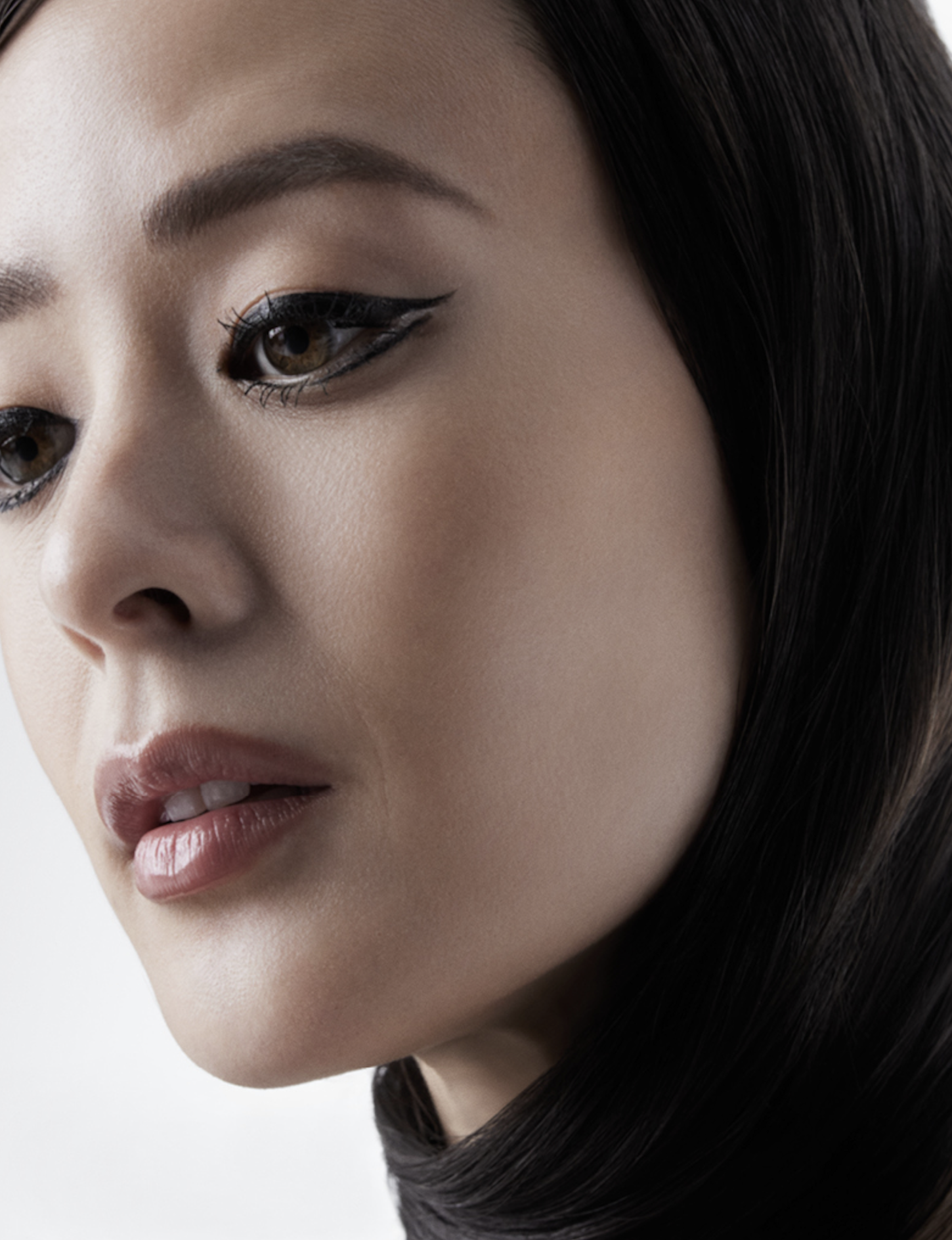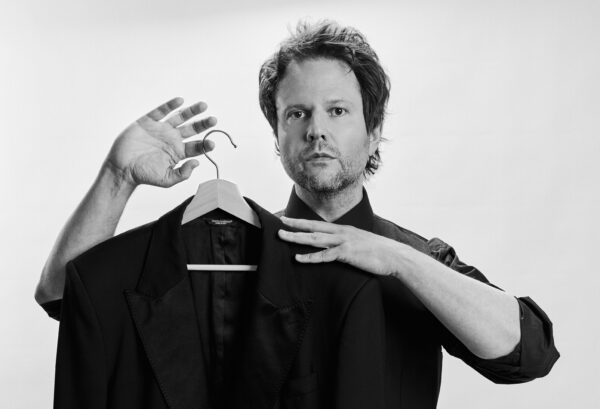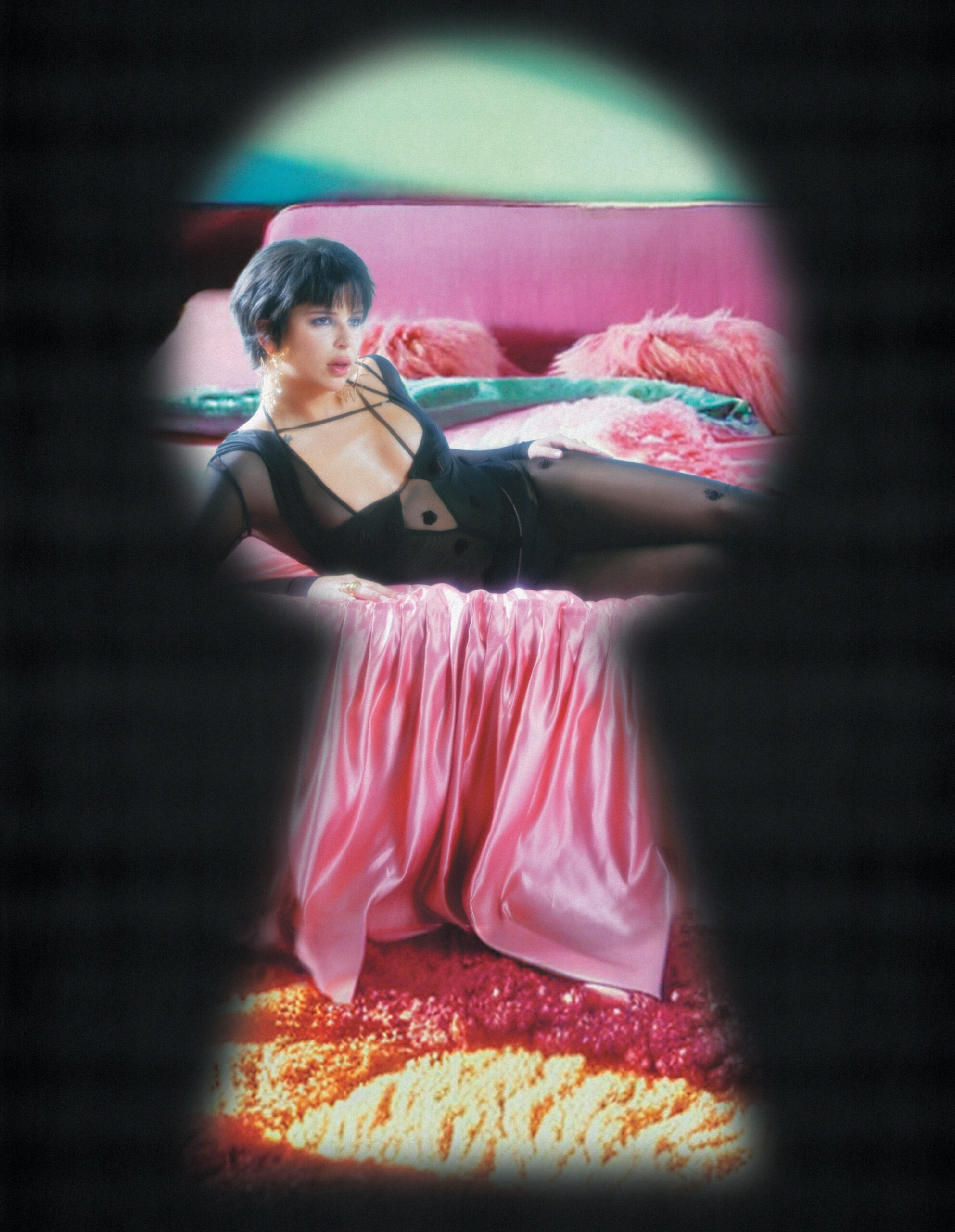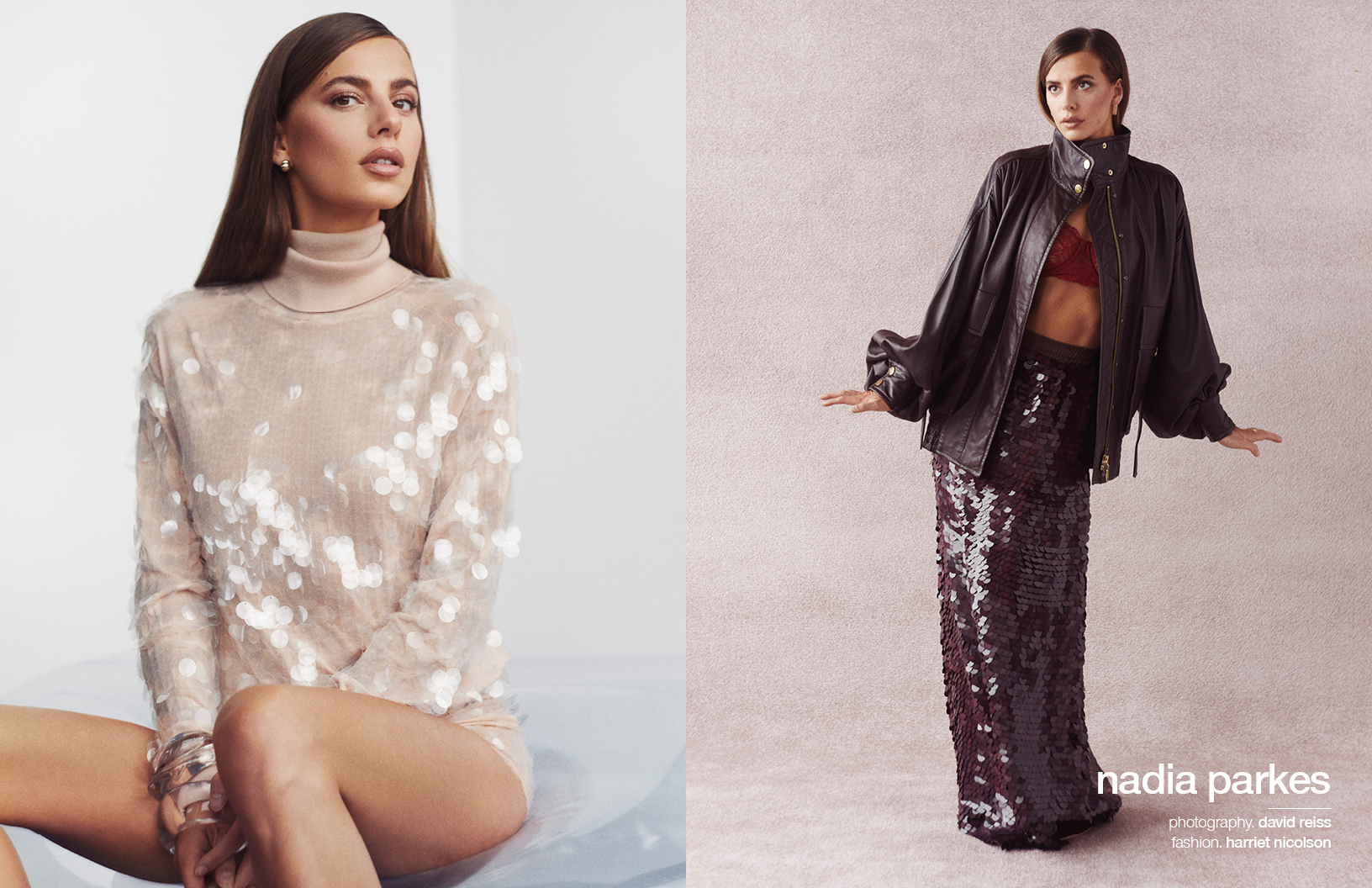
top + shorts. Ermanno Scervino
earrings. Mejuri
bracelets. Alexis Bittar
opposite
jacket + skirt. Zimmermann
shoes. Malone Souliers
earrings + ring. Cartier
bra. Dora Larsen
For her first time leading an entire series, Nadia Parkes blows us all away. Kidnapped tells the true story of Chloe Ayling, a British glamour model who was kidnapped in Milan, Italy when she went out on a modelling gig in 2017. The series follows Ayling (played by Parkes) as she navigates through the aftermath of the kidnapping – the ridicule she faced from the British public, and how she coped to survive. What the six-episode series does so well is highlight that not every situation is black or white. The relationship Ayling forms with her kidnapper ‘M.D’ (played by Julian Swiezewski) is complicated and nuanced, causing us the audience to question: how far would you go to live another day?
Parkes performance leaves us empathetic, infuriated, and downright angry at the way Ayling was dissected by the Italian police and upon her return to the U.K. Ridiculed, mocked, and questioned, she takes us through a whole plethora of emotions. From joy and fear to betrayal, and with glimmers of happiness in between the darkness, Parkes bears it all for us, putting herself through the wringer to do the story justice and give it the spotlight it deserves. A force to be reckoned with, Nadia Parkes is just getting started.
In conversation with Schön! Magazine, Nadia Parkes discusses Kidnapped, meeting the real Chloe Ayling, leading a series for the first time, how she felt supported on set, finding levity despite the material, stepping behind the camera on Salt, what the future may hold, and much more!
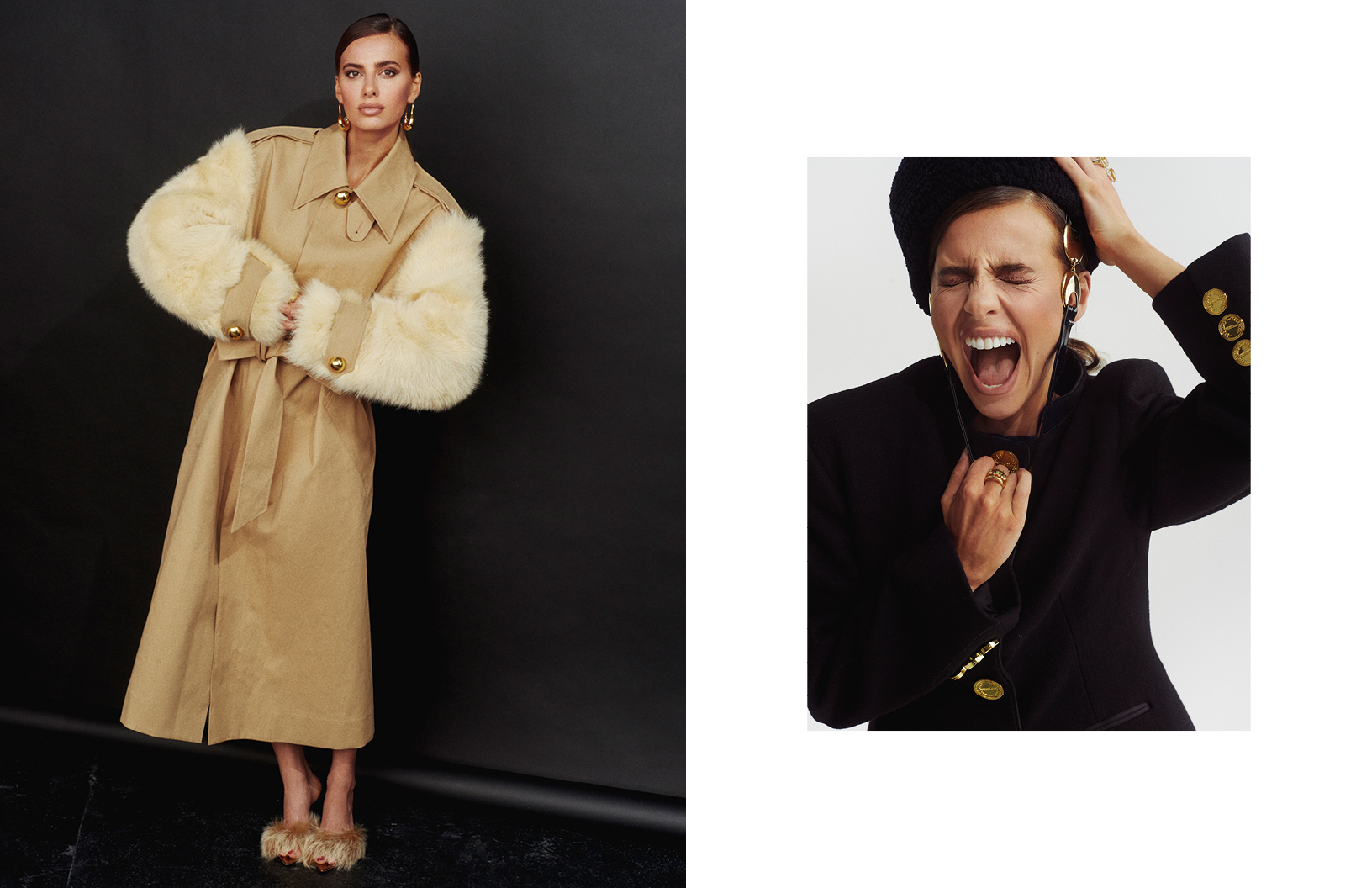
trench coat. Ami Paris
shoes. Gianvito Rossi
earrings + ring. Mam Originals
opposite
jacket. Keburia
hat. Rafa Peinador
rings. Phillipa Herbert
I watched the entirety of Kidnapped last night in one go for the second time because I was completely enthralled by Chloe Ayling’s story. What aspects of her story captivated you when you got the role?
Oh, there was so much that drew me in. I had a vague idea of the headlines at the time, but I never took the time to investigate the story behind it. So, reading the script and then having that moment of, “Oh, I vaguely remember this.” I was so drawn into, “Why this story? Why this person? Why now as well?” The more I started to research, and the more I moved through the audition process, I was so drawn to the actual happenings of it. It was a completely unusual story. It’s not conventional. The aspect that I was really drawn to was the media intrusion side of it — the way that played out and the way that society reacted to what happened to Chloe. I think society, and media in general, like things to be so black and white, but that’s not how life is. There’s more nuance. And unless you’ve been in that situation yourself, you shouldn’t judge.
Agreed. One of the things I admired most about Chloe in the series was her ability to keep her cool. She used Lukasz’s infatuation to her advantage. Can you talk about delving into the complexities of the abuser-victim dynamic, and why it was so important to portray that on screen?
It was an intricate thing because it was so nuanced. Chloe was so brave and so vulnerable with me and the people putting together this show. She was open about what that relationship was. But again, even with all that openness and that vulnerability, I think it is one of those things that unless you are totally in that position, you’ll never fully understand it. We did our best to try and portray it as accurately as we could because she didn’t know if she was going to survive. I don’t think it was a cunning plan. He would present her with a new piece of information that she was digesting and dealing with. It was an incredibly brave and honest reaction. When she got wind of the fact that Lukasz might have affection toward her, she played along to survive, to be able to get back to her family, to be able to keep living on this earth. I was lucky that I had Julian (Swiezewski) playing Lukasz because it’s such a sinister role and it’s such a serious topic, but he brought so much light and joy to the set. When he was having conversations with you and then someone would say action and he would just turn on every single nuance of this character. I felt very supported by him going through that.
I read that Chloe gave the series her blessing, and you were fortunate enough to chat with her. I know you didn’t really ask her about the kidnapping itself too much, but what were you hoping to gain or to take from the conversations that you had with her?
Since Chloe’s so strong, she often talks about what happened to her on quite a factual level. She opened up to me and said that was her way of dealing with it and coping with it. When I engaged in these conversations, I was excited and wanted to gain insight into the emotional levels. I wanted to know, “When you were sitting on that Good Morning Britain couch, when you were walking through the village, what were you feeling? How much was your heart racing? Were you engaged with what was going on? Or in order to cope and survive, have you kind of completely disassociated?” That was my job as an actor to bring emotional levels to all of the events. The more I could gain on that, the better. Also, I just wanted to get to know Chloe. It allowed me to be able to play her authentically. I loved finding out what music she listened to, where she does her shopping, finding out what her favourite cocktail is and things like that, because it helped me feel like I had a rounded approach to the character.
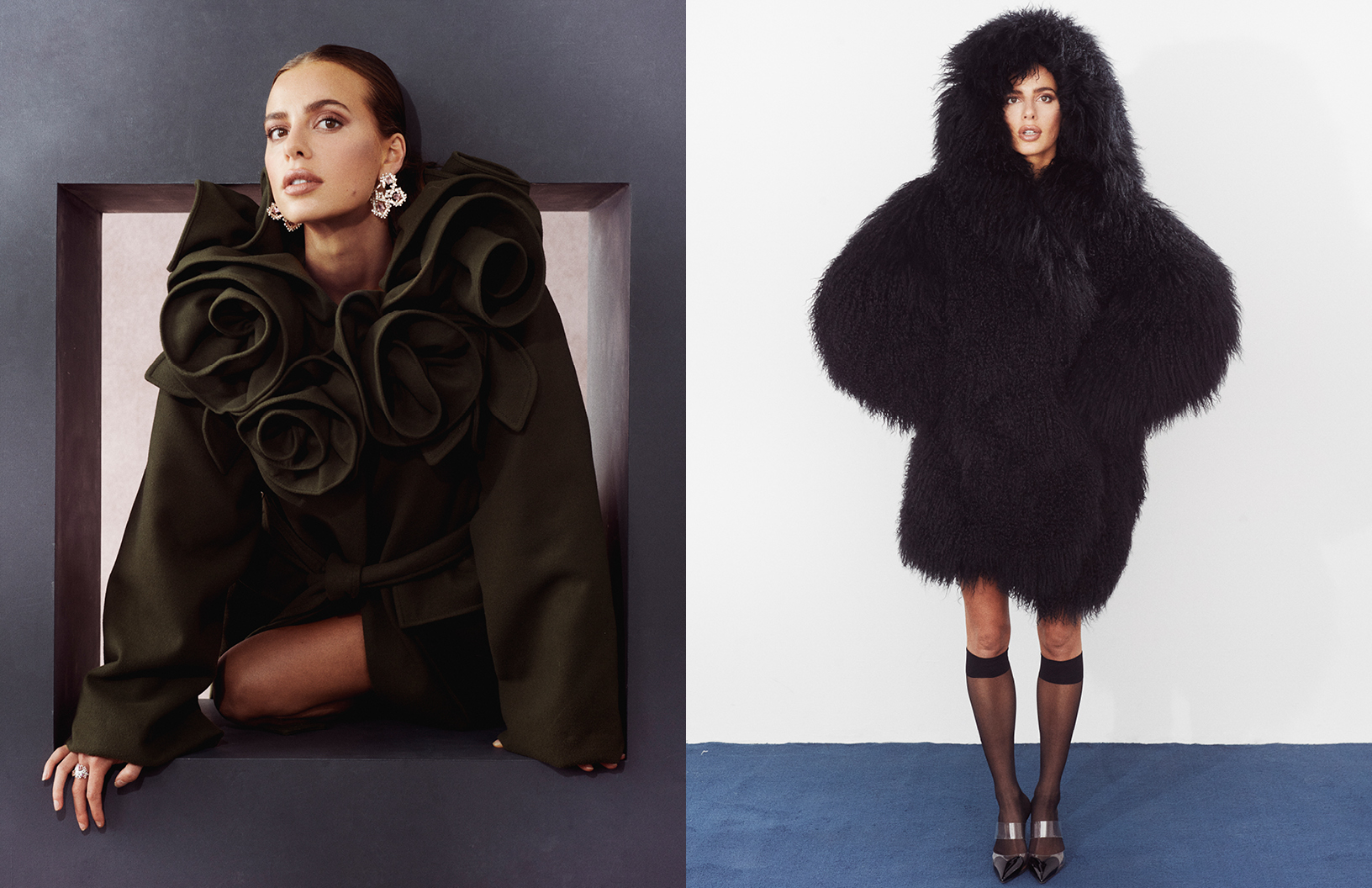
coat. Elie Saab
earrings + ring. Ananya
opposite
jacket. Michael Kors Collection
shoes. Alaïa
earrings. L’Atelier Nawbar
socks. Calzedonia
In terms of the research aspect, there are interviews out there – that Piers Morgan one was quite infuriating to watch. How hard was it for you to connect to that emotional state? Because you’re dealing with some really heavy material, how do you shed that?
It’s really hard. It’s no easy task. I recently had a therapy session where the therapist was talking to me about the science of the brain. He said when acting your brain has no idea if it’s imaginary or real. I had this moment where I thought, “Oh, wow.” One of the ways that I approach acting is I like to speak the character’s thoughts. So, my character feels like she’s about to die, or that everyone hates her, you’re going to ingest those feelings as an actor. It’s so important that you have the right people around you. I was really supported by this job which is so lovely. You put in the work in the same way you put in the work to get into character. You take in all those thoughts and those mannerisms and that voice. I’m learning along my process that the same amount of work that goes in, you have to put in the same amount of work to come out of it and get back to Nadia. I think I did go somewhere else for this job. I kind of disappeared for a while. It’s just awful to think that someone is living this right now, and actually went through that for real.
Moving away from Kidnapped for a moment, you were nominated for Best Performer in The House Party congratulations on that. What did that mean to you when you found out?
Oh, thanks for asking that. It was so lovely. I cried a lot. I froze because I was so happy. It was such a special time. Stepping on stage for the first time professionally and in that role just felt so divine. I didn’t know it could be marked as a thing in my life even more than it was. I didn’t know that it could feel even more memorable or feel even more formative or important. Then to be nominated for an award for it, I didn’t know that was possible. It kind of solidified how perfect, magical and formative it was. I felt like the whole experience was very validating. It was a stage debut to remember, it was so special.
You said in a caption on Instagram that filming Kidnapped was special and a challenging time and that the people behind it created the most gorgeous atmosphere of love and support. Can you elaborate on your time on set and how you found levity in between filming?
I had lovely, amazing people around me. Al Mackay (director) and I had a collaborative relationship where he involved me in conversations, which maybe, maybe actors would sometimes get left out of. But because it was Chloe’s story, and I was the only person playing Chloe, they involved me in all of these conversations around things like costume, or even just how I would shoot a scene. He knew it was emotionally taxing on me, and he would say, “Would you like your close up coverage first?” Sometimes, more often than not, that is not a choice that actors get, because it’s at the liberty of everything else. I was lucky enough to get a choice in some of those things.
I had the most gentle and wonderful makeup artist who held space for me to just sit in the chair, and we’d cry together, and then we’d giggle together. She knew that sometimes I needed to let everything out. She was just in it. Then, other times, we put on some music, like a 90s banger and dance around as if we were in a club on our lunch break [laughter] It would change day to day the ways we’d find levity. Other times I wouldn’t find that much levity because I needed to stay in it. The levity would come at the end of the day when I was actually on my own and having a shower and watching Love Island or something like that to completely switch off.
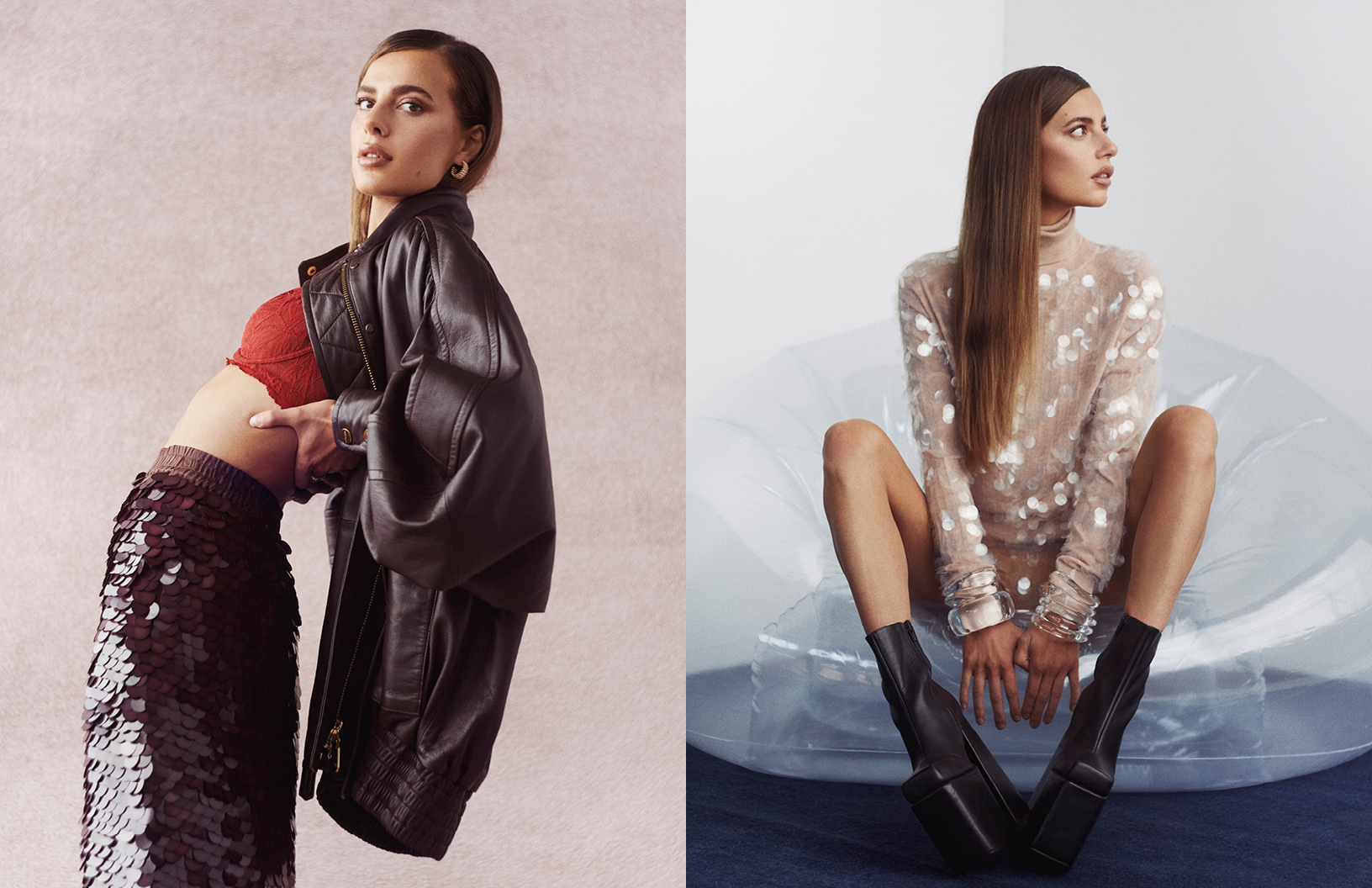
jacket + skirt. Zimmermann
shoes. Malone Souliers
earrings + ring. Cartier
bra. Dora Larsen
opposite
top + shorts. Ermanno Scervino
boots. Roker
earrings. Mejuri
bracelets. Alexis Bittar
I saw that you occasionally write poetry. Did you write any while doing Kidnapped as a way of coping or decompressing?
I think I was writing alongside it. I don’t ever sit down to write poems. I let them happen, but none stick out specifically from that time. I also think I was so immersed. I don’t think any poetry came out of me because every ounce of my artistry was being thrown into disappearing into this other person. When I came out the other end of it, there was a period where it was gushing. For a solid two months, it was the most poetry I’d ever written. There was a need to rid myself of quite a lot of the emotions that were sitting on me. I don’t date my poetry because I don’t want anyone to be able to ever track me back to a time, but I will be releasing some from that time. I have a lot of poetry that has a lot of lightness and hope and light in it. But then some poetry’s a little bit darker and I think that’s the scary stuff to share because that feels the most vulnerable. That feels like the stuff that you always want to hide from the world because you’re ashamed of it or you don’t want people to see it. Actually, that is probably the most powerful stuff that people need to see more of, the most relatable and the most honest.
Turning back to Kidnapped, what is something you learned about yourself while playing Chloe?
That’s such a good question. I learned so much. On a practical level, I learned that I could lead and carry a show, which was an amazing realisation and one I didn’t know I could do. I think learning to act on that practical level is something I can do and actually something that fuels me. Do you know how people say they have social batteries? Some people go out with a charged battery, and then by the end of the night, their battery is depleted, because they’ve used all their energy on social interactions and others go out and the social interactions charge them. Well, I realised that with acting I’m charged and fuelled by the more it requires of me. It doesn’t drain me; it gives me more juice, more zest [laughs].
I’m a big overthinker. I found a lot of freedom in not being able to overthink a scene because I’ve got another one to do. When that one’s done, I’ve got another one to do. If you put me on set and just give me a few scenes… That’s harder. Even though it’s less time on camera, and probably fewer lines to learn, and all the things that go with it. I don’t see that as an easy day. I see that as a harder day because it’s time to overthink and beat myself up. I like to be in the process of doing so that I can’t overthink things.
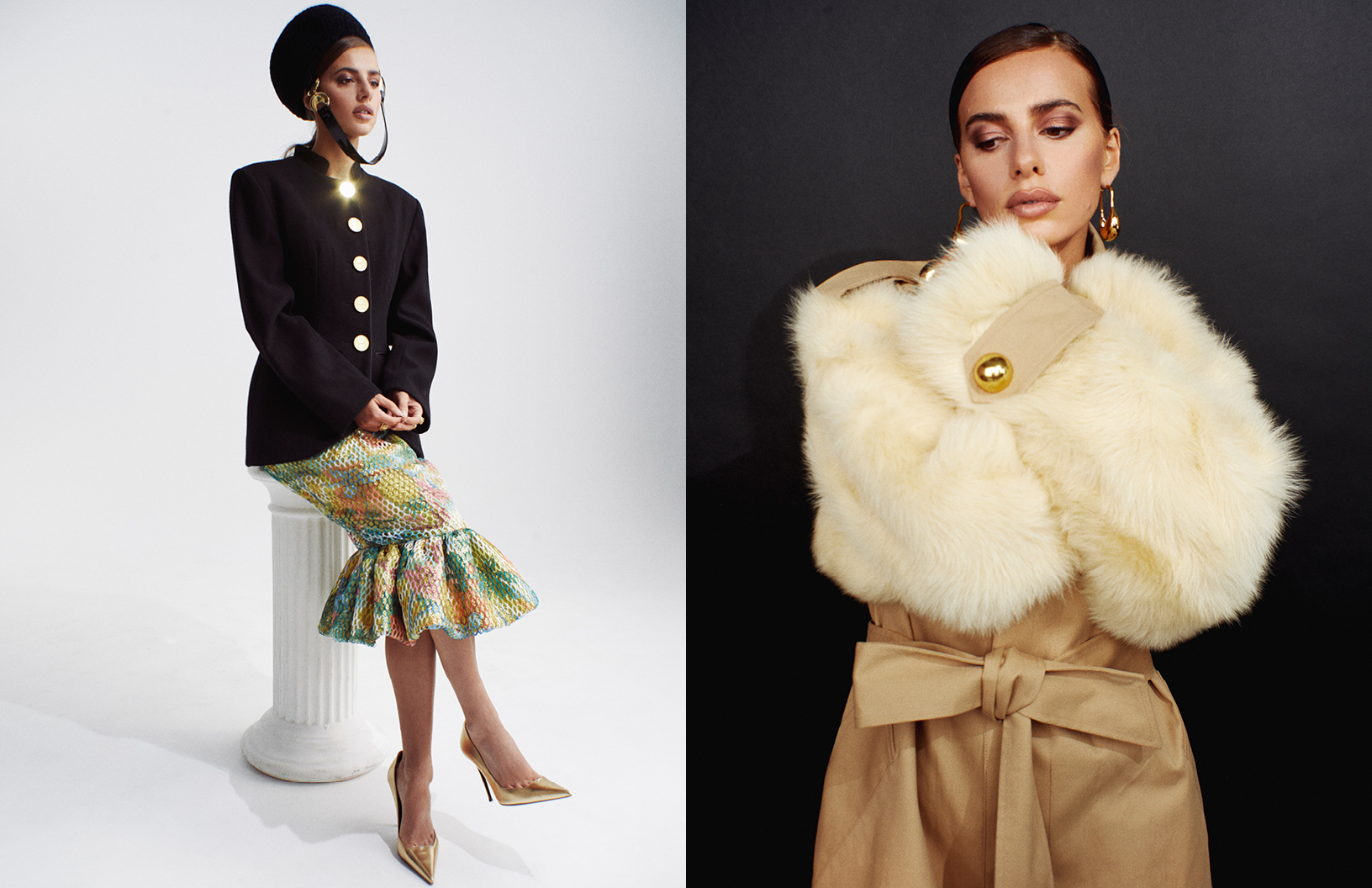
jacket + skirt. Keburia
shoes. Giuseppe Zanotti
hat. Rafa Peinador
rings. Phillipa Herbert
opposite
trench coat. Ami Paris
earrings + ring. Mam Originals
Another thing that stuck out to me in the series was how quickly the public turned. You touched on that earlier, and especially how Amber was so fast to sell Chloe’s story. Even with all the evidence, people still questioned her innocence. What was the most infuriating thing about the case for you?
I think the infuriating thing there is that Chloe was feeling so unsafe in so many ways in her life. She had only just learned the Black Death wasn’t real. She was struggling to even believe that. She didn’t feel physically safe or safe in public. I think the most infuriating thing is that the people closest to her who are meant to provide that element of safety couldn’t and didn’t even do that. That would make anyone retreat and hide away and not feel like they can trust anyone. I didn’t ask her about that. If it was me, it would take me a lot of years to build up that trust, again, with people who are meant to be there for you and support you. I hope that it wasn’t too long until she could gain back that level of trust.
What is your hope for audiences watching the series who aren’t familiar with her story?
The good thing about this story is even though it’s not globally well-known it relates to more than just this story. I think we as a society need to make more space for women. We need to hold space for them to speak up and speak out about any form of violence against women. I just hope it makes people aware of the way we’re so quick to judge.
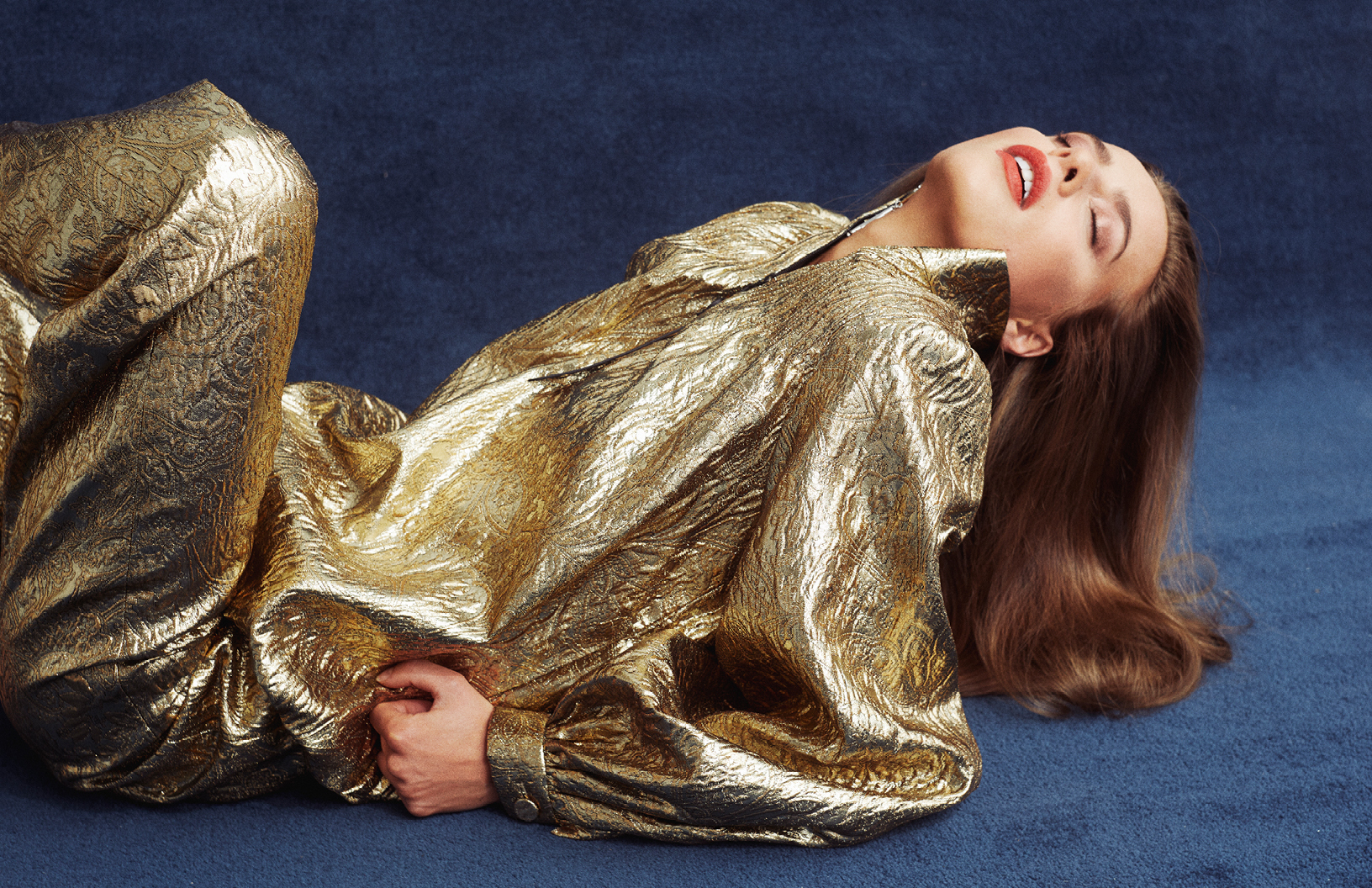
top, trousers + earrings. Louis Vuitton
And lastly, what’s next for you? Looking at IMDB and Instagram there’s a short film called Salt that got picked up at La Femme?
Yes, that’s being screened at La Femme. I’m actually on two different things right now. I’m on a BBC drama called Inspector Lindley and a working title film, which is a lovely thing to do. Two very different genres, which are a lot, but nice. There’s a lot more in the pipeline and stuff, but annoyingly, I can’t talk about them yet [laughter].
That’s fair enough. Just one more thing about Salt. I noticed that you’re the executive producer on that. What was it like to step behind the camera?
I’ve actually written my own short that I am hoping to direct at some point in the near future. I’m very, very interested in stepping behind the camera because I think both in front and behind can help each other. If I was to go and direct, when I stepped back to acting, I would be a better actor. I’ll have an understanding of what’s going on for the actors and stuff like that. I love stories. I just love storytelling, and I love filmmaking. I think my life will always encompass that. I’m interested in exploring the other avenues in which that can happen. I’m very visual. When I have an idea, I sometimes think that I approach my acting in a directorial way. That’s probably about a two-hour conversation [laughs]. Seriously, talking about the craft and being all nerdy. I’d love to own a production company and just create films that are really inspiring and a place where important stories get told by incredible filmmakers.
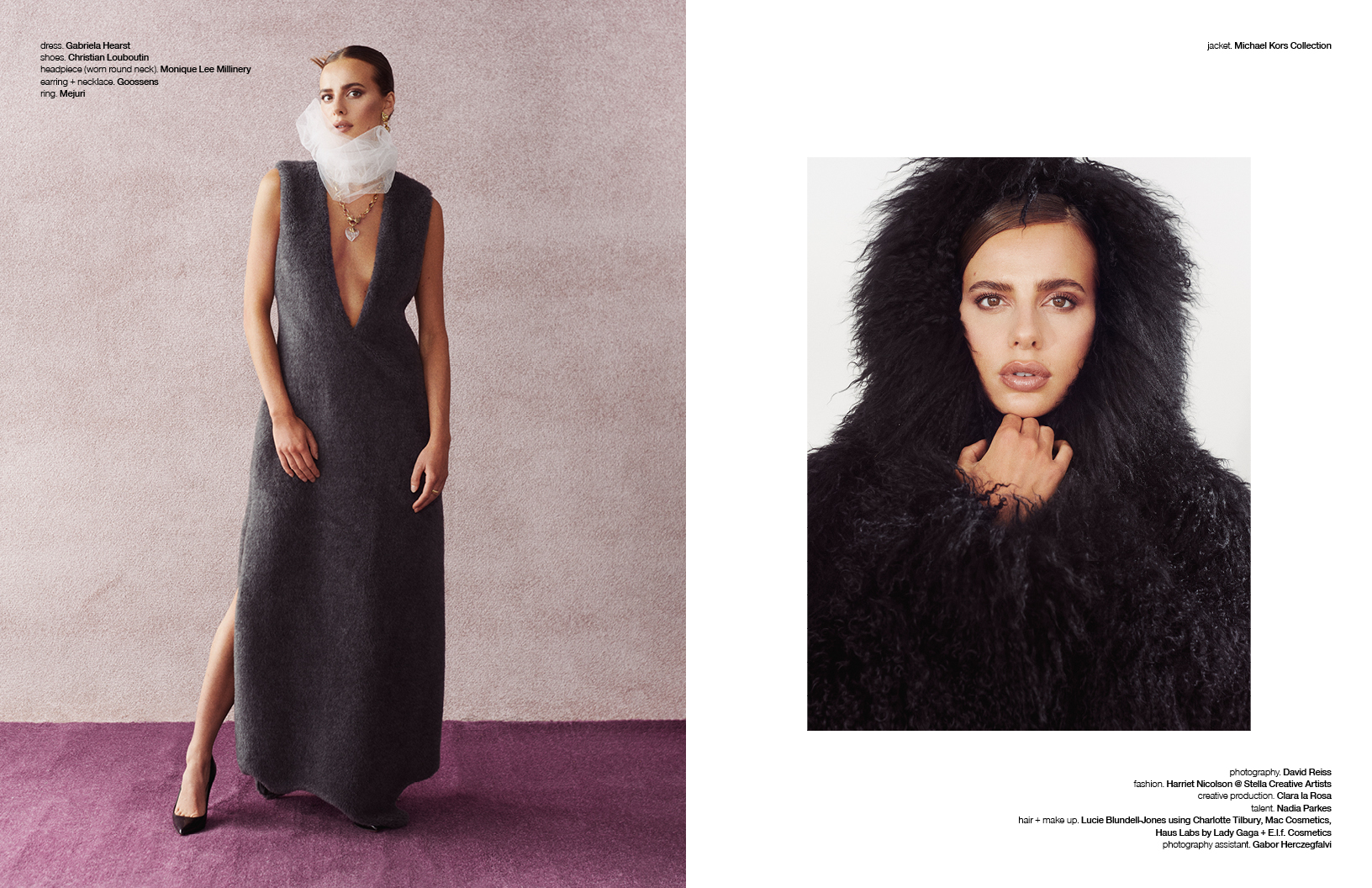
dress. Gabriela Hearst
shoes. Christian Louboutin
headpiece (worn round neck). Monique Lee Millinery
earring + necklace. Goossens
ring. Mejuri
opposite
jacket. Michael Kors Collection
Kidnapped is streaming now on BBCiPlayer.
photography. David Reiss
fashion. Harriet Nicolson @ Stella Creative Artists
creative production. Clara la Rosa
talent. Nadia Parkes
hair + make up. Lucie Blundell-Jones using Charlotte Tilbury, Mac Cosmetics, Haus Labs by Lady Gaga + E.l.f. Cosmetics
photography assistant. Gabor Herczegfalvi
interview. Dana E. Reboe






